|




 In May of 2002, the Florida Legislature passed a new statute defining fire safety standards for high-rise buildings. At the next scheduled annual fire inspection of your building, you will be officially notified about the necessity of installing a Full Sprinkler System or establishing an acceptable Engineered Life Safety System as an alternative! Your building will have to pony up between $15,000-$25,000 to a "Fire Safety" engineering firm to compose an acceptable plan that will meet the statutory requisites. A second expense is the actual cost (roughly $800,000 - $3,200,000 - depending on several factors) of implementing the approved plan within the next 11 years. Ouch! Is this life saving legislation or an ill-conceived pork barrel project dumped on us in the dead of night? What follows is a chronological history of this issue starting in the Spring of 2002 through the present. In May of 2002, the Florida Legislature passed a new statute defining fire safety standards for high-rise buildings. At the next scheduled annual fire inspection of your building, you will be officially notified about the necessity of installing a Full Sprinkler System or establishing an acceptable Engineered Life Safety System as an alternative! Your building will have to pony up between $15,000-$25,000 to a "Fire Safety" engineering firm to compose an acceptable plan that will meet the statutory requisites. A second expense is the actual cost (roughly $800,000 - $3,200,000 - depending on several factors) of implementing the approved plan within the next 11 years. Ouch! Is this life saving legislation or an ill-conceived pork barrel project dumped on us in the dead of night? What follows is a chronological history of this issue starting in the Spring of 2002 through the present.
Fire Safety Plan
 The 2002 Florida Legislature passed a new statute that redefined fire safety standards applicable to high-rise buildings. When a high-rise condominium or cooperative undergoes its next scheduled annual fire inspection, the association will be officially notified about the necessity for installing a Full Sprinkler System or establishing an acceptable Engineered Life Safety System as an alternative! This brief summary will add some perspective to the issues and enumerate the players. The 2002 Florida Legislature passed a new statute that redefined fire safety standards applicable to high-rise buildings. When a high-rise condominium or cooperative undergoes its next scheduled annual fire inspection, the association will be officially notified about the necessity for installing a Full Sprinkler System or establishing an acceptable Engineered Life Safety System as an alternative! This brief summary will add some perspective to the issues and enumerate the players.
 | Former Fort Lauderdale Fire
Marshal Steve Kastner |
Our former local Fire Marshal, Steve Kastner, convened a meeting on July 10, 2002 at the Galt Mile Community Center in an effort to quell some of the confusion surrounding this enigmatic mandate. The legislation itself was a mixture of the existing Florida Fire Prevention Code inherent to the Fire Prevention and Control (Title XXXVII, Chapter 633) section of the Florida State Statutes, the Florida Administrative Code Chapter 4A60, and certain NGO (non-governmental organization) engineered Life Safety and Fire Safety codes. Strangely enough, self-serving provisions drafted by Sprinkler Associations and the Plumbers and Pipefitters Union were melded into the mandate. The legitimate NGO involved was the NFPA (National Fire Protection Association) and the adopted codes were NFPA 101 (Life Safety Code) and NFPA 1 (Fire Safety Code). The NFPA is an organization that creates and updates regulatory codes and markets them to legislative organs that do not have the expertise, the resources, or the inclination to develop their own. In contrast, Sprinkler Associations are industry trade organizations dedicated to enriching its corporate membership. The part of the statute that compels our interest is the section that addresses �Hi-Rise Buildings�. The statutory definition of a High-Rise Building is structure that is at least 75 feet high. A total of 60 buildings in Fort Lauderdale fit this description including all of our Association members. Statewide, thousands of associations would be forced to comply with the Sprinkler Statute.
 The exceptions to the mandate to install a Full Sprinkler System apply to buildings that either 1) provide exterior access to every dwelling (connected balconies or catwalks that ultimately outlet to the street) or 2) have an approved Engineered Life Safety System. While several of our members �dodged the bullet� in that their buildings include exterior access, the majority of Association buildings faced installing the alternative Engineered Life Safety System to satisfy the statute. While less onerous than the full sprinkler retrofit, the alternative was also a significant fiscal hardship. The exceptions to the mandate to install a Full Sprinkler System apply to buildings that either 1) provide exterior access to every dwelling (connected balconies or catwalks that ultimately outlet to the street) or 2) have an approved Engineered Life Safety System. While several of our members �dodged the bullet� in that their buildings include exterior access, the majority of Association buildings faced installing the alternative Engineered Life Safety System to satisfy the statute. While less onerous than the full sprinkler retrofit, the alternative was also a significant fiscal hardship.
 By definition, this Engineered Life Safety System was formulated to provide a level of protection equal to or better than a full sprinkler system. It consisted of 3 integral components. Partial automatic sprinkler protection in certain common areas and one sprinkler head through the front door into each dwelling unit was requisite. Unless already installed, buildings needed to retrofit an integrated smoke detection and alarm system. Lastly, a system of approved compartmentation (fire rated doors, fire rated walls, etc.) was warranted to help restrict a fire from spreading. The building systems impacted by these requirements (in addition to installing new standpipes, plumbing pipes and sprinkler heads) included the fire alarm system (smoke and sensor), the emergency generator, the fire pump, the elevator recall system, and any compartmentation upgrades required to mollify subsequent penetration (plug holes in certain walls, close off certain areas, upgrade fire ratings of certain doors, etc.) All told, the projected cost ranged from $1.2 million to $4 million, depending on the size of the structure, its existing fire safety features and the sizable expense of aesthetic renovation for any ceilings, walls and floors wherein the new plumbing elements were integrated. By definition, this Engineered Life Safety System was formulated to provide a level of protection equal to or better than a full sprinkler system. It consisted of 3 integral components. Partial automatic sprinkler protection in certain common areas and one sprinkler head through the front door into each dwelling unit was requisite. Unless already installed, buildings needed to retrofit an integrated smoke detection and alarm system. Lastly, a system of approved compartmentation (fire rated doors, fire rated walls, etc.) was warranted to help restrict a fire from spreading. The building systems impacted by these requirements (in addition to installing new standpipes, plumbing pipes and sprinkler heads) included the fire alarm system (smoke and sensor), the emergency generator, the fire pump, the elevator recall system, and any compartmentation upgrades required to mollify subsequent penetration (plug holes in certain walls, close off certain areas, upgrade fire ratings of certain doors, etc.) All told, the projected cost ranged from $1.2 million to $4 million, depending on the size of the structure, its existing fire safety features and the sizable expense of aesthetic renovation for any ceilings, walls and floors wherein the new plumbing elements were integrated.
 The notification process began immediately. All potentially affected buildings received a �courtesy notification� in the form of a letter from Steve Kastner, the former local Fire Marshal, to alert them to the ensuing requirements. Official notification was issued at the time of the annual fire inspection for each building. Upon being officially notified it was recommended to retain the services of a Fire Protection Engineer, evaluate the building, compare options (check with insurance carrier), and develop a report including a generalized plan of action. Each building had 180 days to respond to the notification by submitting an �Intent to Comply� letter. This letter needed to include Condominium Board of Directors approval, the name of the selected Fire Protection Engineer, the chosen method of compliance, a copy of the Engineered Life Safety Report, and a general compliance timeline. After the �Letter of Intent� was submitted, the jurisdictional authority had 60 days to respond. The notification process began immediately. All potentially affected buildings received a �courtesy notification� in the form of a letter from Steve Kastner, the former local Fire Marshal, to alert them to the ensuing requirements. Official notification was issued at the time of the annual fire inspection for each building. Upon being officially notified it was recommended to retain the services of a Fire Protection Engineer, evaluate the building, compare options (check with insurance carrier), and develop a report including a generalized plan of action. Each building had 180 days to respond to the notification by submitting an �Intent to Comply� letter. This letter needed to include Condominium Board of Directors approval, the name of the selected Fire Protection Engineer, the chosen method of compliance, a copy of the Engineered Life Safety Report, and a general compliance timeline. After the �Letter of Intent� was submitted, the jurisdictional authority had 60 days to respond.
 | | Former FL Fire Marshal Sink |
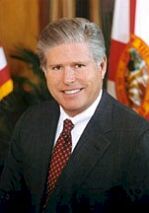 | | Former Fire Marshal Gallagher |
The actual compliance installation deadline for the original mandate was JANUARY 1, 2014 (12 Years From January 1, 2002). This was a county-wide process and the statutory requirements were state-wide. Former Fort Lauderdale Fire Marshal Steve Kastner stated that he realized that this presented an unforeseen burden to all of the affected Associations and promised his department�s cooperation and flexibility with regard to guidance and enforcement. He volunteered to address any Association to help clarify the requirements and their implementation. After examining the mandate's actual benefits and liabilities, reviewing its cloudy legislative background, exploring adverse insurance ramifications, uncovering a rat's nest of conflicting interests among the players and investigating our member Associations� alternatives, the Galt Mile Community Association decided to oppose the mandate and support the enactment of legislation to forgo the statute's onerous requirements. Particularly disturbing to the neighborhood association's Advisory Board was the fact that Florida's retrofit statute was the only one in the nation without an exemptive "Grandfather Clause" for existing associations that were fully compliant with State and local Fire Safety regulations.
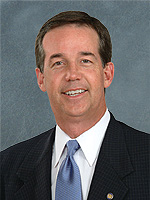 | | FL CFO & Fire Marshal Atwater |
The Fire Marshal distributed a data sheet containing the contact information of four recommended Fire Safety Engineering Firms. He emphasized the fact that a "Fire Protection Engineer" is a uniquely credentialed engineering specialty. The cost for this mandatory preliminary study was projected to incrementally add between $15,000 and $25,000 to any retrofit assessment.
 | Fort Lauderdale Fire
Marshal David Raines |
When sprinkler legislation for high-rise associations was initially enacted in 2002, the Florida State Fire Marshal was Tom Gallagher, who also served as State Treasurer. A few years later, he was replaced by Alex Sink. Six months after the 2010 sprinkler retrofit relief bill was signed into law, Jeffrey Atwater - our former District 25 State Senator - was elected as Florida's Chief Financial Officer. As Florida CFO, Atwater also serves as State Treasurer and State Fire Marshal. Closer to home, when the sprinkler statute was first passed, our local Fort Lauderdale Fire Marshal was Steve Kastner. When he took a similar position in another jurisdiction, his responsibilities in the Fort Lauderdale Fire Prevention Bureau were assumed by Fire Marshal David Raines, who was serving when the 2010 opt-out legislation was enacted into law. The address of the Fort Lauderdale Fire Prevention Bureau is 300 Northwest First Avenue, Fort Lauderdale, Florida 33301, Phone: (954) 828-6370.
Click To Top of Page
|
 |
|
Fire Safety Controversy Heats Up
- March 8, 2003 -
 The residents of the Galt Mile community are currently tolerating an exasperating and expensive ordeal that accompanies the massive renovation efforts required to bring their 20-30 year old buildings into the 21st century. Replacing the roof, waterproofing the building and the grounds, renovating the balconies, modernizing the elevators, resurfacing the driveway, rehabilitating the garage, performing an exhaustive list of structural repairs, painting the building, renovating the lobby, installing water towers, HVAC repairs, smoke and sensor upgrades, and hundreds of other expensive projects along with the necessary code upgrades that accompany each project has ravished the patience and the wallets of thousands of condo dwellers along the Galt Ocean Mile. The specter of another million-dollar project unceremoniously dumped on the top of this construction quagmire would have to be, at the very least, a clear and uncontested necessity. The residents of the Galt Mile community are currently tolerating an exasperating and expensive ordeal that accompanies the massive renovation efforts required to bring their 20-30 year old buildings into the 21st century. Replacing the roof, waterproofing the building and the grounds, renovating the balconies, modernizing the elevators, resurfacing the driveway, rehabilitating the garage, performing an exhaustive list of structural repairs, painting the building, renovating the lobby, installing water towers, HVAC repairs, smoke and sensor upgrades, and hundreds of other expensive projects along with the necessary code upgrades that accompany each project has ravished the patience and the wallets of thousands of condo dwellers along the Galt Ocean Mile. The specter of another million-dollar project unceremoniously dumped on the top of this construction quagmire would have to be, at the very least, a clear and uncontested necessity.
The Florida legislature�s midnight gift to residents of high-rise buildings throughout the state, the mandate to install a Full Sprinkler System or establish an acceptable Engineered Life Safety System as an alternative, leaves us with two issues that need to be addressed. The necessity and the price tag. The cost of statutory compliance in Broward County is on two levels. Within 180 days of your building�s annual fire inspection, you will have to pony up between $15,000-$25,000 to a �Fire Safety� engineering firm to compose an acceptable plan that will meet the statutory requisites. The second level is the actual cost (neighborhood of $800,000 - $1,200,000) of implementing the approved plan within the next 11 years. Ouch!
This is where some of the confusion starts. At a 7/10/2002 �Town Hall� style meeting convened at the Beach Community Center by our local Fire Marshal, Steve Kastner, we were informed of the 180-day requirement to proffer an acceptable Engineered Life Safety System. Marshal Kastner was peppered by questions about the necessity and the efficacy of a plan prepared today for implementation in eleven years from now. If a Fire Safety Engineer drew up a plan for your building in 1991, the obsolete plan would have to be completely redrawn anew today. Any responsible Board would recognize the 1991 plan to be uselessly out of date! He responded that the plan should be an �outline� or a �guide� in that the technology available during the next eleven years would almost certainly evolve and alter the basic tenets of any effective plan. The notion that the Fire Marshal was demanding a plan that would be obsolete before it was implemented triggered widespread confusion among the audience. Why would the Fire Marshal require the expenditure of a substantial amount of money toward a plan that would have to be redrawn as the technology evolved? His response was that the Fire Marshal�s office needed �verification that compliance with the statute was being taken seriously� by the various Associations. Hmmm...
The NFPA 1 Fire Safety Code for high-rise buildings (7.3.2.21.2.1) actually states, �Each building owner shall, within 180 days of receiving notice, file an intent to comply with this regulation with the authority having jurisdiction for approval. The authority having jurisdiction shall review and respond to the intent to comply submittal within 60 days of receipt.� All that�s required in the code is the filing of an �intent to comply�. Demanding the premature submittal of an �Engineered Life Safety System� was actually the handiwork of our Fire Marshal, not the statutory code. Wouldn�t a signed affidavit agreeing to comply by the Association�s Board impart the same comfort level to the Fire Marshal�s office as a virtually useless (and expensive) Engineered Life Safety System plan that would most certainly have to be redrawn (and re-expensed) prior to implementation?
Marshal Kastner stated several times that the plan �should be drawn flexibly to accommodate new technology as it becomes available.� The only circumstance under which this mandated plan would not be a complete waste of money is through its immediate implementation. If an Association ignored the Fire Marshal�s admonition to �utilize the eleven year implementation period to take advantage of developing technology� and decided instead to install the plan�s system immediately, they would experience a trade-off. In exchange for being the first building on the block with an approved system, they would have the most antiquated and obsolete system by the statutory deadline! If they accept the Fire Marshal�s advice to wait for the technology to improve, they have to pay for another plan to be executed just prior to implementation. What�s wrong with this picture?
If you can comfortably digest this mysterious fiscal appetizer, you are ready for the main course. No one can put a price on life. No responsible Condo or Co-op Association would resist installing an effective Life Safety system. The NFPA (National Fire Protection Association) has compiled a one-size-fits-all set of Fire and Life Safety standards that our legislature, in its wisdom, transformed into law without our input. The same standards apply whether you live in Miami or the Everglades, big city or small town, eight-story building or an eighty-story skyscraper, next door to a fire station or in the middle of the swamp. These regulatory codes, NFPA 101 (Life Safety Code) and NFPA 1 (Fire Safety Code), have been accepted in all fifty states because they are comprehensive and flexible. One minor detail that the proponents of this statute repeatedly omit is the fact that this code was developed primarily for use in NEW BUILDINGS! Every single state that adopted the NFPA codes also included a grandfather clause to accommodate all their existing structures with one glaring exception, the State of Florida. In fact, all of our sister states hold that something as important as this demands a customized combination of Fire and Life Safety systems that should be developed from the ground up. Intrinsic components should be based upon the structures age, configuration, demographics, size, structural composition, location, and a variety of other factors that a competent Fire Safety Engineer might consider. The NFPA codes were not designed for use in retrofitting older pre-existing high-rise structures. Every state in the union recognized this except the State of Florida!

Are We Getting Hosed?

 Basically we face two dilemmas. Firstly, we are being forced to spend $15,000-$25,000 to create an alternative Engineered Life Safety plan that we will have to spend again at the time we implement it. Why? To prove that we take the statute seriously? Secondly, we are being forced to accomplish a million dollar statutory retrofit according to a set of codes that were clearly not designed for pre-existing structures. Why? Florida is the only state in the union that is forcing existing structures to retrofit a system designed for new buildings. Every other state respected eminent domain and allowed existing buildings to design a sound Fire and Life Safety plan based upon the actual needs of the individual structures as determined by an authorized Fire Safety Engineer. Basically we face two dilemmas. Firstly, we are being forced to spend $15,000-$25,000 to create an alternative Engineered Life Safety plan that we will have to spend again at the time we implement it. Why? To prove that we take the statute seriously? Secondly, we are being forced to accomplish a million dollar statutory retrofit according to a set of codes that were clearly not designed for pre-existing structures. Why? Florida is the only state in the union that is forcing existing structures to retrofit a system designed for new buildings. Every other state respected eminent domain and allowed existing buildings to design a sound Fire and Life Safety plan based upon the actual needs of the individual structures as determined by an authorized Fire Safety Engineer.
The Galt Mile Community Association has been wrestling with these dilemmas for the past year. Every member Association has scrupulously adhered to every statutory fire and life safety code. According to GMCA President Robert Rozema, �In our 35 year history, not one life has been lost to fire.� In addition, Mr. Rozema points out that �none of the property damage incurred by fire would have been prevented by the sections of the code that we disagree with. Every one of our Associations is willing to have a Fire Safety Engineer create and implement a comprehensive plan that works. However, the plan needs to be customized to fit the different needs of each structure. The necessity and placement of sprinklers, fire walls, and alarm systems should be left to the Fire Safety Engineer and approved by the Fire Marshal, not determined by a set of codes that were clearly never intended to be retroactively implemented. Florida is currently the only state that is making this irrational demand. While we agree with the intent of the legislation, we feel that it�s incomplete. Hopefully, our legislators will fix the statute so that we can get on with installing and upgrading effective Life and Fire Safety systems.�
Our representatives recognize our dilemma and are attempting to rectify the adjunctive problems. They face one nagging obstacle. Because of the recent highly publicized fire related disasters, the legislature is concerned about being painted as �soft on fire safety� if they try to excise the flawed sections of the statute. The attempts to correct the inequities in the legislation have been portrayed in the media with buzzword bylines like �Condos trying to Water Down Sprinkler Law�. In a recent article by Nicole White in the 3/6/2003 edition of the Miami Herald, she quotes Miami Beach Fire Chief Floyd Jordan as stating that �If that club in Rhode Island had a sprinkler system, not a single person would have died.� The unfortunate victims of that disaster were watching an indoor pyrotechnics (fireworks) display in an enclosed room that was loaded with highly combustable artifacts, substandard containment, and insufficient egress. Our situation is hardly analogous. The Alternative Engineered Life Safety system postulated by Fire Marshal Kastner calls for only one sprinkler head at the entry foyer of a residence. If the club in Rhode Island installed the system recommended for our high-rise buildings, not one life would have been saved! This kind of misrepresentation in the press creates a politically untenable environment for any representative trying to correct the flaws in the legislation.
The legislative session in Tallahassee convened on March 4, 2003. It is a 60-day session and there are currently two bills, one in the House and one in the Senate, which are being considered to address high-rise buildings. One bill attempts to exempt all buildings constructed on or before January 1, 2002 but leaves the granting of the exemption to the local authority having jurisdiction. The other bill would allow a vote of 2/3 of the total voting interests in the community to opt out of the retrofitting requirements. Rep. Connie Mack, R-Fort Lauderdale, is a sponsor of the house bill. He has stated that the bill is about giving condo owners the right to choose. On 3/5/2003 it was presented to the members of the House Judiciary Committee. As a result of the media pressure mentioned earlier, it received tepid support.
Grass roots support for this type of legislation would have a substantial impact on its fruition. Contacting your representative to convey support will help the effort immeasurably. Please take a moment and send a letter or an e-mail to Connie Mack to encourage him to pursue his efforts. Click Here to send Representative Mack an E-mail of support! Click Here to access comprehensive contact information (including Capitol and District addresses and telephone numbers) for Representative Connie Mack. Thank you for caring.

Fighting Fire With Fire

We can�t afford to let this issue be decided by journalists who are clearly not in the least bit as concerned about our safety as they are in waging a �politically correct� crusade that provides editorial grist for their mills. Since our legislators are not going to get the facts or our input surrounding this problematic legislation from the media, we have to turn to another vehicle to alert them to our concerns.
 | | Donna D. Berger Esq. |
One of the country�s premier legal condominium specialists, the well-known firm of Becker & Poliakoff, P.A., has offered to take up the gauntlet. At the March 3rd meeting of the Galt Mile Community Association�s Presidents Council, Donna D. Berger Esq. of Becker & Poliakoff addressed the 25 Presidents of the member Associations' Boards. She indicated that the Firm would spearhead the lobbying effort necessary to correct this legislation. In return for a relatively small contribution by the Associations affected by this flawed statute, the prestigious firm would do the required heavy lifting. This is a no brainer.
Ms. Berger offered the firm�s three finest lobbyists to vanguard the effort, Bernie Friedman, Yolanda Cash Jackson, and Keith M. Poliakoff. Bernie Friedman is the Shareholder in charge of the Firm�s Government Relations Department. Mr. Friedman is widely recognized as one of Florida�s most influential attorneys due to his years of experience, knowledge of the government process and his access to key decision makers. Yolanda Cash Jackson is an experienced Governmental law and Commercial litigation attorney who concentrates her practice in the area of Governmental Relations. Ms. Jackson has an excellent working rapport with several of the State�s leading elected officials and policymakers. As the former Chair of the Florida Hurricane Catastrophe Fund, she has participated in high-level public policy decisions in Tallahassee. Keith M. Poliakoff practices in the Firm�s Governmental Law group and has substantial knowledge and experience in representing clients before governmental entities. As previously mentioned...a no brainer.
In that the token contribution ($1000.00) requested of each condo or coop would be much less than the assessment that any individual resident would have to pay if this unfair statute is enforced, the price is more than fair (how much would a million dollar assessment from your building for a useless system cost you?). The only factors that could sink this effort are ignorance and bickering. If we can avoid the �common cold of Homeowner Associations�, the insidious �let George do it� syndrome, a warchest large enough to sponser success will be forthcoming. If the individual Associations focus on familiarizing themselves with this important issue and work together, we have an excellent opportunity to correct this problem. Association Presidents and Board members have a clear responsibility to their residents. Every high-rise condo and coop owner in Florida should encourage their Boards to participate in this effort!
For additional information contact Attorney Donna D. Berger Esq. of Becker & Poliakoff, P.A. at (954) 985-4163. She can be contacted by E-mail at [email protected]. Becker & Poliakoff, P.A. is located at 3111 Stirling Road in Fort Lauderdale, Florida 33312-6525. The mailing address is P.O. Box 9057, Fort Lauderdale, Florida 33310-9057. Phone: (954) 987-7550, Fax: (954) 985-4176, Toll Free: (800) 432-7712.
Click To Top of Page
Fire Safety Update
- March 22, 2003 -
As stated previously, there are two bills being considered in the legislature designed to address the inadequacy of the �Fire Safety� legislation that was passed. The following information is from Donna Berger, an attorney from the firm of Becker & Poliakoff.
 The legislative session in Tallahassee convened on March 4, 2003; it is a 60-day session. There are many, many issues competing for the legislators� attention, primarily education and classroom overcrowding. One of our goals is to ensure that the NFPA-1 Fire Prevention Code as it is applied to existing buildings appears on their radar. One vehicle for this goal is House Bill 165 which is sponsored by Representative Connie Mack. This legislation would allow a vote of 2/3 of the total voting interests in a condominium or cooperative association to opt out of the automatic sprinkler retrofit requirements. The companion bill, Senate Bill 1978, sponsored by Senator Lynn, would also provide the 2/3 opt-out provision for existing high-rises. The legislative session in Tallahassee convened on March 4, 2003; it is a 60-day session. There are many, many issues competing for the legislators� attention, primarily education and classroom overcrowding. One of our goals is to ensure that the NFPA-1 Fire Prevention Code as it is applied to existing buildings appears on their radar. One vehicle for this goal is House Bill 165 which is sponsored by Representative Connie Mack. This legislation would allow a vote of 2/3 of the total voting interests in a condominium or cooperative association to opt out of the automatic sprinkler retrofit requirements. The companion bill, Senate Bill 1978, sponsored by Senator Lynn, would also provide the 2/3 opt-out provision for existing high-rises.
HB 165 was temporarily postponed the first time it came up in Committee on March 5th but passed the Judiciary Committee March 12th. The voting fell along party lines with all Republicans voting for the Bill and all Democrats opposing it. The fight is far from over. HB 165 has a number of additional committees to pass through and must be approved by both the House and the Senate before being sent to the Governor for approval. Not surprisingly, it is being met with substantial opposition by the firefighters union, the fire marshals and the pipe fitters� union.
We urge each of you and your membership to e-mail Representative Mack to voice your strong support for HB 165. Click Here to send Representative Mack an E-mail demonstrating your support of his efforts!
To support the effort in a more substantial fashion, inquire of your Board of Directors whether or not they are participating in this effort. To learn more about the status of this critical legislation, Click Here to e-mail Donna Berger of Becker & Poliakoff to request a retainer form. This will permit your Association access to the most current information about the struggle to correct the deficiencies inherent in the existing legislation.
Click To Top of Page
Legislative History
- May 4, 2003 -
April Fools Fire Safety Hijinx
 Tallahassee Style Tallahassee Style

 | | Rep. Connie Mack |
April 16, 2003 - The progress of the House (HB 165) and Senate (SB 1978, SB 592) bills carrying the legislative relief we support was slow but steady. Representative Connie Mack�s (R - Fort Lauderdale) House bill passed the Judiciary Committee (YEAS 12 NAYS 6) on 3/12/2003, the Commerce Committee (YEAS 16 NAYS 2) on 3/24/2003, the Commerce & Local Affairs Appropriations Subcommittee (YEAS 10 NAYS 1) on 4/11/2003, and was forwarded for review to the Appropriations Committee. Senator Evelyn Lynn (R - Ormand Beach) sponsored the Senate�s version (SB 1978) of Representative Mack�s bill. After passing the Senate�s Comprehensive Planning Committee (YEAS 6 NAYS 2) on 4/7/2003, it was sent for consideration to the Banking and Insurance Committee. Unfortunately, the waters were muddied by what appeared to be a partisan political knee-jerk.
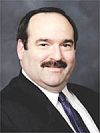 | | Sen. Steven Geller |
Senator Steven Geller (D - Hallandale Beach) offered a competing bill that would require condominium associations to get city approval before they vote against retrofitting their building with the expensive safety systems (opting out). For all practical purposes, this additional requirement would nullify any prospective relief supposedly offered by the amendment. The plumbers and pipe fitters union, the American Fire Sprinkler Association, and the fire marshals have retained an army of lobbyists to fend off any modification to the legislation that would adversely effect their clients. Requiring the approval of the city (the local fire marshal) is akin to asking the wolf to help decide what Bo Peep should pack in her picnic basket.
Fortunately, Senator Geller relented after being swamped by angry feedback from constituents. He agreed to remove the approval of local authority from the opting out process delineated in his bill. He assented to developing compromise language to replace the dogmatic connection to the local fire marshal�s office. Geller�s bill (SB 592) passed Commerce, Economic Opportunities, and Consumer Services Committee (YEAS 9 NAYS 0) on 3/13/2003, Regulated Industries Committee (YEAS 8 NAYS 3) on 3/24/2003, the Judiciary Committee (YEAS 5 NAYS 4) on 4/14/2003, and was placed on the Senate Calendar on 4/16/2003.
The Home Stretch

 | | Sen. Evelyn J. Lynn |
May 24, 2003 - When the dogmatic language in his bill was excised, Senator Geller arrived at an accommodation with Senator Lynn and they united behind Geller�s SB 592. The Banking and Insurance Committee, where Senator Lynn�s bill was on the agenda, postponed its consideration on 4/17/2003 and it subsequently died in Committee on 5/2/2003. The newly co-sponsored Geller bill (SB 592) was placed on the Special Order Calendar on 4/23/2003. The bill was placed before the FULL SENATE on Thursday, April 24th for a vote. This bill contains the legal basis for the opt-out provision that will allow unit owners to opt out of the full sprinkler retrofit as well as the life safety system. It successfully passed the Florida Senate at 4:18 P.M. with 36 YEAS, 2 NAYS (Campbell and Dawson), and 2 Abstentions, after which it was forwarded to the House. It was referred to the House Calendar on April 28th and substituted for HB 695 (its original House companion sponsored by Representatives Robert Allen and Faye Culp). On April 30th it was read the second time (in the House) and added to the Special Order Calendar. On May 1st the House voted on the Senate bill. The bill PASSED (114 YEAS, 0 NAYS) on the third reading and a message of notification was sent to the Senate.
Concurrently, on 4/22/2003 at 6:15 PM Representative Mack�s House bill (HB 165) was withdrawn from the Appropriations Committee and placed on the House Calendar. It was added to the second reading Calendar on April 23rd and to the Special Order Calendar on April 25th. The bill was read the second time on April 28th after which it was added to the Third Reading Calendar. After being read the third time shortly after 8 A.M. on April 30th, it traveled directly to the House floor for a vote. A few minutes later it PASSED (YEAS 66 NAYS 28) after the third reading. Representative Mack�s bill (HB 165), now companion to Geller and Lynn's SB 592, was delivered to the Senate on May 1st, after its success in the House. On the next day, May 2nd, it was scheduled for review by Comprehensive Planning (which Geller chairs) and the Banking and Insurance Committee. Since Geller�s bill had already passed the House and the Senate by May 1st, Mack�s bill became superfluous and died in Geller�s Comprehensive Planning Committee on May 2nd.
This legislative tough man contest yielded one bill and three also-rans. The surviving SB 592, sponsored by Senator Steven Geller (D) and co-sponsored by Senator Evelyn Lynn (R) and Representative Dudley Goodlette (R), requires Governor Jeb Bush�s signature to transform the bill into law. The companion House bill HB 695, sponsored by Representative Faye Culp (R), was folded into its Senate counterpart on April 28th, three days prior to passage by the House. On May 14th SB 592 was signed by the officers and sent to the Governor. The Governor had 15 days take one of three possible actions. He could have signed the bill into law, vetoed the bill, or done nothing! Had he elected to do nothing, the bill would have automatically become law. On May 21st, the Governor finally approved the bill! Stay Tuned...
Click To Top of Page
What Does This All Mean?
- May 24, 2003 -
Senate Bill SB 592
 The Actual Language The Actual Language

 ATTENTION ATTENTION  The following article contains lay (non-legal) commentary on actual legislation that is currently the law of the land. As with all such commentary, the only meaningful legal interpretation should be that of your Association's attorney. The article, while benefitting from some general legal input, is not meant to replace or in any way substitute for legal representation. The intention of this offering is to allow everyone access to the raw text for the purpose of better understanding the basis for your attorney�s legal opinion The following article contains lay (non-legal) commentary on actual legislation that is currently the law of the land. As with all such commentary, the only meaningful legal interpretation should be that of your Association's attorney. The article, while benefitting from some general legal input, is not meant to replace or in any way substitute for legal representation. The intention of this offering is to allow everyone access to the raw text for the purpose of better understanding the basis for your attorney�s legal opinion 

The amendment designed to modify the demands made by the 2002 Fire Safety legislation and empower condominium and cooperative owners with control over the decisions that affect their safety was signed into law by Governor Bush on May 21st. It does NOT mean that we are out of the woods. The amendment co-sponsored by Senators Geller and Lynn (SB 592) does allow condominiums to opt out of the exigencies wrought by the January 1, 2002 Fire Safety Legislation. The law contains identical language in a subsequent section for cooperatives.
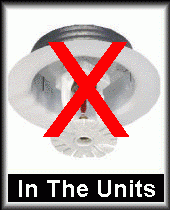 The actual language is as follows, �Notwithstanding the provisions of chapter 633 or of any other code, statute, ordinance, administrative rule, or regulation, or any interpretation of the foregoing, an association, condominium, or unit owner is not obligated to retrofit the common elements or units of a residential condominium with a fire sprinkler system or other engineered life safety system in a building that has been certified for occupancy by the applicable governmental entity, if the unit owners have voted to forego such retrofitting and engineered life safety system by the affirmative vote of two-thirds of all voting interests in the affected condominium.� So far, so good. A two-thirds vote should opt a condominium out of the legislative mandate to pay a Fire Safety Engineer for developing an �Minimum Alternative Life Safety Plan� that wouldn�t be used for eleven years (at which point it would be obsolete). The actual language is as follows, �Notwithstanding the provisions of chapter 633 or of any other code, statute, ordinance, administrative rule, or regulation, or any interpretation of the foregoing, an association, condominium, or unit owner is not obligated to retrofit the common elements or units of a residential condominium with a fire sprinkler system or other engineered life safety system in a building that has been certified for occupancy by the applicable governmental entity, if the unit owners have voted to forego such retrofitting and engineered life safety system by the affirmative vote of two-thirds of all voting interests in the affected condominium.� So far, so good. A two-thirds vote should opt a condominium out of the legislative mandate to pay a Fire Safety Engineer for developing an �Minimum Alternative Life Safety Plan� that wouldn�t be used for eleven years (at which point it would be obsolete).
 The law elaborates, �However, a condominium association may not vote to forego the retrofitting with a fire sprinkler system of common areas in a high-rise building. For purposes of this subsection, the term �high-rise building� means a building that is greater than 75 feet in height where the building height is measured from the lowest level of fire department access to the floor of the highest occupiable story. For purposes of this subsection, the term "common areas" means any enclosed hallway, corridor, lobby, stairwell, or entryway.� Aye, there�s the rub. Since every member Association of the Galt Mile Community Association is cloistered in a �high-rise building� (by definition), this caveat universally applies. While we may opt out of that part of the NFPA 1 Life Safety Code and the NFPA 101 Fire Safety Code that demands sprinklers inside the units, we are seemingly still subject to the amendment�s requirement that emplaces sprinklers in the common areas of the building. The text continues, �In no event shall the local authority having jurisdiction require completion of retrofitting of common areas with a sprinkler system before the end of 2014.� This, of course, applies to condominiums that elect not to opt out of the statutory requirements or determine that they have a legal responsibility to install sprinklers into the common areas. The law elaborates, �However, a condominium association may not vote to forego the retrofitting with a fire sprinkler system of common areas in a high-rise building. For purposes of this subsection, the term �high-rise building� means a building that is greater than 75 feet in height where the building height is measured from the lowest level of fire department access to the floor of the highest occupiable story. For purposes of this subsection, the term "common areas" means any enclosed hallway, corridor, lobby, stairwell, or entryway.� Aye, there�s the rub. Since every member Association of the Galt Mile Community Association is cloistered in a �high-rise building� (by definition), this caveat universally applies. While we may opt out of that part of the NFPA 1 Life Safety Code and the NFPA 101 Fire Safety Code that demands sprinklers inside the units, we are seemingly still subject to the amendment�s requirement that emplaces sprinklers in the common areas of the building. The text continues, �In no event shall the local authority having jurisdiction require completion of retrofitting of common areas with a sprinkler system before the end of 2014.� This, of course, applies to condominiums that elect not to opt out of the statutory requirements or determine that they have a legal responsibility to install sprinklers into the common areas.
The housekeeping segment of the legislation goes on to say, �A vote to forego retrofitting may not be obtained by general proxy or limited proxy, but shall be obtained by a vote personally cast at a duly called membership meeting, or by execution of a written consent by the member, and shall be effective upon the recording of a certificate attesting to such vote in the public records of the county where the condominium is located. The association shall provide each unit owner written notice of the vote to forego retrofitting of the required fire sprinkler system, in at least 16-point bold type, by certified mail, within 20 days after the association�s vote. After such notice is provided to each owner, a copy of such notice shall be provided by the current owner to a new owner prior to closing and shall be provided by a unit owner to a renter prior to signing a lease.� Again, two-thirds of the unit owners must vote to opt out, after which they must be notified �in at least 16-point bold type, by certified mail� within 20 days of the vote.
Once a decision to opt out is arrived at as a result of the vote, the Association has the responsibility to perform some additional housekeeping. It follows that, �As part of the information collected annually from condominiums, the division shall require condominium associations to report the membership vote and recording of a certificate under this subsection and, if retrofitting has been undertaken, the per-unit cost of such work. The division shall annually report to the Division of State Fire Marshal of the Department of Financial Services the number of condominiums that have elected to forego retrofitting.� The �Opt Out� status of a building becomes effective when a certificate reflecting the vote is actually recorded into the public records of Broward County. They, in turn, must notify the State Fire Marshal (currently Tom Gallagher) as to the number of buildings that have elected to opt out.
Additionally, the amendment addresses the �Certificate of Compliance� in the following manner, �Certificate of compliance.--There shall be a provision that a certificate of compliance from a licensed electrical contractor or electrician may be accepted by the association's board as evidence of compliance of the condominium units with the applicable fire and life safety code.� A certificate from either a licensed electrical contractor or electrician affirming that the individual condominium units are in compliance with the fire and life safety code replaces the demand for a report from a Fire Safety Engineer in the original legislation.
What's Next?

This amendment very clearly relieves condominium owners of certain onerous financial requirements that are meted out in the original legislation. This affects the owners on several levels. It initially obviates the need for a $15,000 - $25,000 �Engineered Life Safety System� to be composed by a certified Fire Safety Engineer. It removes the cost attached to sprinkler heads in each unit along with the adjunctive plumbing. While our buildings are already in compliance with a majority of the ancillary requirements component to the �Alternative Engineered Life Safety System�, such as a hard-wired fire alarm system, fire rated corridor doors, transfer grills, generators, etc., the expense of expanding these systems into the units has been curtailed.
While the financial demands on Condominium owners have been substantially diminished by this amendment, the remaining requirements, at first glance, seem extensive and expensive. However, upon closer scrutiny, this appears not be the case! The original legislation refers to the NFPA 1 Life Safety Code and the NFPA 101 Fire Safety Code as the defining guidelines for requirements governing the installation of sprinklers. The concept of sprinklers uniquely installed into the common areas of a building is foreign to the NFPA code! Since the statutory directive is to �follow the NFPA code� and there is no section of NFPA code that addresses the installation of sprinklers only in the common area, there is technically no need to opt out of that particular requirement. Bottom line - When you opt out of the overall retrofit and the �Engineered Alternative Life Safety System�, you are out...of everything! Don�t Forget...the only opinion that matters is THAT OF YOUR ASSOCIATION�S ATTORNEY!
There is another factor that might impact an Association�s decision about if and when they might consider �opting out�. Included in the amendment are new insurance ramafications that could substantially influence an Association�s premiums. For instance, the �Legislature requires a report to be prepared by the Office of Insurance Regulation of the Department of Financial Services for publication 18 months from the effective date of this act, evaluating premium increases or decreases for associations, unit owner premium increases or decreases, recommended changes to better define common areas, or any other information the Office of Insurance Regulation deems appropriate.� This report might recommend increases or decreases in premiums based upon an Association�s intentions relative to Fire Safety.
The amendment also delimits an Association�s responsibility to provide primary hazard insurance for any �policy which is issued or renewed on or after January 1, 2004� covering all �portions of the condominium property located outside the units.� The amendment continues, requiring primary coverage for �The condominium property located inside the units as such property was initially installed, or replacements thereof of like kind and quality and in accordance with the original plans and specifications or, if the original plans and specifications are not available, as they existed at the time the unit was initially conveyed; and all portions of the condominium property for which the declaration of condominium requires coverage by the association.� The amendment then offers a more detailed definition of those items �inside the units� that the Association does (or does not) have primary responsibility for. A responsible Board should therefore invite input not only from it�s Association�s attorney, but also from it�s insurance agent. Even if an Association is resolved to �opt-out�, timing the act prodigiously could save big bucks!
In any event, the amendment is an excellent first step. We are clearly in debt to Representative Mack, Senators Geller and Lynn, and the lobbying effort borne by Becker-Poliakoff for delivering such palpable relief in an extremely short period. They fought an uphill battle against substantial political obstacles and a well-organized lobbying effort by the amendment�s opponents. It is reasonable to assume that this opposition, primarily comprised of the Plumbers and Pipefitters Union, The National Fire Sprinkler Association, and the Fire Marshals Association, will be back next year to restore the resources seemingly lost to their clients.
 This will require an equally effective response by our representatives. This means relying on Becker-Poliakoff to successfully accomplish three simultaneous objectives. They need to fend off the expected attempts by the same vested interests to resecure that major payday at our expense. The firm has to enlist representation in the legislature to once again �carry the ball� for us and protect those political participants from the unfriendly environment created by the media. In addition to preventing opposition lobbyists from unfavorably redefining the code, they must shepherd the elimination of the �common area sprinkler� requirements through the legislative minefield. It follows that additional condos and coops need to be included to help support Becker-Poliakoff�s upcoming challenge. We also need to disseminate the truth surrounding this issue to defend against the hysteria that was used incessantly by the opposition to intimidate media-sensitive politicians. Condominiums and Cooperatives on the Galt Mile maintain containment, automatic recall, and alarm features sufficient to designate these structures as some of the safest in South Florida. This will require an equally effective response by our representatives. This means relying on Becker-Poliakoff to successfully accomplish three simultaneous objectives. They need to fend off the expected attempts by the same vested interests to resecure that major payday at our expense. The firm has to enlist representation in the legislature to once again �carry the ball� for us and protect those political participants from the unfriendly environment created by the media. In addition to preventing opposition lobbyists from unfavorably redefining the code, they must shepherd the elimination of the �common area sprinkler� requirements through the legislative minefield. It follows that additional condos and coops need to be included to help support Becker-Poliakoff�s upcoming challenge. We also need to disseminate the truth surrounding this issue to defend against the hysteria that was used incessantly by the opposition to intimidate media-sensitive politicians. Condominiums and Cooperatives on the Galt Mile maintain containment, automatic recall, and alarm features sufficient to designate these structures as some of the safest in South Florida.
As explained by Representative Connie Mack, we feel that the decision about the degree of protection warranted by a condominium should be left to its owners. Those that stand to gain or lose from its effectiveness should also determine the type of protection. We are not children requiring the dubious oversight foisted upon us at �midnight� by politicians without our knowledge, input, or consent. Our future response needs to expand upon the intent of the amendment. If the people (and their families) that own and inhabit the �common areas� agree that additional protection is necessary, they will provide it, and in an appropriate manner. As such, the surviving requirement to sprinkler the common areas of our homes should be removed and the decision regarding its necessity left to us. Any misguided attempt at �protecting us from ourselves� will NOT be naively construed as a display of concern for our safety. It will be considered as submission AND/OR remuneration to the lobbying groups that stand to gain hundreds of millions of dollars and heretofore unmatched levels of power over a particular class of property owner. Every building on the Galt Mile has historically exceeded compliance with Fire and Safety Codes. In its three decades of existence, not one life has been lost to fire. Might we suggest that this is a result of conscientious condo owners making numerous correct decisions about the scope and quality of protection necessary for their families, their property, and their lives!
 It is always propitious to review the actual text of the amendment when evaluating the advice of an attorney and an insurance agent with regard to an Association's options. Click Here to access the text of the amendment in its entirety. It is always propitious to review the actual text of the amendment when evaluating the advice of an attorney and an insurance agent with regard to an Association's options. Click Here to access the text of the amendment in its entirety.
 To participate in the Fire Safety Lobby (to exempt your community from an expensive retrofitting), contact Attorney Donna D. Berger Esq. of Becker & Poliakoff, P.A. at (954) 985-4163 or Toll Free at (800) 432-7712 Ext. 4163. She can be contacted by E-mail at [email protected]. As a participating residence, you�ll recieve automatic access to Becker & Poliakoff's "Fire Safety Update", a web site that delivers current progress data in its appropriate legal context. To participate in the Fire Safety Lobby (to exempt your community from an expensive retrofitting), contact Attorney Donna D. Berger Esq. of Becker & Poliakoff, P.A. at (954) 985-4163 or Toll Free at (800) 432-7712 Ext. 4163. She can be contacted by E-mail at [email protected]. As a participating residence, you�ll recieve automatic access to Becker & Poliakoff's "Fire Safety Update", a web site that delivers current progress data in its appropriate legal context.
Click To Top of Page
Fire Safety Summary
- July 12, 2003 -
 July 12, 2003 - Senate Bill 592, after surviving a shaky adolescence last legislative term, developed into a law that�s earned the curiosity of every condominium and co-op in South Florida. While the law allows electronic transmission as a form of notice for not-for-profit corporations; includes e-mail and fax addresses as part of an association�s official records; permits domestication of foreign not-for-profit corporations; significantly revises the insurance provisions found in 718.111(11); and clarifies that any actions arising to enforce condominium documents do not carry a 1-year statute of limitations (5-year statute of limitations is consistent with recent case law), it is most well known for its enigmatic �opt-out� provisions granted to condominium and cooperative owners throughout the State of Florida. July 12, 2003 - Senate Bill 592, after surviving a shaky adolescence last legislative term, developed into a law that�s earned the curiosity of every condominium and co-op in South Florida. While the law allows electronic transmission as a form of notice for not-for-profit corporations; includes e-mail and fax addresses as part of an association�s official records; permits domestication of foreign not-for-profit corporations; significantly revises the insurance provisions found in 718.111(11); and clarifies that any actions arising to enforce condominium documents do not carry a 1-year statute of limitations (5-year statute of limitations is consistent with recent case law), it is most well known for its enigmatic �opt-out� provisions granted to condominium and cooperative owners throughout the State of Florida.
The law that this effort amends required that any high-rise building (75 feet or higher) be retrofitted with an automatic sprinkler system inside each unit by 2014 pursuant to the requirements of the NFPA-1 (National Fire Protection Association) National Fire Prevention Code. There are two exemptions to this requirement: A) if every unit opens onto an open-air walkway with access to two remote stairwells or B) if a building chooses to install an engineered life safety system in lieu of the total retrofit. The engineered life safety system is not clearly defined by the Code but it typically consists of a partial sprinkler system together with various components including a sophisticated fire alarm system, fire-rated corridor and unit doors, self-closing mechanisms on the unit doors, elevator recall system, etc. At best, the alternative is extremely expensive and questionably effective. In addition, once the alternative option is exercised, the local jurisdictional authority (i.e. your local fire marshal) can (and often does) substantially shorten the deadline of 2014.
The Amendment (SB 592) offers a third choice that only requires the sprinklering of the �common areas� of the building. However, to �opt out� of the original options, it is imperative to follow a carefully drawn legal road map. Two-thirds of the total Association membership must vote to opt out at a duly called association meeting either in person or through the use of a written consent. Proxies are not acceptable for this vote! Once the measure passes, three bases have to be touched before the decision is actualized. A Certificate confirming the Association�s elective result needs to be filed in the public records of the building�s county. Each unit owner must be notified in writing (in 16-point bold print) by certified mail within twenty (20) days about the results of the vote to waive the retrofitting requirement. The third step mandates that the Division of State Fire Marshal of the Department of Financial Services be, in turn, alerted to the certified results of the Association membership�s �opt-out� vote. Since there�s no deadline for this �opt-out� vote and proxies are ARE NOT an option, it seems preferable to time the vote to coincide with the �season� to take advantage of the additional unit owners available for the vote. While this format is easily understood, it is critically important to take each legal step correctly. Achieving this without the guidance and oversight of the Association�s attorney is akin to dancing through a mine field while wearing a blindfold. Attention to legal detail will inoculate the Association against the liability nightmares that derive of trying to �be your own lawyer�. The Association�s attorney is unquestionably the correct point person for this mission. The Association�s Insurance Agent should be the strong right arm.
What's left is an enigma. The one-time opt out vote DOES NOT relieve an Association of having to retrofit sprinklers into the common areas. There are three available definitions of common areas. There�s the traditional definition of common areas found in Chapter 718 (The Condominium Act) and Chapter 719 (Cooperatives) of the Florida Statutes. SB 592 (the Amendment) redefines common areas as �any enclosed hallway, corridor, lobby, stairwell or entryway�. The original legislation directs buildings to use the NFPA 1 and the NFPA 101 Codes as statutory guidelines for installing an acceptable system. To help make this issue as clear as mud, neither NFPA Code addresses (or conceives of) the installation of sprinklers uniquely in the common areas. Aren�t you glad that the Association�s attorney is spearheading this effort!
 The Association�s final step is legislative preparation. Few positive events in Tallahassee occur spontaneously. The bill that passed did so because of a concerted hard-fought effort contributed to by numerous concerned Associations. The next legislative session presents a danger and an opportunity. The Pipe Fitters and Plumbers Unions, the Fire Marshals, the National Fire Sprinkler Association, and other groups that stand to lose millions of dollars from this hole in their political pork barrels will undoubtedly desperately try to plug it. This needs to be defended against. Some of the protocols inherent in the amendment are unnecessary burdens designed to feed a hungry bureaucracy rather than relay information. There is no reason to disallow proxies when voting to opt out of the retrofitting. Limited proxies have historically been acceptable substitutes for written consent. There are also more affordable methods of confirmed notification than �certified mail�. These requirements need to be modified. The Association�s final step is legislative preparation. Few positive events in Tallahassee occur spontaneously. The bill that passed did so because of a concerted hard-fought effort contributed to by numerous concerned Associations. The next legislative session presents a danger and an opportunity. The Pipe Fitters and Plumbers Unions, the Fire Marshals, the National Fire Sprinkler Association, and other groups that stand to lose millions of dollars from this hole in their political pork barrels will undoubtedly desperately try to plug it. This needs to be defended against. Some of the protocols inherent in the amendment are unnecessary burdens designed to feed a hungry bureaucracy rather than relay information. There is no reason to disallow proxies when voting to opt out of the retrofitting. Limited proxies have historically been acceptable substitutes for written consent. There are also more affordable methods of confirmed notification than �certified mail�. These requirements need to be modified.
 Of greater import is the statutory recognition of acceptably safe alternatives to �the sprinklering of common areas�. Intelligent Fire Detection and Alarm systems have the technological maturity to surpass the protection afforded by �sprinklering common areas�. Automatic recall systems and voice evacuation speakers in the units would provide substantially greater safety at less cost than a half ton of plumbing supplies. It is not surprising that these well-known alternatives have been given short shrift by Plumbing and Pipe Fitters Unions and the Fire Sprinkler Association as well as the beneficiaries of their political contributions. Translating these relevant facts into political reality is a challenge that needs to be met with the same coordinated effort that produced the Amendment. Becker & Poliakoff have their work cut out for them. They�re going to need all the help they can get. We all need to see that they get it! Stay Tuned... Of greater import is the statutory recognition of acceptably safe alternatives to �the sprinklering of common areas�. Intelligent Fire Detection and Alarm systems have the technological maturity to surpass the protection afforded by �sprinklering common areas�. Automatic recall systems and voice evacuation speakers in the units would provide substantially greater safety at less cost than a half ton of plumbing supplies. It is not surprising that these well-known alternatives have been given short shrift by Plumbing and Pipe Fitters Unions and the Fire Sprinkler Association as well as the beneficiaries of their political contributions. Translating these relevant facts into political reality is a challenge that needs to be met with the same coordinated effort that produced the Amendment. Becker & Poliakoff have their work cut out for them. They�re going to need all the help they can get. We all need to see that they get it! Stay Tuned...
 The lobbying effort coordinated by Becker-Poliakoff (Click Here for Details) to resituate the responsibility (and decisions) for Fire Safety protection back to the homeowners and their chosen Fire Safety Engineers needs to be broadened. As more condos and co-ops join the effort, more light can be focused on the relevant issues (especially in Tallahassee). To participate in the Fire Safety Lobby (to exempt your community from an expensive retrofitting), contact Attorney Donna D. Berger Esq. of Becker & Poliakoff, P.A. at (954) 985-4163 or Toll Free at (800) 432-7712 Ext. 4163. She can be contacted by E-mail at [email protected]. As a participating residence, you�ll receive automatic access to Becker & Poliakoff�s �Fire Safety Update�, a web site that delivers current progress data in its appropriate legal context. The lobbying effort coordinated by Becker-Poliakoff (Click Here for Details) to resituate the responsibility (and decisions) for Fire Safety protection back to the homeowners and their chosen Fire Safety Engineers needs to be broadened. As more condos and co-ops join the effort, more light can be focused on the relevant issues (especially in Tallahassee). To participate in the Fire Safety Lobby (to exempt your community from an expensive retrofitting), contact Attorney Donna D. Berger Esq. of Becker & Poliakoff, P.A. at (954) 985-4163 or Toll Free at (800) 432-7712 Ext. 4163. She can be contacted by E-mail at [email protected]. As a participating residence, you�ll receive automatic access to Becker & Poliakoff�s �Fire Safety Update�, a web site that delivers current progress data in its appropriate legal context.
Click To Top of Page
 Notice Notice 

Public Meeting About the Fire Safety Amendment

The Office of the Florida State Fire Marshall, Thomas Gallagher, is convening a Public Meeting to help clarify the tenets of the recently passed Fire Safety Amendment and the original Fire Safety legislation.
Questions and comments from the community will have a substantial influence on the manner and extent to which the Statute will be implemented.
Show Up, Stand Up, Speak Out

- The Date: Wednesday, September 10th, 2003
The Time: 1:00 P.M.
The Place: The Beach Community Center
3351 NE 33rd Avenue in Fort Lauderdale

 To Familiarize Yourself with the Agenda Issues... To Familiarize Yourself with the Agenda Issues...

READ ABOUT
The State of Florida Fire Marshal's
Public Meeting
- September 3, 2003 -

 | | SFM TOM GALLAGHER |
September 3, 2003 - There is understandable confusion surrounding the options available to high-rise condominiums as a result of the passage of Florida Senator Stephen Geller's Amendment (Senate Bill 592) during the 2003 legislative session in Tallahassee. The original legislation elicited a decision by high rise buildings' Homeowner Associations to either retrofit a full sprinkler system throughout the entire interior or to install an approved �Alternative Minimum Life Safety System� designed by a Fire Safety Engineer. The Fire Safety Engineer does not have the authority to design what's most appropriate for the building, he is constrained by the NFPA #1 Life Safety Code and the NFPA #101 Fire Safety Code. The NFPA Code requires, in addition to a variety of other alarm systems, fire safety systems and equipment, the installation of sprinklers in the common areas of the building and inside each entrance to every unit.
Some condominiums immediately took advantage of the amendment's "opt-out" provision, deciding to forego either of the two choices. These courageous condominiums went to their respective attorneys and asked, �What do we have to do next?� This is where the confusion proliferates. Some attorneys pointed to that portion of the amendment that requires the installation of sprinklers in the building�s �common areas�, advising their clients to install them even if their Fire Safety Engineer felt that any safety benefit derived of their installation to be marginal. Some attorneys indicated that there was no need to do anything else after opting out, alluding to the marked lack of specificity in the NFPA code with regard to sprinklering only �common areas�.
The Fire Marshall for the State of Florida, Tom Gallagher, will send some key Staff personnel to attend a meeting at the Beach Community Center on Wednesday, September 10th at 1:00 PM. Mr. Gallagher's Staffers are expected to cast some light on this enigmatic issue. Mr. Gallagher is straddling a tricky political tightrope. On one end is a politically aligned group of vested interests comprised of the Fire Sprinkler Association (which hopes to sell hundreds of millions of dollars worth of equipment), the Plumbers and Pipe fitters Union (which hopes to install hundreds of millions of dollars worth of equipment), and the Fire Marshal�s Association (which hopes to oversee the sales and installations). On the other end are high-rise building residents, legions of condominium and coop owners and apartment occupants (who have to foot the bill). They want the right (with the benefit of their Fire Safety Engineers) to select and install Fire Safety systems that are customized to their individual needs instead of the mandated �boilerplate� systems of questionable effectiveness.
The Public meeting is one of a series of meetings sponsored by the Fire Marshall�s office. Members of the Fire Marshall�s staff are blanketing the state in an effort to accomplish two goals. Ostensibly, the reason for the �Public Meetings Campaign� is to clarify the Fire Marshal�s position with regard to the dogmatic (and expensive) amendment. The second, less publicized, reason for this omnibus campaign is to collect feedback from Mr. Gallagher�s constituency. After explaining the Fire Marshal�s position to the Public Meeting attendees throughout the State, the Staff members hope to explain the public�s opinion to Mr. Gallagher.
The audiences promise to be weighted heavily with two categories of high-rise dweller, the confused and the angry. The political ping-pong surrounding the original legislation, the subsequent amendment and the broad spectrum of interpretations assigned to both have left hundreds of thousands of condo and coop owners in a daze. The �stealth� passage of the original legislation coupled with the huge expense attached to its implementation has understandably engendered substantial public ire.
To add fuel to this fire, both sides are in a state of �statutory flux�. The Fire Sprinkler Association, the Plumbers and Pipe Fitters Union, and the Fire Marshalls Association intend to return to Tallahassee next year to insure their �big payday�. Thousands of homeowner associations also expect to defend their right to decide for themselves which measures would be most effective to secure their own safety.
If you are either confused or angry, you should feel comfortable at the September 10th public meeting. This is your opportunity to convey your sentiments to the �powers that be� in Tallahassee. Several Association attorneys anticipate attending for the purpose of asking the Staff personnel pointed questions about the amendment. Local Fire officials are also expected to attend, hoping to receive both clarification and a taste of public opinion. It should be an interesting afternoon.
Click Here to learn more about the new Fire Safety Amendment. Click Here to understand the basis for the confusion surrounding the Fire Safety issue.
 If you serve on the Board of Directors or the Board of Governors of a Condominium Association, please consider attending this meeting. If you are a resident of a condominium, ask your Board members if they plan on attending...it could save you a substantial amount of money! If you serve on the Board of Directors or the Board of Governors of a Condominium Association, please consider attending this meeting. If you are a resident of a condominium, ask your Board members if they plan on attending...it could save you a substantial amount of money!

The State of Florida Fire Marshal's
Public Meeting Washes Out
- September 10, 2003 -

 | | FORT LAUDERDALE BEACH COMMUNITY CENTER |
On Wednesday, September 10th, roughly 150 Galt Mile residents attended a disappointing Public Information Workshop presented by the Florida Division of State Fire Marshal, Bureau of Fire Prevention at the Beach Community Center. The purpose of the workshop, in Fort Lauderdale Fire Marshal Steve Kastner�s words, was to �educate condominium associations throughout the State on the recent changes to the Florida Statutes regulating the retrofitting of high-rise residential properties�. The presentation was one of many organized by the State Fire Marshal�s office across Florida. The series of Public Meetings was contemplated to help mollify the anger fed by confusion surrounding the 2002 Fire Safety Statute and the subsequent Fire Safety Amendment (Senate Bill 592). The confusion has spread from the condos and co-ops trying to understand the Statute�s impact to the local Fire Marshal�s office. The stated purpose of the workshop was never achieved.
 The staffer stated, for example, that the installation of an approved retrofitting plan had to be completed by 2014. The text of the Amendment actually states that �In no event shall the local authority having jurisdiction require completion of retrofitting of common areas with a sprinkler system before the end of 2014.� The difference between the staffer�s statement and the text of the Amendment was not lost on the audience. The law does not require a completed installation by 2014; it instead constrains the local authority from demanding that the sprinkler portion of the statute be operational by 2014. The local authority can elect to require completion of retrofitting, if they so choose, by the end of 2015...or 2016...or never! The overwhelmed staff member, when faced with the discrepancies between the text on the �fact sheets� and the actual law, stated that he �just got sent down here to do this (referring to the presentation).� He apologetically continued, �This law is in a state of flux. The Fire Marshal�s office, along with most local fire authorities, is awaiting clarification from the legislature.� This disarming admission was followed by three simultaneous reactions. A dozen waving audience hands came down, two dozen more went up, and an attorney in the audience stated that she had participated in the drafting of the amendment and would be willing to shed some much-craved light on the subject. The staffer stated, for example, that the installation of an approved retrofitting plan had to be completed by 2014. The text of the Amendment actually states that �In no event shall the local authority having jurisdiction require completion of retrofitting of common areas with a sprinkler system before the end of 2014.� The difference between the staffer�s statement and the text of the Amendment was not lost on the audience. The law does not require a completed installation by 2014; it instead constrains the local authority from demanding that the sprinkler portion of the statute be operational by 2014. The local authority can elect to require completion of retrofitting, if they so choose, by the end of 2015...or 2016...or never! The overwhelmed staff member, when faced with the discrepancies between the text on the �fact sheets� and the actual law, stated that he �just got sent down here to do this (referring to the presentation).� He apologetically continued, �This law is in a state of flux. The Fire Marshal�s office, along with most local fire authorities, is awaiting clarification from the legislature.� This disarming admission was followed by three simultaneous reactions. A dozen waving audience hands came down, two dozen more went up, and an attorney in the audience stated that she had participated in the drafting of the amendment and would be willing to shed some much-craved light on the subject.
 | | Donna D. Berger Esq. |
The relieved staffer invited the attorney, Donna D. Berger Esq. from the Law Firm of Becker & Poliakoff, P.A., to the podium in hopes of allaying the mounting disappointment infecting the audience. Ms. Berger quickly responded to several questions that had stymied the staffer and stated that in view of the transitional status of the Statute and the Amendment, she felt that the attempt by the State Fire Marshal�s office to clarify this statutory moving target at this point was premature. She explained that she had attended several other versions of this presentation in other parts of the State and they all had two things in common. Firstly, they were fraught with statements that were inaccurate or completely incorrect. Secondly, they were all different. In Largo and Daytona, for instance, Associations were incorrectly advised that they had to install approved systems almost immediately. Apparently, the information divulged at the various presentations depended, in large part, upon the individual staff member�s personal knowledge or opinion of the subject matter. The staffer agreed, explaining that the inconsistent nature of these Public Meetings reflected the obscure result of the compromises that fostered both the legislation and the Amendment. He acceded that the public �would be better served by reconvening these meetings after a few more legislative sessions.�
While Ms. Berger received an ovation by the majority of those in attendance, her advice to be patient and let the legislative dust settle before committing the substantial resources demanded by the legislation disturbed some attendees. Despite the fact that she was invited to speak by the Fire Marshal�s staffer because he admittedly didn�t have the answers to participants� questions, one gentleman admonished that he came �to hear what the Fire Marshal had to say, not Ms. Berger�. Curiously, another gentleman repudiated the Fire Marshal for �not sticking to his guns.�
 | | Fire Marshal Steve Kastner |
Following the meeting, Fort Lauderdale Fire Marshal Steve Kastner of the Fort Lauderdale Fire Prevention Bureau said that he agreed with Ms. Berger. He said that he directed his office to advise concerned Associations to be patient while the legislative process unfolds. He admitted that many Associations were understandably anxious as a result of being placed into a Catch-22 conundrum. Associations are facing uncertain liability attendant to compliance with an incomprehensible and controversial law. Fire Marshal Kastner further stated that his office would continue to use common sense Fire Safety guidelines when applying enforcement until Tallahassee�s good intentions evolved into clearly discernible legislation.
Click To Top of Page
Fort Lauderdale�s Fire Chiefs
Extend Welcome Mat to Associations
- November 11, 2003 -

 | | Fire Marshal Steve Kastner |
November 11, 2003 - On October 30, 2003, Fort Lauderdale Fire Marshal Steve Kastner, Division Chief of the Fort Lauderdale Fire Prevention Bureau, and Chief Robert Edgar of the Emergency Medical Services Bureau met with GMCA Presidents Council Chairman Pio Ieraci and Advisory Board Member Eric Berkowitz to improve communications among the Fire Marshal�s office, the E.M.S. Division and the community. The meeting, arranged by Fort Lauderdale Public Information Specialist Monique Damiano, centered on vehicles that would help promote a two-way information window through which community concerns could pass to the Fire Marshal and be directly addressed free of distortion.  | | EMS Chief Robert Edgar |
EMS Division Chief Robert Edgar also indicated that a direct exchange of information would serve to highlight certain critical �public safety� issues that could save lives in the Galt Mile community. Chief Edgar�s recent initiative to emplace AEDs (Automated External Defibrillators) into the neighborhood�s condominiums and co-ops is an unmitigated success, as almost half of the 25 GMCA member Associations have purchased the life-saving devices while others are investigating their installation. The proposed information format would help focus the Fire-Rescue Department�s attention on those issues considered as priorities by the Galt Mile Community Association. Fire Marshal Kastner could respond to �community-specific questions and problems� with direct and unedited answers on the Association�s web site. Similarly, EMS Chief Edgar could alert the community to life-saving procedures that could help avert or shave valuable response seconds off time-critical emergency medical situations. Chief Edgar regretfully informed us that the Department would be unable to follow through on their original intention of providing Associations that purchased AEDs with CPR/AED certified training. The fiscal constraints that Fort Lauderdale is laboring under are too severe �to deliver the training at this time� (Click Here to see Budget Cuts}. He recommended several alternatives that we are currently exploring. He also promised to reconsider when the City�s financial situation stabilized.
Fire Marshal Kastner has been caught up in the confusion that resulted from the Fire Safety legislation and the recent Fire Safety Amendment issued by Tallahassee. Both legislative efforts are legally and practically dogmatic. Fire Marshal Kastner�s responsibility is to enforce a law that is inherently unclear yet extremely costly. A wide range of contradictory legal opinions and interpretations from condominium attorneys followed on the heels of the original legislation. Shortly after its inception, Marshal Kastner, like scores of other local fire officials throughout the state, issued a notification of the new legislation to condominiums within his jurisdiction. When the shortcomings of the legislation reached flabbergasted condo boards, they directed their ire toward the local Fire Marshal. Marshal Kastner responded with a town hall style public meeting on 7/10/2002 in which he reassured residents that he intended to �work with them�. Because of the harsh directives and enigmatic terms of the actual legislation, this did little to assuage the growing anxiety of affected condos and co-ops.  | | SFM Tom Gallagher |
In a recent attempt to quell the statewide confusion, Florida State Fire Marshal Tom Gallagher�s office conducted a series of public meetings throughout the state to shed some light on the statute and the amendment. Marshal Kastner, along with several hundred concerned residents, attended the September 10th, 2003 Public Meeting at the Beach Community Center. After the meeting (at which the staff member from the State Fire Marshal�s office admitted that he didn�t understand the legislation) Marshal Kastner recommended that condominium associations wait until Tallahassee clarifies the terms of the statute before responding to its perplexing tenets.
The Fire Marshal has been the target of community consternation for the past year. Residents and their representative Boards, anticipating possible enforcement retribution from the Fire Marshal�s office, have been poised for an unpleasant legal encounter. This atmosphere of suspicion and distrust has soured relations with the Fire Marshal that were once excellent. Board members that used to call the Fire Marshal�s office for guidance or advice hesitate to do so for fear of broaching a �Pandora's Box� of potential acrimony. Marshal Kastner said that while this anxiety is understandable, it�s completely baseless. He assured us that he has no political agenda and that his only aspiration is for a workable statute that would save lives. He stated that he wanted residents to feel comfortable with the fact that he has no intention of enforcing the statute until its terms are clear. He acknowledged that the legislation has become the focus of competing political agendas. Marshal Kastner anticipates that �two or three more legislative sessions� would be required to develop a more universally acceptable statute.
In an effort to ameliorate the currently uneasy relationship with the community, the Fire Marshal is actively seeking improved communications. He has invited the Galt Mile Community Association to request his official or unofficial input on any fire-related issue. He offered to provide timely advice to help any Association cope with the legislative confusion or the upgrading of their fire safety systems. Marshal Kastner said that Association members are always welcome to contact him for any reason. �I am always willing to answer their questions. They should never be afraid of contacting me.� He also offered to review and comment on any fire safety issue considered important enough to publish on the Galt Mile Community Association web site. Marshal Kastner said that while he harbors reservations regarding some of the concepts espoused and sources used on the GMCA Web Site, he �agrees with 90% of the content�. Having the Fire Marshal�s office available as an open resource would be of enormous benefit to individual Associations and the community as a whole. In response to a request by Pio Ieraci, Marshal Kastner agreed to address the December 1, 2003 meeting of the GMCA Presidents Council. In the spirit of this new �open door� relationship with the Fire Marshal�s office, Ms. Damiano (of the Public Information Office) offered to regularly email a complete municipal information packet to any condo association upon request.
Subsequent to structuring a format for improved communications, the Fire Marshal recounted some of the qualities that comprise a good fire safety system. The keys are flexibility and common sense. Whether or not an Association anticipates compliance with some variation of the statute (once demystified), the basic detection and alarm systems that protect us should have the ability to adapt to technological upgrades. Component systems are vastly preferable to the pre-packaged proprietary systems that require complete replacement once obsolete. Separate control panels, enunciator panels, communications boards and auxiliary features allow for the selective upgrading of equipment required by code changes or technological advances. The cost of upgrading specific parts of a good system is substantially less than scrapping and replacing an inadequate one in its entirety. Marshal Kastner also warned against falling into a proprietary equipment trap. Verify with the equipment manufacturer that multiple local fire-safety equipment maintenance companies can service the purchased equipment. Some vendors will take a sizable loss on the equipment cost, knowing that they will recover substantially more while servicing it. This trap can only be sprung if the vendor that sold the equipment is the only available servicer as well.
We feel that this overture can provide the basis for a return to times when the Fire Marshal was a staunch ally of our neighborhood association, providing attention to the individual needs and unique concerns of our member Associations and their fire safety engineers. The Galt Mile Community Association and the Fire Marshal�s office both share a desire to protect our residents. It�s simply a matter of narrowing our differences (real or imagined) about how this can best be achieved. More to come�stay tuned�
 Fort Lauderdale Fire Marshal Steve Kastner, Division Chief of the Fort Lauderdale Fire Prevention Bureau, is located at 300 Northwest First Avenue, Fort Lauderdale, Florida 33301. The Bureau's contact information is Phone: (954) 828-6370, FAX: (954) 828-5338. Marshal Kastner's E-mail address is [email protected] and his direct number is (954) 828-5654. Fort Lauderdale Fire Marshal Steve Kastner, Division Chief of the Fort Lauderdale Fire Prevention Bureau, is located at 300 Northwest First Avenue, Fort Lauderdale, Florida 33301. The Bureau's contact information is Phone: (954) 828-6370, FAX: (954) 828-5338. Marshal Kastner's E-mail address is [email protected] and his direct number is (954) 828-5654.
 Fort Lauderdale Emergency Medical Services Bureau Division Chief Robert Edgar's E-mail address is [email protected] and his direct number is (954) 828-6831. Fort Lauderdale Emergency Medical Services Bureau Division Chief Robert Edgar's E-mail address is [email protected] and his direct number is (954) 828-6831.
 ATTN: ASSOCIATIONS ATTN: ASSOCIATIONS To receive a complete municipal information packet by e-mail, contact Monique Damiano at the Public Information Office. Click Here to email Ms. Damiano or call (954) 828-4743. To receive a complete municipal information packet by e-mail, contact Monique Damiano at the Public Information Office. Click Here to email Ms. Damiano or call (954) 828-4743.
Click To Top of Page
Legislative Session Opens 
Fire Safety  Bills Heat Up Bills Heat Up
- February 25, 2004 -

 February 25, 2004 - March 2004 heralds the opening of a new legislative session in Tallahassee. The passage of the Fire Safety Amendment during last year's legislative session slammed the brakes on the mandatory sprinkler retrofitting of every unit in every high-rise in Florida. The door was opened for Associations and their Fire Safety Engineers to reassume the responsibility for instituting safe and effective Fire Safety systems in our homes. Condominiums and Coops were afforded the opportunity to opt out of the �one-size-fits-all� rigors mandated by the original legislation passed in the dead of night. There is little doubt that the National Fire Sprinkler Association and the Plumbers and Pipe Fitters Union will pump millions into undoing the gains won last year by Condominiums and Coops in an effort to reacquire the multi-BILLION dollar payday that was derailed by the Fire Safety Amendment (S 592). In response, legislators sympathetic to the needs of Condos and Coops are digging in for the anticipated struggle. February 25, 2004 - March 2004 heralds the opening of a new legislative session in Tallahassee. The passage of the Fire Safety Amendment during last year's legislative session slammed the brakes on the mandatory sprinkler retrofitting of every unit in every high-rise in Florida. The door was opened for Associations and their Fire Safety Engineers to reassume the responsibility for instituting safe and effective Fire Safety systems in our homes. Condominiums and Coops were afforded the opportunity to opt out of the �one-size-fits-all� rigors mandated by the original legislation passed in the dead of night. There is little doubt that the National Fire Sprinkler Association and the Plumbers and Pipe Fitters Union will pump millions into undoing the gains won last year by Condominiums and Coops in an effort to reacquire the multi-BILLION dollar payday that was derailed by the Fire Safety Amendment (S 592). In response, legislators sympathetic to the needs of Condos and Coops are digging in for the anticipated struggle.
While the opt-out provisions inherent in the Fire Safety Amendment are definitely a step in the right direction, they contain several irrational obstacles whose only discernible purpose is to increase our maintenance assessments in exchange for nothing. To avoid the multi-million dollar retrofit requiring sprinkler heads popping out of the ceilings in your unit, two-thirds of the total Association membership must vote to opt out at a duly called association meeting either in person or through the use of a written consent. Proxies, long-acceptable for almost any other reason, are not acceptable for this vote! After the vote, each unit owner must be notified in writing (in 16-point bold print) by certified mail within twenty (20) days about the results of the vote to waive the retrofitting requirement. The Amendment further states, �After such notice is provided to each owner, a copy of such notice shall be provided by the current owner to a new owner prior to closing and shall be provided by a unit owner to a renter prior to signing a lease.� This type of disclosure is similar to what the law requires when trying to sell or rent a unit that is infested with termites!
 | | Sen. Steven Geller |
 | | REP. FAYE CULP |
Two bills have been drafted which will allow you to exercise your opt-out rights granted last session in an easier and more streamlined process. Senate Bill 1938, sponsored by Senator Steven Geller (D), and its companion House Bill 747, sponsored by Representative Faye Culp (R), would allow the use of limited proxies in connection with the opt-out vote. These bills would also remove the requirement that notice be sent via certified mail to every unit owner within twenty (20) days after the vote was taken. Instead, they would substitute that notice be given by mail, hand delivery or electronic transmission at least fourteen (14) days prior to the meeting at which the vote to forego retrofitting is held. Not only does this save the Association the expense of a certified mailing, it affords interested residents the opportunity to familiarize themselves with the salient issues before deciding how to vote. Finally, SB 1938 and HB 747 would remove the requirement that a copy of the opt-out vote results notification be given to each prospective owner and renter (the �termite� warning).
The fight to protect our rights is being spearheaded by the Fire Safety Lobby and the Condominium Association Legislative Lobby (CALL), coalitions of Condominiums and Coops throughout the state created to protect millions of Condo and Coop residents from legislative disenfranchisement and unfunded mandates. The Fire Safety Lobby, organized by well-known Condominium Association Law Firm Becker & Poliakoff, has three goals it needs to address this year. The first is to defend the opt-out rights that were granted last year. All of the opponents to the Amendment last year are already geared up for a fight to repeal your opt-out rights. The second is to make the opt-out vote easier to obtain. SB 1938 and HB 747 will realize that. The third is to resolve the lingering common area sprinkler issue. The first two are critical to accomplish this year; the third could be addressed if and when the opportunity presents itself. Because the installation of common area sprinklers cannot be required PRIOR to the end of 2014, there is adequate time to properly prepare for the impending struggle.
If members of the various House and Senate Committees required to review the bills throughout the legislative process receive public indication that the bills should be considered favorably, two things happen. First, the Senators and Representatives will be predisposed to advancing the bill through the legislative maze on its way to becoming a law. This will, as mentioned, make it simpler and less expensive for us to exercise our opt-out rights. Second, and of greater importance, is the signal it will send throughout Tallahassee that any attempt to soak Associations for billions of dollars to satisfy some corporate lobbies will meet with obstinate resistance.
Considering the billions of dollars in plumbing sales �on the table�, its not surprising that our opponents� minions are awash with cash. The deep-pockets lobbyists for the National Fire Sprinkler Association and the Plumbers and Pipe Fitters Union have launched a well-funded campaign to reverse last year�s achievements. The Fire Safety Lobby�s secret weapon is US. Letters, telephone calls, faxes and emails from the affected voting constituency was the key to last year's success. Our small individual voices made our lobby�s voice loud by amplifying its credibility in Tallahassee's Statehouse corridors.

Legislative History
This is what Happened To Date
- March through June, 2004 -

The Senate
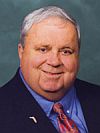 | | Sen. Pres. Jim King |
March 25th through April 30th, 2004 - Although these bills only facilitate the housekeeping ascribed to the opt-out vote, making it easier and less expensive for the residents of a Condominium or a Coop to actualize their will, they will face opposition in Tallahassee. In politics, progress is accomplished in baby steps. Politicians feel more comfortable making decisions based on public input than committing their support in a vacuum. The Senate Comprehensive Planning Committee conducted a hearing considering Senator Steven Geller�s Senate Bill 1938 on Monday, March 1st at 2:00 PM. The Committee is chaired by Senator Geller and its Vice Chair is Senator Daniel Webster (R). The bill was considered favorably, passing the Committee with 5 YEAS and 0 NAYS. As a result, on March 3rd, the bill was sent to the Senate Committee on Regulated Industries (See Below) for consideration. After being placed on the agenda on March 18th, the bill weathered a March 23rd vote by 11 YEAS vs. 0 NAYS - PASSING UNANIMOUSLY! The next day, March 24th, SB 1938 was placed on the calendar for consideration by the full senate! The Bill was placed on Special Order Calendar on April 14th. After the third reading of the bill on April 15th, SB 1938 was passed by the full Senate by a vote of 39 YEAS vs. 0 NAYS. After passing the Senate, the bill sent to the House on April 21st for consideration. On April 23rd, the Senate Bill 1938 was substituted for the companion House Bill 747 CS. It was then temporarily postponed on second reading and placed on the Special Order Calendar for April 26th as �unfinished business�. On the last day of the legislative session, April 30th, the bill died on the House Calendar.
Click Here to read the actual text of the final version of SB 1938.
The House
 | | Speaker Johnnie Byrd |
March 25th through April 23rd, 2004 - House Bill 747 (HB 747), the identical companion bill in the Florida House of Representatives, was referred to the House�s Local Government and Veterans� Affairs Committee. This committee is chaired by Representative Ken Sorensen (R). On March 3rd, the bill was considered favorable in committee, passing with 15 YEAS and 1 NAY out of 20 possible votes. The bill was sent to the House Judiciary Committee for consideration. As explained below, the bill was derailed in the Judiciary Committee. However, on March 25th the full House sent the bill back to the Judiciary Committee for reconsideration (see below)! The bill was scheduled to be reconsidered by the Juciciary Committee on March 31st at 4:15 PM.The House Judiciary Committee conducted its reconsideration of the Bill on schedule and passed the bill by a vote of 14 YEAS, 0 NAYS and 5 Missed Votes for the 19 members. The bill was added to Second Reading Calendar on Monday, April 12th at 4:01 PM. It was closed to Main and Adhering Amendments on April 14th. On April 21st, HB 747 CS was added to the Special Order Calendar. Two days later (April 23rd), Senate Bill 1938 was substituted for House Bill 747 CS and the House Bill was laid on the table. See Above!

The Final Inning 
  | | Senator Atwater & Rep. Bogdanoff |
April 16th through June 23rd, 2004 - After the bills (SB 1938 and HB 747) completed the review process, they were sent to their respective floors for full House and Senate approval. On April 15th the full Senate passed the Senate bill by a vote of 39 YEAS vs. 0 NAYS. On April 23rd, the Senate Bill 1938 was substituted for the companion House Bill 747 CS. It was then temporarily postponed on second reading and placed on the Special Order Calendar for April 26th as �unfinished business�. On April 30th, the bill died on the Calendar; it was laid on the table.
On the same day that Senate Bill 1938 slipped into nonexistence, the pertinent language was placed into SB 1184, in large part because of the support demonstrated for the �opt out� provision by hundreds of Galt Mile residents and thousands of condo owners across the State! Senate Bill 1184 developed into a �catch-all� for several condo-related issues. The bill, sponsored by Senator Walter G. �Skip� Campbell, Jr., contained liability protection for Associations that installed Automated External Defibrillators and some of the less offensive remnants of Representative Julio Robaina�s �Condo Killer� language rescued from his doomed House Bill 1223 CS. To learn how the infamous �Condo Killer� legislation evolved because of YOUR INPUT, Click Here!
On June 16th, the enrolled version of SB 1184, the �catch-all� legislation into which the surviving remnants of a cross section of �Association-related� bills were infused, was signed by the appropriate legislative officers and presented to the Governor. On week later, on June 23rd, Governor Bush signed the legislation into law. Concurrently with the enactment of SB 1184, the Governor signed another bill, SB 2984, that contained the identical language loosening the housekeeping requirements adjunctive to an Association�s right to �Opt Out� of an expensive full sprinkler retrofit. Despite the circuitous route ultimately taken by the legislation, ALL of the helpful criteria that the Galt Mile Community Association supported in Senator Geller�s original Senate Bill 1938 is now law owing to its inclusion into both SB 1184 and SB 2984.
 The entire community owes a debt of gratitude to the hundreds of Galt Mile residents that took an active part in demonstrating support for the facilitation of the requirements surrounding the �opt out� vote. THANK YOU! The entire community owes a debt of gratitude to the hundreds of Galt Mile residents that took an active part in demonstrating support for the facilitation of the requirements surrounding the �opt out� vote. THANK YOU!
 Click Here to read the full text of Senate Bill 1184 ER (Final Enrolled Version). Click Here to read the full text of Senate Bill 1184 ER (Final Enrolled Version).
 Click Here to read the full text of Senate Bill 2984 ER (Final Enrolled Version). Click Here to read the full text of Senate Bill 2984 ER (Final Enrolled Version).
�Show Me  the Money!� the Money!�
HB 391 Needs our Help!

 | REPRESENTATIVE
CARL J. DOMINO |
May 5, 2006 - We are grateful for those times that legislators in Tallahassee �get it right�. House Bill 391 by Representative Carl Domino benefits condo owners, coop owners and members of Homeowner Associations. The bill contains lender consent language (making it easier for condominium associations to amend their documents when faced with the requirement to obtain lender consent to amendments), extends reinstatement relief to voluntary homeowners� associations whose covenants have been inadvertently extinguished by the Marketable Record Title Act (MRTA) and clarifies the HOA mediation procedures. In view of the crushing fiscal hardship suffered by Associations from the recent hurricanes, it extends the deadline to retrofit high rise common areas with expensive sprinklers from the current 2014 to 2025. After successfully surviving comprehensive committee reviews in both legislative bodies, HB 391 was passed out of the House by a vote of 113 Yeas vs. 0 Nays and was passed out of the Senate by a vote of 40 Yeas vs. 0 Nays.
 Associations are being forced to finance $millions for code compliant upgrades required by windstorm insurance carriers in addition to the $millions in uncovered hurricane damage suffered by every building last year. Many Associations had to scramble to secure long-term (15 - 20 year) financing to preclude a mass exodus of fixed-income residents unable to pay the individual assessments needed to address the damage and/or the threatened increased maintenance costs of �windstorm protection�. Every one of our buildings is also amid expensive construction upgrades to 30-year old elevators, 30 year-old parking decks, 30-year old HVAC risers, waterproofing the building, etc. Associations are being forced to postpone desperately needed modernization to aging mechanical and/or structural components to address the unexpected hurricane damage and adherent spiraling insurance costs. If the expensive measures taken to protect the buildings from future storms are less than 100% effective, they stand to sustain additional damage � and expense � this year. Associations are being forced to finance $millions for code compliant upgrades required by windstorm insurance carriers in addition to the $millions in uncovered hurricane damage suffered by every building last year. Many Associations had to scramble to secure long-term (15 - 20 year) financing to preclude a mass exodus of fixed-income residents unable to pay the individual assessments needed to address the damage and/or the threatened increased maintenance costs of �windstorm protection�. Every one of our buildings is also amid expensive construction upgrades to 30-year old elevators, 30 year-old parking decks, 30-year old HVAC risers, waterproofing the building, etc. Associations are being forced to postpone desperately needed modernization to aging mechanical and/or structural components to address the unexpected hurricane damage and adherent spiraling insurance costs. If the expensive measures taken to protect the buildings from future storms are less than 100% effective, they stand to sustain additional damage � and expense � this year.
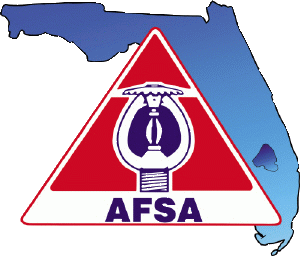 | | AMERICAN FIRE SPRINKLER ASSN |
Despite the fact that associations around the State are still reeling from the horrific results of the last two hurricane seasons and are scrambling to pay for increased insurance premiums, uninsured losses and repairs, the Plumbers and Pipefitters Union, the American Fire Sprinkler Association, the Florida Fire Sprinkler Association and the Fire Marshals Association have now vowed to seek a gubernatorial veto of this bill solely because of the retrofit extension. Notwithstanding that every Florida legislator voted to extend the installation deadline for the controversial sprinkler legislation, those benefiting financially refuse to postpone their big payday.
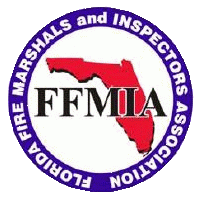 Requiring owners to address the additional expense of a �compromise� fire safety system of questionable benefit at this time is tantamount to an eviction notice for thousands of financially besieged homeowners. Associations desperately need the time to address life safety issues effectively, without having to choose between them or force fixed income owners to relocate. By giving Associations until 2025 to comply; the legislature sought to afford them the time to accumulate the resources to install effective fire safety systems, not some �minimum alternative� political compromise and certainly not at the expense of sacrificing protection from Hurricanes. By 2025, the National Hurricane Center�s predicted meteorological hurricane cycle we currently suffer through will have passed and the bulk of the financed recovery expenses will have been addressed. Nonetheless, at a $million + per Association, the sprinkler legislation�s beneficiaries want the expected $billions in sprinkler sales and installations by 2014, not 2025. Requiring owners to address the additional expense of a �compromise� fire safety system of questionable benefit at this time is tantamount to an eviction notice for thousands of financially besieged homeowners. Associations desperately need the time to address life safety issues effectively, without having to choose between them or force fixed income owners to relocate. By giving Associations until 2025 to comply; the legislature sought to afford them the time to accumulate the resources to install effective fire safety systems, not some �minimum alternative� political compromise and certainly not at the expense of sacrificing protection from Hurricanes. By 2025, the National Hurricane Center�s predicted meteorological hurricane cycle we currently suffer through will have passed and the bulk of the financed recovery expenses will have been addressed. Nonetheless, at a $million + per Association, the sprinkler legislation�s beneficiaries want the expected $billions in sprinkler sales and installations by 2014, not 2025.
 | | GOVERNOR JEB BUSH |
Since lawmakers wouldn�t accede to the self-serving supplications of the Plumbers and Pipefitters Union or the Fire Sprinkler Associations to subvert the bill and add to the unprecedented burden already shouldered by homeowners, they enlisted the aid of the State Fire Marshals Association to represent their interests. Having failed to force the deadline extension�s elimination in the legislative committees, the Fire Marshals and their lobbyists have turned their attentions to the Governor, threatening to bring unparalleled pressure to bear on the Governor to veto the bill.
 If we are to stave off such a veto, we must send thousands of emails to Governor Bush urging him to sign HB 391 into law and to resist attempts to veto this bill � ASAP! The universally supported bill only asks for more time to install these costly sprinkler retrofits while still digging out � literally � from the effects of multiple hurricanes. Please contact Governor Bush at [email protected] and copy the Secretary of the DBPR (Department of Business and Professional Regulations), Simone Marstiller, at [email protected]. For those who do not have computers, please call the Governor�s Office at 850-488-2272. It is imperative that the Governor�s Office hear from community association members on this very beneficial bill. If we are to stave off such a veto, we must send thousands of emails to Governor Bush urging him to sign HB 391 into law and to resist attempts to veto this bill � ASAP! The universally supported bill only asks for more time to install these costly sprinkler retrofits while still digging out � literally � from the effects of multiple hurricanes. Please contact Governor Bush at [email protected] and copy the Secretary of the DBPR (Department of Business and Professional Regulations), Simone Marstiller, at [email protected]. For those who do not have computers, please call the Governor�s Office at 850-488-2272. It is imperative that the Governor�s Office hear from community association members on this very beneficial bill.
Its Time T Act! Act!

  Its time to act! Please send an email to Governor Jeb Bush encouraging his enacting HB 391. Either copy the email or send another one to to Simone Marstiller, Secretary of the DBPR (Department of Business and Professional Regulations). The email links below already have the Subject Line filled with �Please enact HB 391�. Its time to act! Please send an email to Governor Jeb Bush encouraging his enacting HB 391. Either copy the email or send another one to to Simone Marstiller, Secretary of the DBPR (Department of Business and Professional Regulations). The email links below already have the Subject Line filled with �Please enact HB 391�.
Not to sure about emails? No problem! Call the Governor�s Office at 850-488-2272 and relate your support for HB 391.
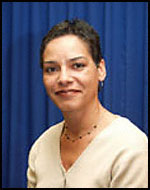 | DBPR SECRETARY
SIMONE MARSTILLER |
Who is Simone Marstiller? - Before serving as deputy chief of staff for Governor Jeb Bush, Simone Marstiller was general counsel for the Department of Management Services from October 2002 to June 2003, and was interim secretary of the department from January 2003 to April 2003. After she serving as deputy chief of staff for the Governor, she went to the State Technology Office (STO) as Florida CIO. The State Technology Office lost funding in the budget last July, resulting in the elimination of 26 positions, including CIO Simone Marstiller. About 156 high-tech workers were transferred to the state's Department of Management Services. Created by Gov. Jeb Bush in 1998, the scandal-plagued STO was closed after an audit revealed conflicts and irregularities with contracts awarded by the STO. On August 13, 2005, Governor Bush asked Marstiller to lead the Department of Business and Professional Regulation.
To understand the history of the Fire Safety legislation addressed in HB 391, Click Here. To learn more about the relationship among the organizations in the sprinkler alliance, See Below.
Strange Bedfellows!
Fire Safety Legislation Summary

May 14, 2006 - Five years ago, the Florida Legislature passed a clandestine bill requiring every Florida Association housed in a structure 75 feet above grade to install a Full Sprinkler System or, alternatively, establish an acceptable �Alternative Minimum Life Safety System�. Scrutiny of the new law revealed it to be a $multi-billion payday for certain vested interests instead of effective fire protection. This �midnight legislation� was supported by three vested interests, the Plumbers and Pipefitters Union, the American Fire Sprinkler Association, the Florida Fire Sprinkler Association and the Fire Marshals Association (FFMIA). While the State Fire Marshals are motivated by altruistic intentions for both firefighters and the general public, the legislation�s details (wherein the devil resides) were the handiwork of the bill�s major sponsors. Not surprisingly, the Plumbers and Pipefitters Union and the Florida and American Fire Sprinkler Associations (well-financed trade organizations) were intent on creating a need for the sale and installation of $billions in plumbing equipment.
 Since the major cause of fire-related deaths is from smoke inhalation and property loss from water damage drives insurance companies to distraction, the law to impregnate every high rise building in Florida with sprinklers was, at best, incomplete. Following a State-wide outcry against the suspect $multi-billion expenditure, the legislation was somewhat modified to allow Associations and their Fire Safety Engineers to compose effective Fire Safety systems (the �opt-out amendment�) instead of the questionable $multi-billion sprinkler retrofit. However, the opt-out amendment that passed over the virulent objections by the Plumbers and Pipefitters Union and the Fire Sprinkler Associations still requires that Community Associations retrofit every unit foyer and common area with sprinklers by 2014. Since the major cause of fire-related deaths is from smoke inhalation and property loss from water damage drives insurance companies to distraction, the law to impregnate every high rise building in Florida with sprinklers was, at best, incomplete. Following a State-wide outcry against the suspect $multi-billion expenditure, the legislation was somewhat modified to allow Associations and their Fire Safety Engineers to compose effective Fire Safety systems (the �opt-out amendment�) instead of the questionable $multi-billion sprinkler retrofit. However, the opt-out amendment that passed over the virulent objections by the Plumbers and Pipefitters Union and the Fire Sprinkler Associations still requires that Community Associations retrofit every unit foyer and common area with sprinklers by 2014.
 | | VESDA Aspirating Smoke Detector |
Technological advances over the past few years have introduced acceptably safe alternatives to �the sprinklering of common areas�. Intelligent Fire Detection and Alarm systems (VESDA--Very Early Smoke Detecting Apparatus - an air-sampling smoke-detection system that collects and analyzes room air conditions and identifies incipient fire development prior to visible smoke), automatic elevator recall systems, redundant control panels, code-surpassing containment features (firewalls, stairwells, doors, etc.) and dedicated building-wide communications (annunciator contact with units) would provide substantially greater safety at less cost than a half ton of plumbing supplies in your foyer. A mechanical ratchet device recently demonstrated at the Broward County Fire Academy turns every window, balcony or catwalk into a viable escape egress. Subsequent to the original sprinkler mandate, the initial pork barrel payday was being legislatively modified into effective protection. However, the sprinkler vendors are chaffing at the bit to retrofit every unit foyer and hallway with sprinklers before acceptable alternatives render them superfluous.
 | | AMERICAN FIRE SPRINKLER ASSN |
Politics is an oft postulated stewpot for strange bedfellows. The various proponents of the sprinkler law are fueled by different objectives. While Fire Marshals are primarily guided by their aspiration to save lives, their partners in this venture have a huge financial stake in preserving those parts of the statute that require the purchase and installation of $billions in fire sprinkler equipment and its adjunctive plumbing. Despite their differing motives, the political components of their representative organizations have forged an alliance in furtherance of their respective agendas. The value of each party to the alliance is measured by the resources they can contribute to their mutual objective. While the Plumbers and Pipefitters and the Sprinkler Associations bring deep pockets to the table, the Fire Marshals can deliver public and political credibility.
 | | NATIONAL FIRE SPRINKLER ASSN |
When financial resources were necessary to satisfy political accommodations made by their lobbyists while aligning support for the sprinkler law, the Sprinkler Association did the heavy lifting. When the coalition decided to oppose badly needed popular legislation such as House Bill 391, only the Fire Marshals had the credibility necessary to weather the resulting public suspicion and antipathy. As such, the Fire Marshals donned their dress uniforms, converged on the Capitol and fought to expunge the threatened delay to their partners� payday. Despite their efforts, the legislature favorably passed HB 391 by a 113 to 0 vote in the House and 40 to 0 in the Senate.
This created an additional dilemma. Since Fire-Rescue personnel were at the forefront of every municipal and county hurricane recovery effort, Fire Marshals are intimately familiar with the damage suffered by the homeowners seeking relief brought by the bill�s deadline extension. If successful at defeating the extension, they would force homeowners to neglect critical hurricane recovery and protection in favor of the questionable fire protection afforded by installing sprinklers in unit foyers and certain common areas. On the face of it, this trade-off is absurd. While no sane human being advocates that dangerous firetraps be excluded from complying with the Fire code, the one-size-fits-all nature of the legislation precludes the Fire Marshals from distinguishing between dangerous tinder box structures and Associations fully compliant with all Fire and Safety codes. The danger to life and property from the upcoming hurricane season far outweighs the comparable threat posed by next year�s possible fires in unit foyers and hallways of structures with hi-tech detection and alarm, automatic elevator recall, code compliant containment and building-wide communications.
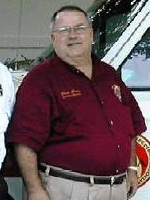 | CHUCK AKERS - EXECUTIVE
DIRECTOR - FFMIA & AFSA |
Having seen the suffering caused by hurricanes and fires, most rational Fire Marshals outside the political arena would favor a solution that addressed both life safety issues as opposed to supporting one at the expense of another. While explaining the rationale for HB 391�s sprinkler deadline extension, legislators apprised the Fire Marshals that when limited resources are available to address multiple life safety issues, allocation is prioritized according to the imminence and danger portended by each threat. When confronted by legislators with the inherent imbalance in their priorities, the Fire Marshals failed to convince them that investing scarce Association resources in limited sprinklers would yield a more productive safety benefit than a comparable investment in hurricane protection.
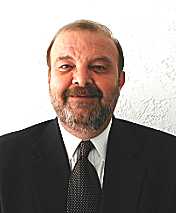 | FORMER FFMIA PRESIDENT
STEVEN RANDALL - NFSA
FLA. REGIONAL DIRECTOR |
Unfortunately, fulfilling their responsibility to the alliance has compromised the Fire Marshals� perspective and clouded their motives. Two items in the Fire Marshals� October 2005 Newsletter shed light on the basis for their alliance. In his page 3 article, �From the Director�s Chair... �, Executive Director Chuck Akers of the Florida Fire Marshals and Inspectors Association states, �Have you ever been to the Business Meeting at the conference and hear Rick Butcher, the Secretary/ Treasurer for the association give his report. YOUR organization is out of money? Now, how crazy is that? What in the world does the Executive Board do with all that money they raise from the Fire Prevention and Fire and Life Safety Educators Conference along with the membership monies?� In another article on page 18, �Partnerships, How Important are They?�, Akers states, �As our organization continues to grow, partnerships carry a more important role. We have successfully partnered with and continue to work legislatively with our friends from the Florida Fire Sprinkler Association and the American Fire Sprinkler Association.� Not surprisingly, Akers is also the Executive Director of the American Fire Sprinkler Association. Other key Fire Marshals Association officials are also employed by the National Fire Sprinkler Association, another sprinkler trade organization behind the original legislation. FFMIA Past President and lifetime member Steven Randall is also the Florida Regional Manager of the National Fire Sprinkler Association (AKA Florida Fire Sprinkler Association). FFMIA lifetime member Buddy Dewar also serves as the National Fire Sprinkler Association�s Director of Regional Operations.
 | FFMIA Official BUDDY DEWAR
also NFSA�s DIRECTOR of
REGIONAL OPERATIONS |
The Fire Marshals found themselves in the precarious position of having to choose between their commitment to the public or to their alliance partners. It appears as if they have made their decision. They have vowed to pressure the Governor into applying a veto to HB 391 for the sole purpose of overturning the deadline extension.
 | FORT LAUDERDALE FIRE
MARSHAL STEVE KASTNER |
An unfortunate consequence of this political accommodation will be the diminished credibility for many of the excellent and ethical Fire Marshals across the State. Fort Lauderdale Fire Marshal Steve Kastner has been a bulwark against the catastrophic effects of the past season�s hurricanes. Within 48 hours after Hurricane Wilma, he sent 3-man emergency service teams to every high-rise in the Galt Mile neighborhood to check on possible medical shut-ins, invalids or isolated elderly residents. He has also kept his promise to meet with any Association with questions about or problems with code compliance. To help mitigate damage from the questionable actions taken by the Fire Marshals Association in trying to pressure the Governor to veto a bill unanimously passed and universally supported, the august membership of that organization might reconsider the wisdom of serving as the public face of their alliance. After all, while their partners will continue to be flush with financial resources, the Fire Marshals� most valuable asset is their credibility.
Click To Top of Page
Sprinklers in the Foyer
  
Bogdanoff and Jones Revisit Sprinkler Extension

 April 23, 2009 - Seven years ago, the Florida Legislature passed a clandestine bill requiring every Florida Association housed in a structure 75 feet above grade to install a Full Sprinkler System or, alternatively, establish an acceptable �Engineered Life Safety System�. Scrutiny of the new law revealed it to be a $multi-billion payday for certain vested interests instead of effective fire protection. Drafted by the American Fire Sprinkler Association and the Florida Fire Sprinkler Association with input from the Plumbers and Pipefitters Union, glaringly absent from this �midnight legislation� were any studies or research clarifying its impact on condominium owners. April 23, 2009 - Seven years ago, the Florida Legislature passed a clandestine bill requiring every Florida Association housed in a structure 75 feet above grade to install a Full Sprinkler System or, alternatively, establish an acceptable �Engineered Life Safety System�. Scrutiny of the new law revealed it to be a $multi-billion payday for certain vested interests instead of effective fire protection. Drafted by the American Fire Sprinkler Association and the Florida Fire Sprinkler Association with input from the Plumbers and Pipefitters Union, glaringly absent from this �midnight legislation� were any studies or research clarifying its impact on condominium owners.
 When initially filed in 2002, certain representatives from the Florida Fire Marshals and Inspectors Association (FFMIA) called on legislators to pass this bill as a testament to their concern for the safety of our heroic firefighters. Instead of presenting authoritative documentation demonstrating that a variety of different fire safety solutions should be tailored to a structure�s material composition, size, entry and egress, construction features and existing fire safety elements, the impressively uniformed lobbyists convinced lawmakers that sprinkler retrofits were a fire safety panacea for every condominium. When initially filed in 2002, certain representatives from the Florida Fire Marshals and Inspectors Association (FFMIA) called on legislators to pass this bill as a testament to their concern for the safety of our heroic firefighters. Instead of presenting authoritative documentation demonstrating that a variety of different fire safety solutions should be tailored to a structure�s material composition, size, entry and egress, construction features and existing fire safety elements, the impressively uniformed lobbyists convinced lawmakers that sprinkler retrofits were a fire safety panacea for every condominium.
 | CHUCK AKERS - EXECUTIVE
DIRECTOR - FFMIA & AFSA
|
Not surprisingly, many of the uniformed retrofit proponents were receiving two paychecks. Executive Director Chuck Akers of the Florida Fire Marshals and Inspectors Association is also the Executive Director of the American Fire Sprinkler Association, an industry trade group responsible for boosting sprinkler sales. Other key Fire Marshals Association officials are also employed by the National Fire Sprinkler Association, another sprinkler trade organization behind the original legislation. FFMIA Past President and lifetime member Steven Randall is also the South Central Regional Manager of the National Fire Sprinkler Association (AKA Florida Fire Sprinkler Association). FFMIA lifetime member Buddy Dewar also serves as the National Fire Sprinkler Association�s Director of Regional Operations.
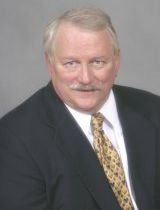 | FFMIA's & NFSA's
BUDDY DEWAR |
Following a State-wide outcry against the suspect expenditure, the legislation was subsequently modified to allow condo owners to �Opt Out� of retrofitting their units �by the affirmative vote of two-thirds of all voting interests�. The opt-out provision, passed over the virulent objections of lobbyists for the Plumbers and Pipefitters Union and the Fire Sprinkler Associations, allowed Associations and their Fire Safety Engineers to tailor a �Minimum Alternative Life Safety System� instead of the budget busting sprinkler retrofit. As a concession to the lobbying interests, the corrective legislation required Fire Safety Engineers to add sprinkler retrofits in every unit foyer and common area when designing a comprehensive Fire Protection plan for an association.
 The serial hurricanes of 2004 and 2005 changed the world for Florida condominium owners, forcing associations across the state to wrestle with a litany of critical expenses. In a competition of life safety projects, the �Towering Inferno� scenarios used by lobbyists to market the sprinkler retrofits in Tallahassee were measured against the prospect of being sucked out of a 14th floor window. In addition to addressing two critically important life safety issues, condo owners had to upgrade 30 year-old elevators, 30 year-old parking decks, 30 year-old HVAC risers, 30 year-old roofs and face down a host of other important maintenance challenges. Having witnessed the ruinous devastation wrought by the hurricanes, local fire marshals across the state were at the forefront of promoting the immediate need for hurricane mitigation to save lives. The serial hurricanes of 2004 and 2005 changed the world for Florida condominium owners, forcing associations across the state to wrestle with a litany of critical expenses. In a competition of life safety projects, the �Towering Inferno� scenarios used by lobbyists to market the sprinkler retrofits in Tallahassee were measured against the prospect of being sucked out of a 14th floor window. In addition to addressing two critically important life safety issues, condo owners had to upgrade 30 year-old elevators, 30 year-old parking decks, 30 year-old HVAC risers, 30 year-old roofs and face down a host of other important maintenance challenges. Having witnessed the ruinous devastation wrought by the hurricanes, local fire marshals across the state were at the forefront of promoting the immediate need for hurricane mitigation to save lives.
 | | OCEAN MANOR AFTER HURRICANE WILMA |
Forced to pay $millions for code compliant upgrades required by windstorm insurance carriers, additional $millions for deductibles, uninsured losses and suddenly trebled insurance premiums, many Associations had to scramble to secure a combination of short and long-term (15 - 20 year) financing to preclude a mass exodus of fixed-income residents unable to pay the unanticipated assessments. Reserves that were rededicated for emergency use in special legislative sessions are long gone. While some associations have already spent fortunes retrofitting every exterior exposure with impact rated windows and doors and/or code-compliant shuttering systems, most are still actively engaged in their installation or the planning stages for this objective.
 | REPRESENTATIVE
CARL DOMINO |
In view of the crushing fiscal hardship suffered by Associations from the hurricanes, the legislature passed a bill to help besieged condominium owners survive the untenable financial squeeze. In 2006, House Bill 391 by Representative Carl Domino extended the deadline to retrofit high rise unit foyers and common areas with sprinklers from the current 2014 to 2025. The extra decade would afford unit owners an opportunity to amortize their association�s bloated debt service before paying another sizable assessment. After successfully surviving comprehensive committee reviews in both legislative bodies, HB 391 was passed out of the House by a vote of 113 Yeas vs. 0 Nays and was passed out of the Senate by a vote of 40 Yeas vs. 0 Nays. Retrofit lobbyists failed to convince lawmakers that investing scarce association resources in limited sprinklers would yield a more productive safety benefit than a comparable investment in hurricane protection. Despite its unanimous support and passage, Governor Bush surprised condo owners by vetoing the bill, pointing out the absence of any official study examining how retrofit costs will impact condominium owners.
 When the housing market collapsed last year, the recessionary impact on common interest communities was catastrophic. Assessment expenses that were previously fiscally precipitous suddenly slipped beyond the reach of financially strapped homeowners. In some associations, maintenance assessments were increased by 50% to pay down short term bridge loans required to return the property to habitability. When droves of homeowners abandoned their suddenly unaffordable properties to foreclosure, banks deliberately delayed taking title to dodge assessment obligations. The resulting association budget shortfalls were assessed to every unit owner. Projects not mandated in an association�s documents or not deemed operationally critical were postponed until 2011, 2012, 2013, etc. To help keep significant numbers of mostly elderly residents in their homes, urgently needed hurricane mitigation and other �life safety projects� were either suspended or enabled by additional (3rd or 4th) layers of multi-year bank financing. When the housing market collapsed last year, the recessionary impact on common interest communities was catastrophic. Assessment expenses that were previously fiscally precipitous suddenly slipped beyond the reach of financially strapped homeowners. In some associations, maintenance assessments were increased by 50% to pay down short term bridge loans required to return the property to habitability. When droves of homeowners abandoned their suddenly unaffordable properties to foreclosure, banks deliberately delayed taking title to dodge assessment obligations. The resulting association budget shortfalls were assessed to every unit owner. Projects not mandated in an association�s documents or not deemed operationally critical were postponed until 2011, 2012, 2013, etc. To help keep significant numbers of mostly elderly residents in their homes, urgently needed hurricane mitigation and other �life safety projects� were either suspended or enabled by additional (3rd or 4th) layers of multi-year bank financing.
 When Fannie Mae raised fees for Florida mortgages purchased or securitized on or after April 1, 2009, Director Lockhart declared that after reviewing their mortgage loans, they discovered record-high default and foreclosure rates among Florida condo owners. This unprecedented series of economic reversals is forcing Florida condo owners to measure the necessity for addressing even critical needs against a prospective foreclosure followed by bankruptcy proceedings. How many unit owners in your building will be forced to move if burdened with a $10,000 to $20,000 assessment? When Fannie Mae raised fees for Florida mortgages purchased or securitized on or after April 1, 2009, Director Lockhart declared that after reviewing their mortgage loans, they discovered record-high default and foreclosure rates among Florida condo owners. This unprecedented series of economic reversals is forcing Florida condo owners to measure the necessity for addressing even critical needs against a prospective foreclosure followed by bankruptcy proceedings. How many unit owners in your building will be forced to move if burdened with a $10,000 to $20,000 assessment?
 | | ELLYN BOGDANOFF FILES HB 419 |
Representatives Ellyn Bogdanoff and Matt Hudson filed House Bill 419 (HB 419), another bill that extends the 2014 sprinkler retrofit deadline to 2025. Two issues catapult this bill to critical passage status. The cost of retrofitting a high rise condominium building with a �Minimum Alternative Life Safety System� is astronomical. Recent bids for 200 to 300 member associations range from $1.4 million to $4.76 million. Basic retrofit costs run from $40/m2 ($3.75/ft2) to $65/m2($6/ft2) for common areas, hallways, stairwells and the foyer in every unit. The National Fire Sprinkler Association acknowledges costs as high as $108/m2 ($10/ft2). Local fire safety engineers point out that the dropped ceilings, drywalls and construction elements required to hide the steel, copper or CPVC will proportionately increase installation costs. Associations in which every unit has two completely different egresses to ground level are exempt. Sorry, two outlets to the same hallway doesn�t qualify.
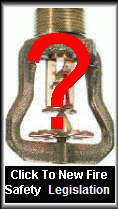 The �Alternative Minimum Life Safety System� as mandated by statute was never intended for extinguishing fires. Its stated objective is to provide a moderately safe egress. It is only one of many layers of fire protection in an engineered fire safety plan. Since effective early detection and containment will save far more lives than the sprinklers placed in unit foyers and certain common areas (as required for an Alternative Minimum Life Safety Plan), they are arguably more important components to any integrated fire safety system. The �Alternative Minimum Life Safety System� as mandated by statute was never intended for extinguishing fires. Its stated objective is to provide a moderately safe egress. It is only one of many layers of fire protection in an engineered fire safety plan. Since effective early detection and containment will save far more lives than the sprinklers placed in unit foyers and certain common areas (as required for an Alternative Minimum Life Safety Plan), they are arguably more important components to any integrated fire safety system.
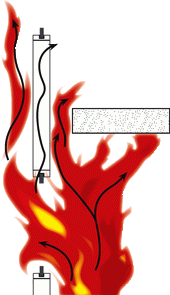 | | COMPARTMENTATION |
The bill was written before several generations of new technology seriously dated many of the mandate�s precepts. Many of our buildings are ideally adapted to Compartmentation - fire resistance rated (1, 2 or 3 hours) assemblies, with smoke treatments, that contain the fire to the room of origin until Fire-Rescue arrives. If these �compartments� are sealed against fire/smoke spread with fire/smoke dampers (which restrict air movement in ducts), firestopping penetrations, fire doors and other safety features, they become a far more effective protection protocol - without risking building-wide water damage.
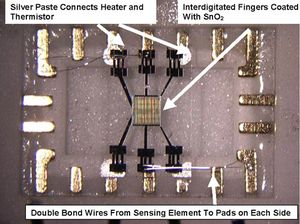 | | MICROSCALE NANOCRYSTALLINE TIN OXIDE DETECTOR |
It also predates various emerging sensor technologies (e.g., computer vision system, distributed fiber optic temperature sensor, and intelligent multiple sensor), signal processing and monitoring technology (e.g., real-time control via Internet) and integrated fire detection systems. By centralizing signal processing on the detector�s circuit board, giving each detector its own central processing unit (CPU) and software storage, it can pass information to a central panel when polled or upon sensing a fire. Smart detection and alarm systems based on neural network technology can be integrated into building automation and control systems using a gateway to preserve the integrity of the fire safety system.
 | MICROSCALE AND TRADITIONAL
MACROSCALE CLASSIFIERS |
Benefits include smoke control (managing variable air volumes via existing HVAC systems), single seat access to building information, easier maintenance, sharing sensor data, obtaining information about the location and status of people during an emergency, two-way voice communications with every unit�s occupants and real-time data about their environment and condition. The same data can be made available for any unoccupied areas of the building, allowing firefighters to effectively assess conditions at or en route to any occupant�s location.
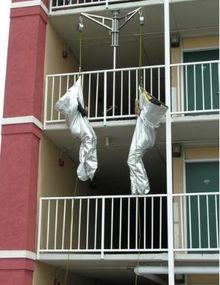 | MECHANICAL RATCHET
FIRE ESCAPE DEVISE |
A mechanical ratchet device that turns every window, balcony or catwalk into a viable escape egress was demonstrated and endorsed several times since 2006 at the Broward County Fire Academy. While the safety features inherent in these improvements are light years ahead of �sprinkler retrofits in unit foyers,� they portend no $billion payday for the legislation�s commercial supporters.
 HB 419 carries an added value. The legislation passed last year that enabled associations to create self-insurance windstorm trusts was subject to oversight by the Florida Office of Insurance Regulation (OIR). Unfortunately, the legislature never notified the OIR that the business structure of these self-insurance trusts was designed to save participating associations money by eliminating the need to fund the corporate profits that fuel commercial carriers. When the OIR went looking for the profit centers ordinarily evident in commercial carriers, they were surprised to find none. In a Twilight Zone moment, OIR insisted that the trust assess every member for the sole purpose of creating the profit centers that the trust was legislatively empowered to dispense with. Despite the trust's proof that they carried reinsurance coverage exceeding that of Citizens and OIR requirements, OIR bureaucrats explained that they measured carrier viability from the perspective of investors, not client-customers. In self-insurance trusts, the investors are the client-customers. HB 419 carries an added value. The legislation passed last year that enabled associations to create self-insurance windstorm trusts was subject to oversight by the Florida Office of Insurance Regulation (OIR). Unfortunately, the legislature never notified the OIR that the business structure of these self-insurance trusts was designed to save participating associations money by eliminating the need to fund the corporate profits that fuel commercial carriers. When the OIR went looking for the profit centers ordinarily evident in commercial carriers, they were surprised to find none. In a Twilight Zone moment, OIR insisted that the trust assess every member for the sole purpose of creating the profit centers that the trust was legislatively empowered to dispense with. Despite the trust's proof that they carried reinsurance coverage exceeding that of Citizens and OIR requirements, OIR bureaucrats explained that they measured carrier viability from the perspective of investors, not client-customers. In self-insurance trusts, the investors are the client-customers.
 | INSURANCE COMMISSIONER
KEVIN MCCARTY |
Since trust participants saved $millions in premiums last year, dozens of other associations have requested membership. Until the catch-22 dilemma with OIR is resolved, the trust was precluded from accepting new members. GMCA President Pio Ieraci traveled to Tallahassee and met with the enabling legislators, the trustees, representatives from OIR, Senate President Jeffrey Atwater, Statehouse Representative Ellyn Bogdanoff and Insurance Commissioner Kevin McCarty. Participants agreed that the legislature needed to create an alternative methodology for measuring the viability of carriers that aren�t profit-based. By OIR�s current standard, every non-profit NGO worldwide is a failed enterprise. HB 419 contains the language that cures this dilemma.
 Until April 15th, there was no corresponding legislation in the Senate. Senator David Aronberg finally offered an amendment adding the required language to Senate Bill 714 (SB 714), filed by Senator Dennis Jones and co-introduced by Senators Mike Fasano and Jeremy Ring. Until April 15th, there was no corresponding legislation in the Senate. Senator David Aronberg finally offered an amendment adding the required language to Senate Bill 714 (SB 714), filed by Senator Dennis Jones and co-introduced by Senators Mike Fasano and Jeremy Ring.
So here�s the deal. We either convince the Statehouse to pass HB 419, the Senate to pass SB 714 and the Governor to sign the legislation or prepare to pay a gargantuan assessment for a sprinkler head in your foyer, sprinkler heads down your hallways and sprinkler heads peppering the association�s lobby ceiling � virtual hotbeds of spontaneous combustion.
Make Your Voice Heard
Alert Our Florida Representatives and Senators

 To send emails to any or every Senator and any or every Statehouse Representative, first go to the Community Advocacy Network (CAN) web site and login using your email address and Password: 35707. Then Click on Capitol Connection on the left sidebar. The rest is intuitive! Click Here to CAN Member Login. To send emails to any or every Senator and any or every Statehouse Representative, first go to the Community Advocacy Network (CAN) web site and login using your email address and Password: 35707. Then Click on Capitol Connection on the left sidebar. The rest is intuitive! Click Here to CAN Member Login.
 If you prefer, you can send emails the old fashioned way to: If you prefer, you can send emails the old fashioned way to:
Click To Top of Page
SB 714  Vetoed! Vetoed!

Crist Crushes Sprinkler Retrofit Extension

 | | ELLYN BOGDANOFF FILES HB 419 |
June 11, 2009 - On January 16, 2009, Statehouse Representative Ellyn Bogdanoff filed House Bill 419. Its sister bill, Senate Bill 714 filed by Senator Dennis Jones, was ultimately substituted for HB 419 as the session wound down. Popularly known as the association �glitch� bill, SB 714 sought to reverse some of the counterproductive and/or expensive regulations that were piggy-backed onto large omnibus association and insurance bills during the final frantic week of the 2008 session (HB 601). Filed to correct a host of poorly drafted, contradictory or unworkable regulations, its provisions addressed a wide range of association issues including insurance, board elections, fire sprinklers, fire alarm systems, Timeshare Condominiums and back-up generators for elevators.
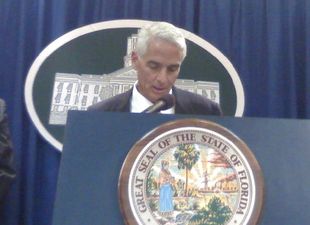 | | GOVERNOR CRIST ANNOUNCES SB 714 VETO |
On June 1, 2009, Governor Crist sent millions of Florida association members heading for the Rolaids by vetoing SB 714. The legislation would have relieved condominium unit owners from being forced to purchase individual property insurance and likewise relieved Associations from the burden of eliciting proof that the insurance was purchased. It would also have eliminated the right of associations to �force place� such coverage if the unit owner failed to produce an insurance certificate. Due to the veto, an association can still unilaterally purchase unit owner property insurance and assess the cost to any unit owner - without consent. Unit owner coverage will continue to be mandatory and still requires at least $2,000 of �special assessment� coverage � although such a product does not exist! SB 714 would have redrafted the language to �loss assessment� insurance and clarified that it is excess coverage, curing a defect that allows insurance companies to require a second deductible for property damaged during an event. Benefit checks issued by your carrier for damage to your unit can be sent to your association since the association must still be named an additional insured and loss payee on your insurance policy.
 Unit Owners are still required to insure �improvements and additions� that benefit fewer than all the owners. Since current law fails to define �improvements and additions,� this may or may not include balconies, fixed balcony appurtenances, vehicle enclosures such as carports, storage spaces and other building elements whose designations hover between �limited common areas� and �private property�. Unit Owners are still required to insure �improvements and additions� that benefit fewer than all the owners. Since current law fails to define �improvements and additions,� this may or may not include balconies, fixed balcony appurtenances, vehicle enclosures such as carports, storage spaces and other building elements whose designations hover between �limited common areas� and �private property�.
 SB 714 also would have exempted some single and two-story buildings with an "exterior means of egress corridor" from being forced to install an expensive manual fire alarm system, despite the National Fire Protection Association (Subdivision 31.3.4.1.1, NFPA 101, Life Safety Code) deeming it unnecessary. SB 714 also would have exempted some single and two-story buildings with an "exterior means of egress corridor" from being forced to install an expensive manual fire alarm system, despite the National Fire Protection Association (Subdivision 31.3.4.1.1, NFPA 101, Life Safety Code) deeming it unnecessary.
Along with remediating these and other unintelligible and/or expensive �glitches� carried in current statute, the legislation also contained a long anticipated extension of a $multi-million fire sprinkler retrofit, postponing an onerous assessment from 2014 to 2025.
 Seven years ago, the Florida Legislature passed a clandestine bill requiring every Florida Association housed in a structure 75 feet above grade to install a Full Sprinkler System or, alternatively, establish an acceptable �Engineered Life Safety System�. Scrutiny of the new law revealed it to be a $multi-billion payday for certain vested interests instead of effective fire protection. Drafted by the American Fire Sprinkler Association and the Florida Fire Sprinkler Association with input from the Plumbers and Pipefitters Union, glaringly absent from this �midnight legislation� were any studies or research clarifying its impact on condominium owners. Seven years ago, the Florida Legislature passed a clandestine bill requiring every Florida Association housed in a structure 75 feet above grade to install a Full Sprinkler System or, alternatively, establish an acceptable �Engineered Life Safety System�. Scrutiny of the new law revealed it to be a $multi-billion payday for certain vested interests instead of effective fire protection. Drafted by the American Fire Sprinkler Association and the Florida Fire Sprinkler Association with input from the Plumbers and Pipefitters Union, glaringly absent from this �midnight legislation� were any studies or research clarifying its impact on condominium owners.
 When initially filed in 2002, certain representatives from the Florida Fire Marshals and Inspectors Association (FFMIA) called on legislators to pass this bill as a testament to their concern for the safety of our heroic firefighters. Instead of presenting authoritative documentation demonstrating that a variety of different fire safety solutions should be tailored to a structure�s material composition, size, entry and egress, construction features and existing fire safety elements, the impressively uniformed lobbyists convinced lawmakers that sprinkler retrofits were a fire safety panacea for every condominium. When initially filed in 2002, certain representatives from the Florida Fire Marshals and Inspectors Association (FFMIA) called on legislators to pass this bill as a testament to their concern for the safety of our heroic firefighters. Instead of presenting authoritative documentation demonstrating that a variety of different fire safety solutions should be tailored to a structure�s material composition, size, entry and egress, construction features and existing fire safety elements, the impressively uniformed lobbyists convinced lawmakers that sprinkler retrofits were a fire safety panacea for every condominium.
 | CHUCK AKERS - EXECUTIVE
DIRECTOR - FFMIA & AFSA
|
Not surprisingly, many of the uniformed retrofit proponents were receiving two paychecks. Executive Director Chuck Akers of the Florida Fire Marshals and Inspectors Association is also the Executive Director of the American Fire Sprinkler Association, an industry trade group responsible for boosting sprinkler sales. Other key Fire Marshals Association officials are also employed by the National Fire Sprinkler Association, another sprinkler trade organization behind the original legislation. FFMIA Past President and lifetime member Steven Randall is also the South Central Regional Manager of the National Fire Sprinkler Association (AKA Florida Fire Sprinkler Association). FFMIA lifetime member Buddy Dewar also serves as the National Fire Sprinkler Association�s Director of Regional Operations.
 | FFMIA's & NFSA's
BUDDY DEWAR |
Following a State-wide outcry against the suspect expenditure, the legislation was subsequently modified to allow condo owners to �Opt Out� of retrofitting their units �by the affirmative vote of two-thirds of all voting interests�. The opt-out provision, passed over the virulent objections of lobbyists for the Plumbers and Pipefitters Union and the Fire Sprinkler Associations, allowed Associations and their Fire Safety Engineers to tailor a �Minimum Alternative Life Safety System� instead of the budget busting sprinkler retrofit. As a concession to the lobbying interests, the corrective legislation required Fire Safety Engineers to add sprinkler retrofits in every unit foyer and common area when designing a comprehensive Fire Protection plan for an association.
 The serial hurricanes of 2004 and 2005 changed the world for Florida condominium owners, forcing associations across the state to wrestle with a litany of critical expenses. In a competition of life safety projects, the �Towering Inferno� scenarios used by lobbyists to market the sprinkler retrofits in Tallahassee were measured against the prospect of being sucked out of a 14th floor window. In addition to addressing two critically important life safety issues, condo owners had to upgrade 30 year-old elevators, 30 year-old parking decks, 30 year-old HVAC risers, 30 year-old roofs and face down a host of other important maintenance challenges. Having witnessed the ruinous devastation wrought by the hurricanes, local fire marshals across the state were at the forefront of promoting the immediate need for hurricane mitigation to save lives. The serial hurricanes of 2004 and 2005 changed the world for Florida condominium owners, forcing associations across the state to wrestle with a litany of critical expenses. In a competition of life safety projects, the �Towering Inferno� scenarios used by lobbyists to market the sprinkler retrofits in Tallahassee were measured against the prospect of being sucked out of a 14th floor window. In addition to addressing two critically important life safety issues, condo owners had to upgrade 30 year-old elevators, 30 year-old parking decks, 30 year-old HVAC risers, 30 year-old roofs and face down a host of other important maintenance challenges. Having witnessed the ruinous devastation wrought by the hurricanes, local fire marshals across the state were at the forefront of promoting the immediate need for hurricane mitigation to save lives.
 | | OCEAN MANOR AFTER HURRICANE WILMA |
Forced to pay $millions for code compliant upgrades required by windstorm insurance carriers, additional $millions for deductibles, uninsured losses and suddenly trebled insurance premiums, many Associations had to scramble to secure a combination of short and long-term (15 - 20 year) financing to preclude a mass exodus of fixed-income residents unable to pay the unanticipated assessments. Reserves that were rededicated for emergency use in special legislative sessions are long gone. While some associations have already spent fortunes retrofitting every exterior exposure with impact rated windows and doors and/or code-compliant shuttering systems, most are still actively engaged in their installation or the planning stages for this objective.
 | REPRESENTATIVE
CARL DOMINO |
In view of the crushing fiscal hardship suffered by Associations from the hurricanes, the legislature passed a bill to help besieged condominium owners survive the untenable financial squeeze. In 2006, House Bill 391 by Representative Carl Domino extended the deadline to retrofit high rise unit foyers and common areas with sprinklers from the current 2014 to 2025. The extra decade would afford unit owners an opportunity to amortize their association�s bloated debt service before paying another sizable assessment. After successfully surviving comprehensive committee reviews in both legislative bodies, HB 391 was passed out of the House by a vote of 113 Yeas vs. 0 Nays and was passed out of the Senate by a vote of 40 Yeas vs. 0 Nays. Retrofit lobbyists failed to convince lawmakers that investing scarce association resources in limited sprinklers would yield a more productive safety benefit than a comparable investment in hurricane protection. Despite its unanimous support and passage, Governor Bush surprised condo owners by vetoing the bill, pointing out the absence of any official study examining how retrofit costs will impact condominium owners.
 When the housing market collapsed last year, the recessionary impact on common interest communities was catastrophic. Assessment expenses that were previously fiscally precipitous suddenly slipped beyond the reach of financially strapped homeowners. In some associations, maintenance assessments were increased by 50% to pay down short term bridge loans required to return the property to habitability. When droves of homeowners abandoned their suddenly unaffordable properties to foreclosure, banks deliberately delayed taking title to dodge assessment obligations. The resulting association budget shortfalls were assessed to every unit owner. Projects not mandated in an association�s documents or not deemed operationally critical were postponed until 2011, 2012, 2013, etc. To help keep significant numbers of mostly elderly residents in their homes, urgently needed hurricane mitigation and other �life safety projects� were either suspended or enabled by additional (3rd or 4th) layers of multi-year bank financing. When the housing market collapsed last year, the recessionary impact on common interest communities was catastrophic. Assessment expenses that were previously fiscally precipitous suddenly slipped beyond the reach of financially strapped homeowners. In some associations, maintenance assessments were increased by 50% to pay down short term bridge loans required to return the property to habitability. When droves of homeowners abandoned their suddenly unaffordable properties to foreclosure, banks deliberately delayed taking title to dodge assessment obligations. The resulting association budget shortfalls were assessed to every unit owner. Projects not mandated in an association�s documents or not deemed operationally critical were postponed until 2011, 2012, 2013, etc. To help keep significant numbers of mostly elderly residents in their homes, urgently needed hurricane mitigation and other �life safety projects� were either suspended or enabled by additional (3rd or 4th) layers of multi-year bank financing.
 When Fannie Mae raised fees for Florida mortgages purchased or securitized on or after April 1, 2009, Director Lockhart declared that after reviewing their mortgage loans, they discovered record-high default and foreclosure rates among Florida condo owners. This unprecedented series of economic reversals is forcing Florida condo owners to measure the necessity for addressing even critical needs against a prospective foreclosure followed by bankruptcy proceedings. How many unit owners in your building will be forced to move if burdened with a $10,000 to $20,000 assessment? When Fannie Mae raised fees for Florida mortgages purchased or securitized on or after April 1, 2009, Director Lockhart declared that after reviewing their mortgage loans, they discovered record-high default and foreclosure rates among Florida condo owners. This unprecedented series of economic reversals is forcing Florida condo owners to measure the necessity for addressing even critical needs against a prospective foreclosure followed by bankruptcy proceedings. How many unit owners in your building will be forced to move if burdened with a $10,000 to $20,000 assessment?
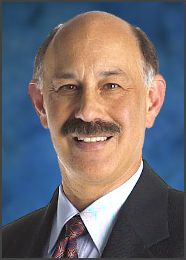 | | GARY POLIAKOFF |
When Crist vetoed SB 714, Association Attorney Gary A. Poliakoff of Becker & Poliakoff blasted the veto advice apparently accepted by the governor. In a letter to Crist, he asked, �With all due respect, exactly who did your advisors assume will be forced to pay the special assessments to retrofit a condominium where 40 percent to 50 percent of the units are in default in payment of their assessments, or in mortgage foreclosure?� How many unit owners in your building will be forced to move if burdened with another $8,000 to $20,000 assessment?
 The cost of retrofitting a high rise condominium building with a �Minimum Alternative Life Safety System� is astronomical. Recent bids for 200 to 400 member associations range from $1.4 million to $4.76 million. Basic retrofit costs run from $40/m2 ($3.75/ft2) to $65/m2 ($6/ft2) for common areas, hallways, stairwells and the foyer in every unit. The National Fire Sprinkler Association acknowledges costs as high as $108/m2 ($10/ft2). President Steve Muncy of the Dallas-based American Fire Sprinkler Association pegged the cost of high rise retrofits between $54/m2 ($5/ft2) and $162/m2 ($15/ft2). Local fire safety engineers point out that the dropped ceilings, drywalls and construction elements required to hide the steel, copper or CPVC will proportionately increase installation costs. Associations in which every unit has two completely different egresses to ground level are exempt. Sorry, two outlets to the same hallway doesn�t qualify. The cost of retrofitting a high rise condominium building with a �Minimum Alternative Life Safety System� is astronomical. Recent bids for 200 to 400 member associations range from $1.4 million to $4.76 million. Basic retrofit costs run from $40/m2 ($3.75/ft2) to $65/m2 ($6/ft2) for common areas, hallways, stairwells and the foyer in every unit. The National Fire Sprinkler Association acknowledges costs as high as $108/m2 ($10/ft2). President Steve Muncy of the Dallas-based American Fire Sprinkler Association pegged the cost of high rise retrofits between $54/m2 ($5/ft2) and $162/m2 ($15/ft2). Local fire safety engineers point out that the dropped ceilings, drywalls and construction elements required to hide the steel, copper or CPVC will proportionately increase installation costs. Associations in which every unit has two completely different egresses to ground level are exempt. Sorry, two outlets to the same hallway doesn�t qualify.
 The �Alternative Minimum Life Safety System� as mandated by statute was never intended for extinguishing fires. Its stated objective is to provide a moderately safe egress. It is only one of many layers of fire protection in an engineered fire safety plan. Since effective early detection and containment will save far more lives than the sprinklers placed in unit foyers and certain common areas (as required for an Alternative Minimum Life Safety Plan), they are arguably more important components to any integrated fire safety system. The �Alternative Minimum Life Safety System� as mandated by statute was never intended for extinguishing fires. Its stated objective is to provide a moderately safe egress. It is only one of many layers of fire protection in an engineered fire safety plan. Since effective early detection and containment will save far more lives than the sprinklers placed in unit foyers and certain common areas (as required for an Alternative Minimum Life Safety Plan), they are arguably more important components to any integrated fire safety system.
 | | COMPARTMENTATION |
The bill was written before several generations of new technology seriously dated many of the mandate�s precepts. Many of our buildings are ideally adapted to Compartmentation - fire resistance rated (1, 2 or 3 hours) assemblies, with smoke treatments, that contain the fire to the room of origin until Fire-Rescue arrives. If these �compartments� are sealed against fire/smoke spread with fire/smoke dampers (which restrict air movement in ducts), firestopping penetrations, fire doors and other safety features, they become a far more effective protection protocol - without risking building-wide water damage.
 | | MICROSCALE NANOCRYSTALLINE TIN OXIDE DETECTOR |
It also predates various emerging sensor technologies (e.g., computer vision system, distributed fiber optic temperature sensor, and intelligent multiple sensor), signal processing and monitoring technology (e.g., real-time control via Internet) and integrated fire detection systems. By centralizing signal processing on the detector�s circuit board, giving each detector its own central processing unit (CPU) and software storage, it can pass information to a central panel when polled or upon sensing a fire. Smart detection and alarm systems based on neural network technology can be integrated into building automation and control systems using a gateway to preserve the integrity of the fire safety system.
 | MICROSCALE AND TRADITIONAL
MACROSCALE CLASSIFIERS |
Benefits include smoke control (managing variable air volumes via existing HVAC systems), single seat access to building information, easier maintenance, sharing sensor data, obtaining information about the location and status of people during an emergency, two-way voice communications with every unit�s occupants and real-time data about their environment and condition. The same data can be made available for any unoccupied areas of the building, allowing firefighters to effectively assess conditions at or en route to any occupant�s location.
 | MECHANICAL RATCHET
FIRE ESCAPE DEVISE |
A mechanical ratchet device that turns every window, balcony or catwalk into a viable escape egress was demonstrated and endorsed several times since 2006 at the Broward County Fire Academy. While the safety features inherent in these improvements are light years ahead of �sprinkler retrofits in unit foyers,� they portend no $billion payday for the legislation�s commercial supporters.
 | SENATORS DEUTCH & RING AND REPRESENTATIVES
SKIDMORE & POFFORD DEMAND SB 714 TASK FORCE |
Prior to the veto, Representative Ellyn Bogdanoff reminded Governor Crist that in 30 years, not one injury resulted from an association�s failure to perform a sprinkler retrofit. Senators Ted Deutch and Jeremy Ring, Statehouse Representatives Kelly Skidmore and Mark Pafford, along with other officials from Miami, Broward County and Parkland called upon Governor Crist to form a Task Force to repeal his veto of Senate Bill 714. Skidmore said, �As a result of Governor Crist�s veto and the Legislature�s failure to address the foreclosure crisis, thousands of Floridians who live in community associations will face increased association fees, also known as assessments, to comply with Florida law and make up for delinquent assessments unpaid by owners of foreclosed units. A perfect storm is brewing and it�s not out in the Atlantic. It�s right here in our community. Condo owners and their associations are about to collapse under the weight of a financial burden with no help in sight.�
 It is unlikely that a Task Force will revive the legislation. Upon vetoing the bill, senatorial candidate Crist emulated his predecessor, exclaiming, �I am directing the Department of Business and Professional Regulation to initiate a comprehensive review of actual retrofit costs and the impacts that retrofitting may have on insurance premiums.� Those of us that received a $20 discount for installing impact windows are still laughing. Since the actual retrofit expenses vary radically according to each association�s respective building elements and existing safety features, asking the DBPR to check the attendant costs will give little insight into prospective assessment charges. The good news is that when this issue returns next year, it will not face a Governor en route to Washington. It is unlikely that a Task Force will revive the legislation. Upon vetoing the bill, senatorial candidate Crist emulated his predecessor, exclaiming, �I am directing the Department of Business and Professional Regulation to initiate a comprehensive review of actual retrofit costs and the impacts that retrofitting may have on insurance premiums.� Those of us that received a $20 discount for installing impact windows are still laughing. Since the actual retrofit expenses vary radically according to each association�s respective building elements and existing safety features, asking the DBPR to check the attendant costs will give little insight into prospective assessment charges. The good news is that when this issue returns next year, it will not face a Governor en route to Washington.
Click To Top of Page
Recipe for Retrofit Ripoff

Gov Gets Sprinkler Pseudo-Study

  October 16, 2009 - The 2009 legislative session unveiled a bill containing a plethora of insurance provisions filed to undo unworkable laws enacted in earlier sessions. Those laws, such as the one requiring that condo owners purchase nonexistent insurance products or the one that vests associations with the dubious right to force place individual condo insurance policies are unfortunately still on the books. October 16, 2009 - The 2009 legislative session unveiled a bill containing a plethora of insurance provisions filed to undo unworkable laws enacted in earlier sessions. Those laws, such as the one requiring that condo owners purchase nonexistent insurance products or the one that vests associations with the dubious right to force place individual condo insurance policies are unfortunately still on the books.
It didn�t matter that Senate Bill 714 - AKA the �Association Glitch Bill� - was resoundingly applauded in both the Statehouse and Senate. Neither did the blizzard of support for the bill demonstrated by hundreds of thousands of association members from across the state. In the end, all that mattered were the potential threats it posed to Charlie Crist�s Senatorial campaign stats.
 The bill contained a provision that postponed a $multi-million sprinkler retrofit for condo associations until 2025. A law passed in 2002 mandated that associations be fully retrofitted with a building-wide sprinkler system. Due to a state-wide outcry, lawmakers enacted an �opt-out� provision in 2003 (Senate Bill 592), allowing associations to instead install a scaled down �Minimum Alternative Life Safety System� that limited the sprinkler installations to association common areas and the entrance foyer of each unit. The bill contained a provision that postponed a $multi-million sprinkler retrofit for condo associations until 2025. A law passed in 2002 mandated that associations be fully retrofitted with a building-wide sprinkler system. Due to a state-wide outcry, lawmakers enacted an �opt-out� provision in 2003 (Senate Bill 592), allowing associations to instead install a scaled down �Minimum Alternative Life Safety System� that limited the sprinkler installations to association common areas and the entrance foyer of each unit.
 | REPRESENTATIVE
CARL DOMINO |
In 2006, House Bill 391 by Representative Carl Domino extended the deadline to retrofit high rise projects with sprinklers from the currently mandated 2014 to 2025. The extra decade would afford unit owners an opportunity to recover from the 2004 and 2005 hurricane repair assessments, mega-deductibles and huge windstorm insurance increases that often required long and/or short term financing. Unit owners in these leveraged associations sought to first amortize their bloated debt service before paying another sizable assessment.
 | FORMER GOVERNOR JEB
BUSH VETOES HB 391 |
After successfully surviving comprehensive committee reviews in both legislative bodies, HB 391 was passed out of the House by a vote of 113 Yeas vs. 0 Nays and was passed out of the Senate by a vote of 40 Yeas vs. 0 Nays. Retrofit lobbyists failed to convince lawmakers that investing scarce association resources in limited sprinklers would yield a more productive safety benefit than a comparable investment in hurricane protection. Despite its unanimous support and passage, lame duck Governor Jeb Bush angered condo owners by vetoing the bill, blaming the absence of any official study examining how retrofit costs will impact condominium owners.
 | | ELLYN BOGDANOFF FILES HB 419 |
Several years passed before Statehouse Representative Ellyn Bogdanoff filed House Bill 419, a bill addressing a wide range of association issues including back-up generators for elevators, board elections, fire sprinklers, fire alarm systems and Timeshare Condominiums. It sought to correct inequitable insurance provisions, such as the right of an association to force every unit owner to purchase HO-6 insurance (condominium unit insurance) and name the association as a beneficiary. The bill contained the long anticipated postponement of the multi $million fire sprinkler retrofit - similar to the bill vetoed in 2006. Like the earlier legislation, it delayed an onerous mandated condominium assessment from 2014 to 2025.
 | | SENATOR DENNIS L. JONES |
Seeking a comparable vehicle in the Senate, Bogdanoff asked Senator Dennis L. Jones to add her bill�s language to his Senate Bill 714, allowing it to be successfully vetted in both houses. Her HB 419 was ultimately folded into Jones�s SB 714 and whizzed through the Florida Statehouse and Senate virtually unchallenged. Legislative pundits in Tallahassee predicted that Crist would sign the critically important bill.
 | CHUCK AKERS - EXECUTIVE
DIRECTOR - FFMIA & AFSA
|
Discounting authoritative surveys and studies substantiating that thousands of associations crippled by foreclosures were fighting for solvency, Crist opted to play the odds. The Governor�s advisors surmised that by the time the retrofits decimated condo budgets in 2013 and 2014, he would be long gone from Tallahassee, hopefully ensconced in Washington D.C. Of greater immediacy was a prospective campaign endorsement by the Fire Marshals and Inspectors union. He also wasn�t averse to tapping the bottom line generosity of the deep pocketed Fire Sprinkler Associations.
 | FFMIA's & NFSA's
BUDDY DEWAR |
Although he lobbied Governor Crist as Executive Director of the Florida Fire Marshals and Inspectors Association (FFMIA), Chuck Akers is also the Executive Director of the American Fire Sprinkler Association, an industry trade group responsible for boosting sprinkler sales.  Key Fire Marshals Association officials are also employed by the National Fire Sprinkler Association, another sprinkler trade organization behind the original legislation. FFMIA Past President and lifetime member Steven Randall was also the South Central Regional Manager of the National Fire Sprinkler Association (AKA Florida Fire Sprinkler Association) until he retired on July 16, 2009. As for FFMIA lifetime member Buddy Dewar, in addition to pulling a salary as the National Fire Sprinkler Association�s Director of Regional Operations, he�s employed as the Florida Fire Sprinkler Association�s Lobbyist and Legislative Liaison. In a marginally literate final legislative company report, he wrote �The key House sponsor Ellyn Bogdanoff, Ft. Lauderdale, could care less about the safety of her constituents,� whom he maliciously characterized as �rich condo owners in Galt Ocean Mile who wish not to spend one penny on fire safety.� If you want to read it for yourself, Click Here (page 2). Key Fire Marshals Association officials are also employed by the National Fire Sprinkler Association, another sprinkler trade organization behind the original legislation. FFMIA Past President and lifetime member Steven Randall was also the South Central Regional Manager of the National Fire Sprinkler Association (AKA Florida Fire Sprinkler Association) until he retired on July 16, 2009. As for FFMIA lifetime member Buddy Dewar, in addition to pulling a salary as the National Fire Sprinkler Association�s Director of Regional Operations, he�s employed as the Florida Fire Sprinkler Association�s Lobbyist and Legislative Liaison. In a marginally literate final legislative company report, he wrote �The key House sponsor Ellyn Bogdanoff, Ft. Lauderdale, could care less about the safety of her constituents,� whom he maliciously characterized as �rich condo owners in Galt Ocean Mile who wish not to spend one penny on fire safety.� If you want to read it for yourself, Click Here (page 2).
 | | GOVERNOR CRIST ANNOUNCES SB 714 VETO |
A student of history, Crist took a page from former Governor Jeb Bush�s playbook. He vetoed the bill and ordered the Department of Business and Professional Regulations (DBPR) to study a retrofit�s cost impact on condos and coops. Hoping that the study would help justify his controversial veto, the Governor�s veto message also directed the DBPR�s Division of Florida Condominiums, Timeshares, and Mobile Homes (Division) to research any insurance cost reductions that he presumed were associated with these installations.
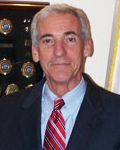 | DBPR SECRETARY
CHUCK DRAGO |
On September 28, 2009, DBPR Secretary Chuck Drago notified Governor Crist that his Department wrapped up their study. DBPR invited input from Florida�s fire service industry, condominium community advocacy organizations, the Office of the State Fire Marshal, the Office of Insurance Regulation, Citizens Property Insurance Company, fire sprinkler installers and representatives of insurance companies. Two participating association advocacy groups were the Community Advocacy Network (CAN) and the Community Association Leadership Lobby (CALL). The Community Advocacy Network (CAN) represents 2500 associations and is headed by Donna Berger, an association attorney with Katzman Garfinkel Rosenbaum. Berger also originally initiated the Community Association Leadership Lobby while employed by Becker Poliakoff - which represents approximately 4,500 condominium associations. When she left for Katzman Garfinkel Rosenbaum and started CAN, Yeline Goin and David G. Muller succeeded Berger as CALL�s Co-Directors. Also testifying on behalf of cash-strapped condos and coops was Harry Charles, President Emeritus of the Space Coast Communities Association, an umbrella organization with 269 member associations on central Florida�s east coast.
 Based upon a DBPR database review of condominium construction dates, the Division learned that of the 5600 projects affected by the mandated retrofit, only a handful had already complied. The database demonstrated the costs attendant to the two prospective installation options - a full sprinkler retrofit and the partial retrofit (AKA the �Minimum Alternative Life Safety System�) � varied widely, ranging from $503 per unit to $8633 per unit. While impacted by a structure�s layout, material construction, existing standpipe locations, and other structural factors, costs depended primarily on whether the water lines were simply dropped from the ceiling as exemplified by low-income public housing, or effectively hidden to meet the association�s aesthetic objectives. It is highly unlikely that Galt Mile associations will tolerate the exposed pipes that earmark the more modest estimates. Based upon a DBPR database review of condominium construction dates, the Division learned that of the 5600 projects affected by the mandated retrofit, only a handful had already complied. The database demonstrated the costs attendant to the two prospective installation options - a full sprinkler retrofit and the partial retrofit (AKA the �Minimum Alternative Life Safety System�) � varied widely, ranging from $503 per unit to $8633 per unit. While impacted by a structure�s layout, material construction, existing standpipe locations, and other structural factors, costs depended primarily on whether the water lines were simply dropped from the ceiling as exemplified by low-income public housing, or effectively hidden to meet the association�s aesthetic objectives. It is highly unlikely that Galt Mile associations will tolerate the exposed pipes that earmark the more modest estimates.
 | | CAN DIRECTOR DONNA BERGER |
CALL Co-Director Yeline Goin wasn�t surprised by the sparse association participation, stating �Many associations are taking a wait and see approach, hoping the Legislature will provide relief by extending the date or removing the requirement altogether.� The primary reason for this resistance is the cost. CAN Executive Director Donna Berger agreed that retrofit costs are the limiting factor, noting �Many associations have held off retrofitting because they simply do not have the funds to do so," citing foreclosures as having constricted the fiscal capabilities of many associations.
 | | GARY POLIAKOFF |
In a letter he wrote to the Governor blasting the advice Crist received prompting a veto of SB 714, Condo Attorney Gary A. Poliakoff asked, �With all due respect, exactly who did your advisors assume will be forced to pay the special assessments to retrofit a condominium where 40 percent to 50 percent of the units are in default in payment of their assessments, or in mortgage foreclosure?�
 | | CALL CO-DIRECTORS YELINE GOIN AND DAVID MULLER |
Pursuing Crist�s strategy ofsoftening public reaction to the prohibitive cost, DBPR hoped Citizens Insurance and the Office of Insurance Regulation would demonstrate that retrofitted buildings would realize an offsetting savings in insurance premiums. Citizens reported that �A 5% sprinkler credit is applied if a building is fully sprinklered and the ISO (Insurance Services Office), a leading provider of information about property and liability risk, confirms the building has an approved sprinkler system.� A condominium with sprinklers in the common areas only (one of the two legal options) may or may not realize any benefit, depending in part on whether they are rated specifically or as a class by ISO. Since specific rates are based on the individual risk characteristics of a building (construction, layout, materials, occupancy, protection, exposure, etc.), prospective reductions are arbitrary at best � depending primarily on the innate altruism of the insurance actuary. If rated as component to a construction class, they would be summarily rejected.
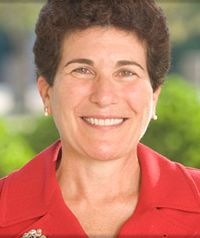 | FORMER DEPUTY INSURANCE
COMMISSIONER LISA MILLER |
However, when insurance carriers granted reductions for Florida associations fully retrofitted with fire sprinklers, the price impact on their overall policies was insignificant because the discounts applied only to the modest �all other perils� portion of their property and casualty policies, not the expensive windstorm portion. After confirming that the 5% premium discount described by Citizens is negligible since it applies only to the �all other perils� portion of an insurance policy, former Deputy Insurance Commissioner Lisa Miller added �An ISO considers a building that is partially sprinklered the same as a building without sprinklers, from a rating perspective.� As a result, ISO will recommend that partially retrofitted Associations receive no discount and fully sprinklered buildings see a small break on their minor multi-peril costs. Additionally, since heeding the advice of ISO is voluntary, subject to the proprietary policies of individual insurance companies, carriers perceiving a captive clientele will be predisposed to blowing off any reduction.
 Having failed to provide the cost offsets sought by the Governor, the Division segued to three conclusions and recommendations that supposedly facilitate compliance, starting with an alternative explanation for the perfunctory posture of associations confronted by the retrofit deadline. In the report�s Executive Summary, the DBPR frames how association budgeting practices affect any decision to retrofit by explaining, �Inherently focused on the challenges of the present, a mandate five (5) years from now for many associations likely appears to be in the distant future. Further, considering that in five years, with two year staggered terms, an association�s board could be entirely different than the membership elected this winter. Addressing a mandate not realized until five (5) years from now is likely a lesser priority than the challenges of today�most notably collecting regular assessments and addressing a significant wave of foreclosures.� The Division ultimately defines the stumbling block, �Under the circumstances, the prospect of adding any additional costs for most associations would be difficult to propose, and perhaps result in a recall of the association�s board.� Having failed to provide the cost offsets sought by the Governor, the Division segued to three conclusions and recommendations that supposedly facilitate compliance, starting with an alternative explanation for the perfunctory posture of associations confronted by the retrofit deadline. In the report�s Executive Summary, the DBPR frames how association budgeting practices affect any decision to retrofit by explaining, �Inherently focused on the challenges of the present, a mandate five (5) years from now for many associations likely appears to be in the distant future. Further, considering that in five years, with two year staggered terms, an association�s board could be entirely different than the membership elected this winter. Addressing a mandate not realized until five (5) years from now is likely a lesser priority than the challenges of today�most notably collecting regular assessments and addressing a significant wave of foreclosures.� The Division ultimately defines the stumbling block, �Under the circumstances, the prospect of adding any additional costs for most associations would be difficult to propose, and perhaps result in a recall of the association�s board.�
 To cure this obstacle, the Division enigmatically recommends, �Over the next five (5) years the Division via inserts in the billing statements, educational presentations, and electronic communication, will significantly increase awareness of the impending sprinkler retrofit mandate.� Having admitted that despite awareness of the mandate, association boards are unavoidably preoccupied with financial survival, how does sending an insert in the annual billing statement and email reminders that the deadline is approaching resolve an association�s fiscal constraints? Perhaps when a board announces that the building�s water is being shut off to save up for a sprinkler head in every unit foyer, they can simultaneously distribute copies of those inserts and emails to their members. Strike one. To cure this obstacle, the Division enigmatically recommends, �Over the next five (5) years the Division via inserts in the billing statements, educational presentations, and electronic communication, will significantly increase awareness of the impending sprinkler retrofit mandate.� Having admitted that despite awareness of the mandate, association boards are unavoidably preoccupied with financial survival, how does sending an insert in the annual billing statement and email reminders that the deadline is approaching resolve an association�s fiscal constraints? Perhaps when a board announces that the building�s water is being shut off to save up for a sprinkler head in every unit foyer, they can simultaneously distribute copies of those inserts and emails to their members. Strike one.
 Secondly, the Division concludes �that installation costs vary depending on multiple factors including the initial condition of the association�s standpipe, the type of installation performed (common areas only or common areas and units), and any aesthetic considerations the association may want to incorporate into the existing d�cor.� Secondly, the Division concludes �that installation costs vary depending on multiple factors including the initial condition of the association�s standpipe, the type of installation performed (common areas only or common areas and units), and any aesthetic considerations the association may want to incorporate into the existing d�cor.�
 Admonishing that �Multiple variables impact the costs of installing a fire sprinkler system and understanding that the statute provides an alternative to a fire sprinkler system in the form of an �other engineered lifesafety system�,� the Division recommends that �best management practices for condominium associations retrofitting with a fire sprinkler system should be established as associations consider their options.� Basically, if you can�t cough up the money to bury the pipes, acclimate to the prospect of living in a tenement. Strike two. Admonishing that �Multiple variables impact the costs of installing a fire sprinkler system and understanding that the statute provides an alternative to a fire sprinkler system in the form of an �other engineered lifesafety system�,� the Division recommends that �best management practices for condominium associations retrofitting with a fire sprinkler system should be established as associations consider their options.� Basically, if you can�t cough up the money to bury the pipes, acclimate to the prospect of living in a tenement. Strike two.
 While the first two recommendations rise to the level of tepid drivel, the third effort offers the illusion of merit. Spotlighting the insurance industry�s refusal to confer any rate benefit for installing the less expensive partial sprinkler system, the DBPR suggests that �The Legislature may wish to address the uncertainty of a premium discount when associations opt to install sprinklers in the common areas only.� Every scrap of testimony supports that premium discounts for partial installations are hardly �uncertain�, they are nonexistent. While the first two recommendations rise to the level of tepid drivel, the third effort offers the illusion of merit. Spotlighting the insurance industry�s refusal to confer any rate benefit for installing the less expensive partial sprinkler system, the DBPR suggests that �The Legislature may wish to address the uncertainty of a premium discount when associations opt to install sprinklers in the common areas only.� Every scrap of testimony supports that premium discounts for partial installations are hardly �uncertain�, they are nonexistent.
 The DBPR acknowledges that �if a fire sprinkler system has been installed in accordance with nationally accepted fire sprinkler design standards adopted by the Office of Insurance Regulation and if the fire sprinkler system is maintained within nationally accepted standards, Chapter 627.0654, Florida Statutes, mandates a premium discount.� Since the �Minimum Alternative Life Safety System� provided for in Chapter 718.112(2)(l) of the Florida Statutes doesn�t rise to the standard described in Chapter 627.0654, the DBPR suggests �the Legislature may want to harmonize the two chapters,� hopefully providing a modicum of relief for associations installing fire sprinklers only in the common areas. The DBPR acknowledges that �if a fire sprinkler system has been installed in accordance with nationally accepted fire sprinkler design standards adopted by the Office of Insurance Regulation and if the fire sprinkler system is maintained within nationally accepted standards, Chapter 627.0654, Florida Statutes, mandates a premium discount.� Since the �Minimum Alternative Life Safety System� provided for in Chapter 718.112(2)(l) of the Florida Statutes doesn�t rise to the standard described in Chapter 627.0654, the DBPR suggests �the Legislature may want to harmonize the two chapters,� hopefully providing a modicum of relief for associations installing fire sprinklers only in the common areas.
 Two adamantine obstacles burden the DBPR�s proposition. Unless the rate reduction targeted by their recommendation can be applied to the overall insurance premium and not just the anorectic multi-peril portion of the association�s policy, it will never serve as anything more than a shallow public relations gesture. Secondly, since the State is still desperately trying to lure rated carriers back to Florida�s largely abandoned property & casualty market (despite a 28% rate increase, State Farm is dropping 800,000 property policies and hitting the road), prospects for such costly legislation surviving industry opposition are reasonably comparable to those of a snowball in hell. Two adamantine obstacles burden the DBPR�s proposition. Unless the rate reduction targeted by their recommendation can be applied to the overall insurance premium and not just the anorectic multi-peril portion of the association�s policy, it will never serve as anything more than a shallow public relations gesture. Secondly, since the State is still desperately trying to lure rated carriers back to Florida�s largely abandoned property & casualty market (despite a 28% rate increase, State Farm is dropping 800,000 property policies and hitting the road), prospects for such costly legislation surviving industry opposition are reasonably comparable to those of a snowball in hell.
 | SEN GELLER, REP SEILER, GOV CHARLIE CRIST, SPEAKER
RUBIO AND SEN JEFF ATWATER PASS INSURANCE BILL |
On January 16, 2007, Governor Charlie Crist�s new Administration prompted Senate President Ken Pruitt and Statehouse Speaker Marco Rubio to convene a special legislative session on property insurance. Despite the Governor�s pre-Election Day campaign promises of premium relief for homeowners and significant progress toward re-establishing a competitive insurance environment, the lawmakers were unilaterally stonewalled by the well-organized insurance industry. If not for Jeff Atwater�s eleventh hour reshuffling of Citizens� policy mission from safety net to full-service carrier and the temporary postponement of two scheduled statewide Citizens assessments, the Governor would have come away empty handed. In exchange for these face-saving concessions, the State had to loosen the CAT fund�s purse strings, adding $12 billion to the existing $16 billion in below market reinsurance for carriers (wholly underwritten by taxpayers) with the caveat that the savings be passed to ratepayers. The session produced an 8% premium discount on the heels of a 300% increase.
 | GOVERNOR CRIST AND COMMISSIONER
MCCARTY ANNOUNCE ALLSTATE SUBPOENAS |
At Senatorial insurance hearings a few months later, when executives in Allstate�s Florida �dummy� corporations (Allstate Floridian Insurance Co., Allstate Floridian Indemnity Co., etc.) were subpoenaed to explain the evidentiary documentation for a requested 41.9% rate increase, they openly admitted to drawing on relationships with insurance trade associations, insurance rating organizations, affiliated reinsurers and risk modeling companies to �reverse engineer� support for hiking rates. Since more than 33% of Florida�s rated carriers had requested similarly outrageous increases despite experiencing lower costs, the hearings had dramatically outed bald-faced non-compliance with the year-old Statute. After receiving a slap on the wrist, some carriers accepted more modest rate increases although most skipped town, abandoning the Florida property insurance market. It is highly unlikely that this same insurance lobby will suddenly succumb to legislative pressure and pass out discounts. You do the math. Strike three.
 In summary, two of the three recommendations restate and then ignore the problem. Having established that associations can ill afford to pass $billions to the fire sprinkler industry, DBPR will pointlessly send out emails to remind association boards that the deadline is 2014 and more emails to remind them that they can choose between a full or partial retrofit. The third recommendation is an unfunded excursion to Fantasy Island. Notwithstanding, the report provides ample political distraction for the Governor to spin this as a serious treatment of the issues at campaign events. In summary, two of the three recommendations restate and then ignore the problem. Having established that associations can ill afford to pass $billions to the fire sprinkler industry, DBPR will pointlessly send out emails to remind association boards that the deadline is 2014 and more emails to remind them that they can choose between a full or partial retrofit. The third recommendation is an unfunded excursion to Fantasy Island. Notwithstanding, the report provides ample political distraction for the Governor to spin this as a serious treatment of the issues at campaign events.
 If a special legislative session is convened to ratify a controversial tribal gaming agreement, an SB 714 veto reversal is possible. Don�t hold your breath. It appears that we will have to endure another legislative gauntlet before realizing relief from this big time payday for plumbing contractors and sprinkler distributers. At least the next Governor will not be able to rationalize another veto by claiming the absence of a condo cost impact study. Welcome to Florida! If a special legislative session is convened to ratify a controversial tribal gaming agreement, an SB 714 veto reversal is possible. Don�t hold your breath. It appears that we will have to endure another legislative gauntlet before realizing relief from this big time payday for plumbing contractors and sprinkler distributers. At least the next Governor will not be able to rationalize another veto by claiming the absence of a condo cost impact study. Welcome to Florida!
Related Links

 If you would like to let Governor Crist know that his veto of SB 714 was ill advised, click the following email link: [email protected]. If you would like to let Governor Crist know that his veto of SB 714 was ill advised, click the following email link: [email protected].
Click To Top of Page
Third Time�s the Charm

Retrofit Resolution Revived

 February 7, 2010 - Since 2002, when Florida association members hear the word �sprinklers�, they either wince or cringe. Condo and Co-op owners have spent the past eight years nervously awaiting notice about some mysterious assessment that could deep-fry the household budget. Recently, some Galt Mile Associations expressed shock and dismay upon receiving a disconcerting letter from the local Fire Marshal � reminding them that they will be tagged for a boatload of money by 2014. For those of you who have moved here since 2002 and/or take pride in ignoring the legislative antics annually cooked up in Tallahassee for you and your neighbors, there�s some good news. (This may also provide a modicum of relief to nervous Board members cogitating how to break the mysterious letter�s bad news to residents.) First � some history. February 7, 2010 - Since 2002, when Florida association members hear the word �sprinklers�, they either wince or cringe. Condo and Co-op owners have spent the past eight years nervously awaiting notice about some mysterious assessment that could deep-fry the household budget. Recently, some Galt Mile Associations expressed shock and dismay upon receiving a disconcerting letter from the local Fire Marshal � reminding them that they will be tagged for a boatload of money by 2014. For those of you who have moved here since 2002 and/or take pride in ignoring the legislative antics annually cooked up in Tallahassee for you and your neighbors, there�s some good news. (This may also provide a modicum of relief to nervous Board members cogitating how to break the mysterious letter�s bad news to residents.) First � some history.
 | | PLAZA SOUTH'S JIM GILL |
Eight years ago, former GMCA President Robert Rozema received a call from the Florida Fire Sprinkler Association asking if a Florida Fire Marshal could address the neighborhood association. Intrigued, Rozema placed the mysterious guest on the Presidents Council agenda. At the meeting, the uniformed spokesperson thanked the membership for supporting some legislation about fire sprinklers and started to describe how they should explain some huge assessment to their various Boards. When Jack Freidman of the Commodore announced, �This is the first time I am hearing about this,� perplexed association members concurred and Galt Ocean Club�s Pio Ieraci asked the guest speaker to explain what he was talking about. The spokesperson cheerfully reported that fire sprinkler legislation had successfully slipped through the Florida Legislature and was now State Law. After hearing how �a �huge insurance savings� would offset the cost of a building-wide sprinkler system in 45 to 50 years,� the late Jim Gill of Plaza South asked the speaker �Who paid you to appear at our meeting.� He responded �I work for The Florida Fire Sprinkler Association and they told me that all of you wanted to install their sprinkler systems.�
 | FORMER GMCA PRES.
ROBERT ROZEMA |
Rozema jumped in, �We�ve never even heard of this legislation, much less support it; exactly why are you here?� The �guest speaker� answered, �The Sprinkler Association is sending representatives to civic and neighborhood associations throughout the state to inform their members about the new law and help them sell the idea to unit owners living in their buildings. It doesn�t matter whether or not anyone supports the sprinkler retrofit, its State law and you have no choice.� That night, the GMCA unanimously voted to oppose this unfunded mandate. The following summarizes what happened then� and what�s happening now.
The Opening Bell

  In 2002, the Florida Legislature quietly passed a bill requiring every Florida Association housed in a structure 75 feet above grade to install an approved, automatic sprinkler system throughout the structure. Scrutiny of the new law revealed it to be a $multi-billion payday for certain vested interests instead of effective fire protection. Drafted by the American Fire Sprinkler Association and the National Fire Sprinkler Association with input from the Plumbers and Pipefitters Union, glaringly absent from this �midnight legislation� were any studies or research clarifying its impact on common interest associations and their unit owners. In 2002, the Florida Legislature quietly passed a bill requiring every Florida Association housed in a structure 75 feet above grade to install an approved, automatic sprinkler system throughout the structure. Scrutiny of the new law revealed it to be a $multi-billion payday for certain vested interests instead of effective fire protection. Drafted by the American Fire Sprinkler Association and the National Fire Sprinkler Association with input from the Plumbers and Pipefitters Union, glaringly absent from this �midnight legislation� were any studies or research clarifying its impact on common interest associations and their unit owners.
 To infuse a bill designed by industry trade groups with credibility, certain representatives from the Florida Fire Marshals and Inspectors Association (FFMIA) called on legislators to �pass this bill as a testament to our heroic firefighters.� Instead of presenting authoritative documentation demonstrating that a variety of different fire safety solutions should be tailored to a structure�s material composition, size, entry and egress, construction features and existing fire safety elements, the impressively uniformed lobbyists convinced key lawmakers that sprinkler retrofits were a fire safety panacea for every condominium. To infuse a bill designed by industry trade groups with credibility, certain representatives from the Florida Fire Marshals and Inspectors Association (FFMIA) called on legislators to �pass this bill as a testament to our heroic firefighters.� Instead of presenting authoritative documentation demonstrating that a variety of different fire safety solutions should be tailored to a structure�s material composition, size, entry and egress, construction features and existing fire safety elements, the impressively uniformed lobbyists convinced key lawmakers that sprinkler retrofits were a fire safety panacea for every condominium.
 | CHUCK AKERS - EXECUTIVE
DIRECTOR - FFMIA & AFSA
|
The Fire Marshals lobbying the lawmakers weren�t solely motivated by public spirit. Many of the uniformed retrofit proponents were financially vested in the outcome of this legislation. Executive Director Chuck Akers of the Florida Fire Marshals and Inspectors Association is also the Executive Director of the American Fire Sprinkler Association, an industry trade group responsible for boosting sprinkler sales. Other Fire Marshals Association officials are also employed by the National Fire Sprinkler Association, another sprinkler trade organization behind the original legislation. FFMIA Past President and lifetime member Steven Randall was also the South Central Regional Manager of the National Fire Sprinkler Association (locally AKA Florida Fire Sprinkler Association) until he retired on July 16, 2009 (after the Governor vetoed the sprinkler retrofit deadline extension). As for FFMIA lifetime member Buddy Dewar, in addition to pulling a salary as the National Fire Sprinkler Association�s Director of Regional Operations, he�s employed as the Florida Fire Sprinkler Association�s Lobbyist and Legislative Liaison.
 | FORMER REPRESENTATIVE
CONNIE MACK IV |
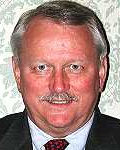 | FFMIA's & NFSA's
BUDDY DEWAR |
Following a State-wide outcry against the suspect expenditure, the legislation was subsequently modified to allow condo owners to �Opt Out� of retrofitting their units �by the affirmative vote of two-thirds of all voting interests�. In 2003, the Galt Mile Community Association contacted District 91 Statehouse Representative Connie Mack IV and sophomore Senator Jeffrey Atwater, requesting legislative relief. The opt-out provision was added to Mack�s House Bill 165 and Atwater�s Senate Bill 592, co-filed with former Hollywood Senator Steven Geller (currently a candidate for Sue Gunzburger�s Broward Commission seat) over the virulent objections of lobbyists for the Plumbers and Pipefitters Union and the Fire Sprinkler Associations. It allowed Associations and their Fire Safety Engineers to tailor a �Minimum Alternative Life Safety System� (AKA �Engineered Life Safety System�) instead of the budget busting full sprinkler retrofit. As a concession to the lobbying interests, the corrective legislation required Fire Safety Engineers to add sprinkler retrofits in every unit foyer (entry area to unit) and common area when designing a comprehensive Fire Protection plan for an association.
Gubernatorial Gaffes

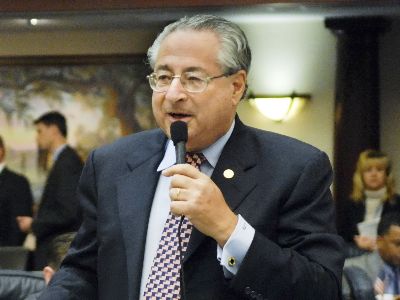 | | REPRESENTATIVE CARL DOMINO |
In 2006, House Bill 391 by Representative Carl Domino aspired to extend the sprinkler retrofit deadline for high rise projects from the currently mandated 2014 to 2025. The extra decade would have afforded unit owners an opportunity to recover from the 2004 and 2005 hurricane repair assessments, mega-deductibles and huge windstorm insurance increases that often required long and/or short term financing. Unit owners in these leveraged associations sought to first amortize their bloated debt service before paying another sizable assessment.
 | FORMER GOVERNOR JEB
BUSH VETOES HB 391 |
After successfully surviving comprehensive committee reviews in both legislative bodies, HB 391 was passed out of the House by a vote of 113 Yeas vs. 0 Nays and was passed out of the Senate by a vote of 40 Yeas vs. 0 Nays. Retrofit lobbyists failed to convince lawmakers that investing scarce association resources in limited sprinklers would yield a more productive safety benefit than a comparable investment in hurricane protection. Despite its overwhelming support and having unanimously passed both legislative bodies, lame duck Governor Jeb Bush frustrated condo owners by vetoing the bill, blaming the absence of any official study examining how retrofit costs will impact condominium owners.
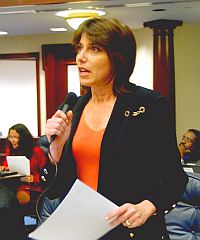 | | REP. ELLYN BOGDANOFF FILES HB 419 |
Responding to persistent entreaties by Galt Mile Community Association officials and hundreds of constituents, on January 16, 2009, Statehouse Representative Ellyn Bogdanoff filed House Bill 419. Its sister bill, Senate Bill 714 filed by Senator Dennis Jones, was ultimately substituted for HB 419 as the session wound down. Popularly known as the association �glitch� bill, SB 714 sought to reverse some of the counterproductive and/or expensive regulations that were piggy-backed onto large omnibus association and insurance bills during the frenetic last weeks of the 2008 session (House Bill 601). Filed to correct a host of poorly drafted, contradictory or unworkable regulations, its provisions addressed a wide range of association issues including insurance, board elections, fire sprinklers, fire alarm systems, Timeshare Condominiums and back-up generators for elevators.
 | | SENATOR DENNIS L. JONES |
It primarily targeted inequitable insurance provisions, such as the right of an association to force every unit owner to purchase HO-6 insurance (condominium unit insurance) and name the association as a beneficiary (you file the claim, the association gets the check). It would also have eliminated the right of associations to �force place� such coverage if the unit owner failed to produce an insurance certificate. Another glitch targeted by the bill is the requirement that a unit owner�s �hazard insurance� policy include at least $2,000 of �special assessment� coverage � although such a product does not exist! SB 714 would have redrafted the language to �loss assessment� coverage in a �property insurance� policy and clarified that it is excess coverage, curing a defect that allows insurance companies to require a second deductible for property damaged during a covered event.
 The legislation would have relieved associations of having to insure �improvements and additions� that benefit fewer than all the owners. Since current law fails to define �improvements and additions,� this may or may not include balconies, fixed balcony appurtenances, vehicle enclosures such as carports, storage spaces and other building elements whose designations hover between �limited common areas� and �private property�. It also changed the statutory standard for the association�s insurance coverage from �full insurable value� to �replacement cost�. The legislation would have relieved associations of having to insure �improvements and additions� that benefit fewer than all the owners. Since current law fails to define �improvements and additions,� this may or may not include balconies, fixed balcony appurtenances, vehicle enclosures such as carports, storage spaces and other building elements whose designations hover between �limited common areas� and �private property�. It also changed the statutory standard for the association�s insurance coverage from �full insurable value� to �replacement cost�.
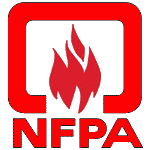 SB 714 additionally would have exempted some single and two-story buildings with an �exterior means of egress corridor� from being forced to install an expensive manual fire alarm system, despite the National Fire Protection Association (Subdivision 31.3.4.1.1, NFPA 101, Life Safety Code) deeming it unnecessary. Along with other fixes, the bill contained the long anticipated postponement of the multi $million fire sprinkler retrofit - similar to the bill vetoed in 2006. Like the earlier legislation, it would have delayed an onerous mandated association assessment from 2014 to 2025. SB 714 additionally would have exempted some single and two-story buildings with an �exterior means of egress corridor� from being forced to install an expensive manual fire alarm system, despite the National Fire Protection Association (Subdivision 31.3.4.1.1, NFPA 101, Life Safety Code) deeming it unnecessary. Along with other fixes, the bill contained the long anticipated postponement of the multi $million fire sprinkler retrofit - similar to the bill vetoed in 2006. Like the earlier legislation, it would have delayed an onerous mandated association assessment from 2014 to 2025.
 | | GOVERNOR CRIST ANNOUNCES SB 714 VETO |
On April 27th, SB 714 passed a vote in the Senate by 38 Yeas vs. 0 Nays (2 not voting). On April 29th, the bill passed a vote in the House by 114 Yeas vs. 2 Nays (4 not voting). On June 1, 2009, Governor Crist visited d�j� vu on millions of Florida association members, vetoing SB 714 despite its overwhelming legislative and public support.
 | | GARY POLIAKOFF |
Association Attorney Gary A. Poliakoff of Becker & Poliakoff blasted the veto advice apparently accepted by the Governor. In a letter to Crist, he asked, �With all due respect, exactly who did your advisors assume will be forced to pay the special assessments to retrofit a condominium where 40 percent to 50 percent of the units are in default in payment of their assessments, or in mortgage foreclosure?� How many unit owners will be forced to move if burdened with another $8,000 to $18,000 assessment? Prior to the veto, Representative Ellyn Bogdanoff reminded Governor Crist that �in 30 years, not one injury resulted from an association�s failure to perform a sprinkler retrofit.�
Upon vetoing the bill, senatorial candidate Crist emulated his predecessor, exclaiming, �I am directing the Department of Business and Professional Regulation (DBPR) to initiate a comprehensive review of actual retrofit costs and the impacts that retrofitting may have on insurance premiums.�
The Retrofit Report


 | FORMER DBPR CHIEF
CHUCK DRAGO |
On September 28, 2009, former DBPR Secretary Chuck Drago (took over on November 30th as Crist�s Deputy Chief of Staff) notified Governor Crist that his Department wrapped up their study. The DBPR invited input from Florida�s fire service industry, condominium community advocacy organizations, the Office of the State Fire Marshal, the Office of Insurance Regulation, Citizens Property Insurance Company, fire sprinkler installers and representatives of insurance companies. Two participating association advocacy groups were the Community Advocacy Network (CAN) and the Community Association Leadership Lobby (CALL). The Community Advocacy Network (CAN) represents 2500 associations and is headed by Donna Berger, an association attorney with Katzman Garfinkel Rosenbaum. Berger also originally initiated the Community Association Leadership Lobby while employed by Becker Poliakoff - which represents approximately 4,500 condominium associations. When she left for Katzman Garfinkel Rosenbaum and started CAN, Yeline Goin and David G. Muller succeeded Berger as CALL�s Co-Directors. Also testifying on behalf of cash-strapped condos and coops was Harry Charles, President Emeritus of the Space Coast Communities Association, an umbrella organization with 269 member associations on central Florida�s east coast.
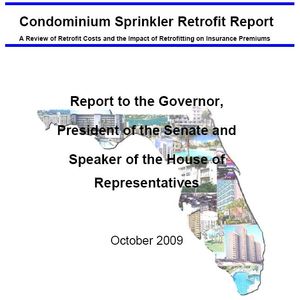 Although statistically crippled by the negligible number of available cost estimates, the diminutive database demonstrated the costs attendant to the two prospective installation options - a full sprinkler retrofit and the partial retrofit (i.e. the �Minimum Alternative Life Safety System� or �Engineered Life Safety System�) � varied widely, ranging from $503 per unit to $8633 per unit. While impacted by a structure�s layout, material construction, existing standpipe locations, and other structural factors, costs depended primarily on whether the water lines were simply dropped from the ceiling as exemplified by low-income public housing, or effectively hidden to meet the association�s aesthetic objectives. Local fire safety engineers confirm that the dropped ceilings, drywalls and other construction variables required for camouflaging the steel, copper or CPVC substantially increases installation costs. It is highly unlikely that Galt Mile associations will tolerate the exposed pipes that earmarked most of the report�s estimates. Although statistically crippled by the negligible number of available cost estimates, the diminutive database demonstrated the costs attendant to the two prospective installation options - a full sprinkler retrofit and the partial retrofit (i.e. the �Minimum Alternative Life Safety System� or �Engineered Life Safety System�) � varied widely, ranging from $503 per unit to $8633 per unit. While impacted by a structure�s layout, material construction, existing standpipe locations, and other structural factors, costs depended primarily on whether the water lines were simply dropped from the ceiling as exemplified by low-income public housing, or effectively hidden to meet the association�s aesthetic objectives. Local fire safety engineers confirm that the dropped ceilings, drywalls and other construction variables required for camouflaging the steel, copper or CPVC substantially increases installation costs. It is highly unlikely that Galt Mile associations will tolerate the exposed pipes that earmarked most of the report�s estimates.

 | FORMER DEPUTY INSURANCE
COMMISSIONER LISA MILLER |
As to the quixotic cost offsets from insurance savings hoped for by the Governor upon ordering the report, when insurance carriers granted reductions for Florida associations fully retrofitted with fire sprinklers, the price impact on their overall policies was insignificant because the discounts applied only to the modest �all other perils� portion of their property and casualty policies, not the expensive windstorm portion. After confirming that the 5% premium discount described by Citizens Insurance earlier in the report is negligible since it applies only to the �all other perils� portion of an insurance policy, former Deputy Insurance Commissioner Lisa Miller added �An ISO (Insurance Services Office - an accredited property and liability risk assessor) considers a building that is partially sprinklered the same as a building without sprinklers, from a rating perspective.� As a result, ISO will recommend that partially retrofitted Associations receive no discount and fully sprinklered buildings see a small break on their minor multi-peril costs. Additionally, since heeding the advice of ISO is voluntary � subject to the proprietary policies of individual insurance companies � carriers perceiving a captive clientele will be predisposed to blowing off any reduction.
 Since the study provided the Governor with none of the fiscal ammunition promised by the Sprinkler Associations and their political avatars in the Fire Marshals Union, the three recommendations made by the DBPR to supposedly assist financially crippled associations implement the retrofits were either irrelevant or inane. DBPR suggested that associations be reminded of the statutory deadline in annual billing statements (just in case it slipped their minds). Secondly, associations should decide between partial or full sprinkler retrofits depending on their available resources - something short of a revelation. Thirdly, in view of the insurance industry�s refusal to confer any rate benefit for installing the less expensive partial sprinkler system, the DBPR suggested that �The Legislature may wish to address the uncertainty of a premium discount when associations opt to install sprinklers in the common areas only.� Every scrap of testimony in the report supports that premium discounts for partial installations are hardly �uncertain�, they are nonexistent. In essence, the study failed to soften either the fiscal consequences or association animosity resulting from the Governor�s veto. Since the study provided the Governor with none of the fiscal ammunition promised by the Sprinkler Associations and their political avatars in the Fire Marshals Union, the three recommendations made by the DBPR to supposedly assist financially crippled associations implement the retrofits were either irrelevant or inane. DBPR suggested that associations be reminded of the statutory deadline in annual billing statements (just in case it slipped their minds). Secondly, associations should decide between partial or full sprinkler retrofits depending on their available resources - something short of a revelation. Thirdly, in view of the insurance industry�s refusal to confer any rate benefit for installing the less expensive partial sprinkler system, the DBPR suggested that �The Legislature may wish to address the uncertainty of a premium discount when associations opt to install sprinklers in the common areas only.� Every scrap of testimony in the report supports that premium discounts for partial installations are hardly �uncertain�, they are nonexistent. In essence, the study failed to soften either the fiscal consequences or association animosity resulting from the Governor�s veto.
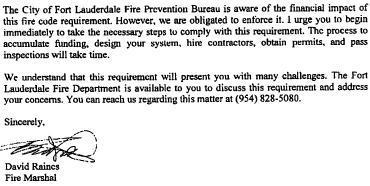 Associations are already receiving the �reminder� notices recommended by DBPR in their Retrofit Report. On December 30, 2009, Playa del Mar received a letter from Fort Lauderdale Fire Marshal David Raines reminding them of the 2014 retrofit deadline. Attempting to empathize with unit owners facing a crushing assessment, Raines confesses awareness of the code�s financial impact and laments that he is �obligated to enforce it.� Other Galt Mile Associations are in receipt of similar notices. Unfortunately, several members of Galt Mile Boards who failed to debrief their Advisory Board representatives were unaware of the reason for the notice and panicked. Unsettled board members and association officials mistook the notice for an effort to expedite compliance or surmised victimization by a �probably uncorrectable� computer glitch that inequitably singled them out for an immediate assessment. Associations are already receiving the �reminder� notices recommended by DBPR in their Retrofit Report. On December 30, 2009, Playa del Mar received a letter from Fort Lauderdale Fire Marshal David Raines reminding them of the 2014 retrofit deadline. Attempting to empathize with unit owners facing a crushing assessment, Raines confesses awareness of the code�s financial impact and laments that he is �obligated to enforce it.� Other Galt Mile Associations are in receipt of similar notices. Unfortunately, several members of Galt Mile Boards who failed to debrief their Advisory Board representatives were unaware of the reason for the notice and panicked. Unsettled board members and association officials mistook the notice for an effort to expedite compliance or surmised victimization by a �probably uncorrectable� computer glitch that inequitably singled them out for an immediate assessment.
What Safety Benefit?

 The �Alternative Minimum Life Safety System� as mandated by statute was never intended for extinguishing fires. Its stated objective is to provide a moderately safe egress. It is only one of many layers of fire protection in an engineered fire safety plan. Since effective early detection and containment will save far more lives than the sprinklers placed in unit foyers and certain common areas (as required for an Alternative Minimum Life Safety Plan), they are arguably more important components to any integrated fire safety system. Acknowledging the questionable safety benefit versus the huge costs, the DBPR opined �Under the circumstances, the prospect of adding any additional costs for most associations would be difficult to propose, and perhaps result in a recall of the association�s board.� The �Alternative Minimum Life Safety System� as mandated by statute was never intended for extinguishing fires. Its stated objective is to provide a moderately safe egress. It is only one of many layers of fire protection in an engineered fire safety plan. Since effective early detection and containment will save far more lives than the sprinklers placed in unit foyers and certain common areas (as required for an Alternative Minimum Life Safety Plan), they are arguably more important components to any integrated fire safety system. Acknowledging the questionable safety benefit versus the huge costs, the DBPR opined �Under the circumstances, the prospect of adding any additional costs for most associations would be difficult to propose, and perhaps result in a recall of the association�s board.�
 | | COMPARTMENTATION |
The bill was written before several generations of new technology seriously dated many of the mandate�s precepts. Many of our buildings are ideally adapted to Compartmentation - fire resistance rated (1, 2 or 3 hours) assemblies, with smoke treatments, that contain the fire to the room of origin until Fire-Rescue arrives. If these �compartments� are sealed against fire/smoke spread with fire/smoke dampers (which restrict air movement in ducts), firestopping penetrations, fire doors and other safety features, they become a far more effective protection protocol - without risking building-wide water damage (which adds to an association�s insurance burden).
 | | MICROSCALE NANOCRYSTALLINE TIN OXIDE DETECTOR |
It also predates various emerging sensor technologies (e.g., computer vision system, distributed fiber optic temperature sensor, and intelligent multiple sensor), signal processing and monitoring technology (e.g., real-time control via Internet) and integrated fire detection systems. By centralizing signal processing on the detector�s circuit board, giving each detector its own central processing unit (CPU) and software storage, it can pass information to a central panel when polled or upon sensing a fire. Smart detection and alarm systems based on neural network technology can be integrated into building automation and control systems using a gateway to preserve the integrity of the fire safety system (as required by law).
 | MECHANICAL RATCHET
FIRE ESCAPE DEVISE |
The benefits of this newer technology include smoke control (managing variable air volumes via existing HVAC systems), single seat access to building information, easier maintenance, sharing sensor data, obtaining information about the location and status of people during an emergency, two-way voice communications with every unit�s occupants and real-time data about their environment and condition. The same data can be made available for any unoccupied areas of the building, allowing firefighters to effectively assess conditions at or en route to any occupant�s location.
 A mechanical ratchet device that turns every window, balcony or catwalk into a viable escape egress was demonstrated and endorsed several times since 2006 at the Broward County Fire Academy. While the safety features inherent in these improvements are light years ahead of �sprinkler retrofits in unit foyers,� they portend no $billion payday for the legislation�s commercial supporters. A mechanical ratchet device that turns every window, balcony or catwalk into a viable escape egress was demonstrated and endorsed several times since 2006 at the Broward County Fire Academy. While the safety features inherent in these improvements are light years ahead of �sprinkler retrofits in unit foyers,� they portend no $billion payday for the legislation�s commercial supporters.
The Good News

 | | DONNA BERGER ESQ |
In December 2009, the Galt Mile Community Association participated in an association conference called to address legislative issues. Attended by Community Advocacy Network Executive Director Donna Berger, representatives from scores of community, civic, condominium and cooperative associations from across Florida and District 91 Statehouse Representative Ellyn Bogdanoff (District 25 Senatorial Candidate), they collectively reviewed an agenda for the current legislative session in Tallahassee.
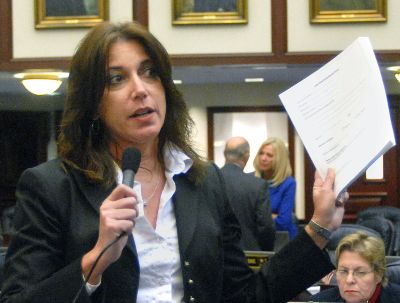 | | REP. ELLYN BOGDANOFF FILES HB 561 |
On January 4, 2010, Representative Bogdanoff filed House Bill 561, which not only revives the insurance fixes and other glitch repairs napalmed earlier by the Governor, it improves on the fire sprinkler retrofit resolution proposed in last year�s vetoed Senate Bill 714. Bogdanoff's bill states, �In no event shall the local authority having jurisdiction require completion of retrofitting with a sprinkler system or other engineered life safety system before the end of 2019,� extending the existing 2014 deadline by five years. Granted - the extension in SB 714 would have pushed the deadline to 2025, another six years out. However, Bogdanoff�s bill vests associations with an additional �right� lacking in SB 714, an element that distinguishes the legislation from its failed predecessors.
 HB 561 also removes the current statutory language, �However, a condominium association may not vote to forego the retrofitting with a fire sprinkler system of common areas in a high-rise building. For purposes of this subsection, the term �high-rise building� means a building that is greater than 75 feet in height where the building height is measured from the lowest level of fire department access to the floor of the highest occupiable story.� HB 561 also removes the current statutory language, �However, a condominium association may not vote to forego the retrofitting with a fire sprinkler system of common areas in a high-rise building. For purposes of this subsection, the term �high-rise building� means a building that is greater than 75 feet in height where the building height is measured from the lowest level of fire department access to the floor of the highest occupiable story.�
 Redacting the provision that prevented high-rise structures from fully opting out of the sprinkler retrofit, it adds �A vote to forego retrofitting may be obtained at a special meeting of the unit owners called by a petition of least 25 percent of the voting interests, once every 3 years. Notice shall be provided as required for any regularly called meeting of the unit owners, and the notice shall state the purpose of the meeting. Electronic transmission may not be used as a method of giving notice of a meeting called in whole or in part for this purpose.� Redacting the provision that prevented high-rise structures from fully opting out of the sprinkler retrofit, it adds �A vote to forego retrofitting may be obtained at a special meeting of the unit owners called by a petition of least 25 percent of the voting interests, once every 3 years. Notice shall be provided as required for any regularly called meeting of the unit owners, and the notice shall state the purpose of the meeting. Electronic transmission may not be used as a method of giving notice of a meeting called in whole or in part for this purpose.�
 | | SENATOR JEREMY RING |
Bingo! A petition including at least 25% of the high-rise association�s voting interests will trigger a special meeting wherein the unit owners can vote to opt out of any sprinkler retrofit. The bill returns the decision to retrofit a home of any height back to the homeowners who must live with and pay for that decision. To insure that the decision to opt out reflects the intentions of unit owners in perpetuity, the vote must be repeated every three years.
On January 14th, Broward Senator Jeremy Ring filed Senate Bill 1222, which mirrors the text of Bogdanoff�s bill in the other chamber. On January 20th, the house bill was referred to the Civil Justice & Courts Policy Committee, the Criminal & Civil Justice Policy Council and the Insurance, Business & Financial Affairs Policy Committee for vetting. After amending the bill to include Cooperatives, it was voted favorably by the Civil Justice & Courts Policy Committee on February 2nd. Prior to calendar consideration by the entire House of Representatives, the bill will also undergo review by the other two committees.
What about the Governor�s Heavy  Pen? Pen?

 �Hold on! Last year the Governor vetoed the sprinkler retrofit extension. Why won�t he do the same thing to this bill?� �Hold on! Last year the Governor vetoed the sprinkler retrofit extension. Why won�t he do the same thing to this bill?�
 When the Governor opted to placate the Sprinkler Associations and the Fire Marshals, he was laboring under the misconception that his political future was a lock. Since then, Charlie Crist has faced stiffening competition for his dream job in Washington D.C. � from former Statehouse Speaker Marco Rubio and Congressman Kendrick Meek. When the Governor opted to placate the Sprinkler Associations and the Fire Marshals, he was laboring under the misconception that his political future was a lock. Since then, Charlie Crist has faced stiffening competition for his dream job in Washington D.C. � from former Statehouse Speaker Marco Rubio and Congressman Kendrick Meek.
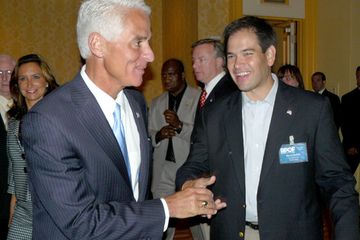 | | GOV CHARLIE CRIST AND REP MARCO RUBIO |
Despite his love affair with the D.C. Republican establishment and an endorsement by the National Republican Senatorial Committee, he started breaking a sweat in October when Marco Rubio raised $1 million in the third fundraising quarter of 2009 and emulsified the Governor�s big leads in the Quinnipiac University and Rasmussen polls. After losing 16 straight County Republican Committee polls (including in Pinellas, Crist�s home county), the Governor learned that Rubio scored $1.75 million and Democrat Kendrick Meek raised $1.2 million last quarter. Although straw polls are close to meaningless, events have led Crist to the conclusion that he would benefit from an opportunity to recapture much of the support lost when he vetoed SB 714.

 | CONGRESSMAN KENDRICK MEEK AND
GOVERNOR CHARLIE CRIST |
Since the DBPR report findings proved a barren source of vindication for Governor Crist, his alienation of more than 1.8 million condo and co-op owners yielded no ostensible political benefit. A savvy politician, the Governor is amenable to reconsidering his position.
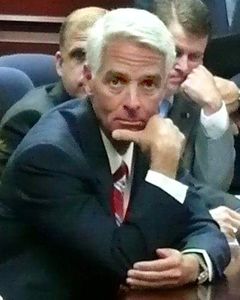 | | GOV MULLS |
His survival instinct appears to be functionally intact. The Governor is evidently willing to trade off a prospective photo op with a handful of �in uniform� sprinkler lobbyists for the gratitude and good will of 1.8 million cash-strapped albeit voting association members. By endorsing a bill enjoying the overwhelming support of lawmakers and voters alike, Charlie Crist stands to reduce the County straw polls� impact to confetti. Not bad for a day�s work since all he has to do is� nothing!
 While this is a giant step in the right direction, we have not, as yet, arrived. GMCA and allied common interest associations across the state will have to nurse the legislation through several legislative mine fields. However, challenges such as this have fueled the Galt Mile�s reputation as a small neighborhood with a big voice. Of course, we have a secret weapon...each other! More to come... While this is a giant step in the right direction, we have not, as yet, arrived. GMCA and allied common interest associations across the state will have to nurse the legislation through several legislative mine fields. However, challenges such as this have fueled the Galt Mile�s reputation as a small neighborhood with a big voice. Of course, we have a secret weapon...each other! More to come...
Double Cross!

  Shortly after indicating support for the relief bill, Governor Crist executed one of his classic "flip-flops", revealing at a media event that he might again veto legislation providing financial relief to association members. The Governor's PR handlers are weighing the impact of his retrofit position on his Senatorial campaign. The Sprinkler Associations have offered campaign finance access to their deep pockets while assuring the Governor that most association members aren't deeply concerned about the $multi-million assessment required to fund a sprinkler retrofit. Conversely, Community Association advocates have admonished that the Governor stands to lose almost 2 million votes by slamming an admittedly unnecessary expense down the throats of high rise association members. Representative Ellyn Bogdanoff explained that unless association members contact the Governor directly with their concerns, Crist will deliver the huge payday to the Sprinkler Associations. Shortly after indicating support for the relief bill, Governor Crist executed one of his classic "flip-flops", revealing at a media event that he might again veto legislation providing financial relief to association members. The Governor's PR handlers are weighing the impact of his retrofit position on his Senatorial campaign. The Sprinkler Associations have offered campaign finance access to their deep pockets while assuring the Governor that most association members aren't deeply concerned about the $multi-million assessment required to fund a sprinkler retrofit. Conversely, Community Association advocates have admonished that the Governor stands to lose almost 2 million votes by slamming an admittedly unnecessary expense down the throats of high rise association members. Representative Ellyn Bogdanoff explained that unless association members contact the Governor directly with their concerns, Crist will deliver the huge payday to the Sprinkler Associations.
 In short, the Governor's political bean counters are tracking feedback from the associations to determine if the damage to his Senatorial aspirations is far-reaching - as stated by Representative Bogdanoff and association advocates - or negligible - as claimed by the Sprinkler Associations. Through advocacy groups such as the Community Advocacy Network (CAN) and the Community Association Leadership Lobby (CALL), thousands of community associations (including the Galt Mile Community Association) across the state have engaged in a campaign to generate a hundred thousand correspondences requesting that the Governor support the relief bills. In short, the Governor's political bean counters are tracking feedback from the associations to determine if the damage to his Senatorial aspirations is far-reaching - as stated by Representative Bogdanoff and association advocates - or negligible - as claimed by the Sprinkler Associations. Through advocacy groups such as the Community Advocacy Network (CAN) and the Community Association Leadership Lobby (CALL), thousands of community associations (including the Galt Mile Community Association) across the state have engaged in a campaign to generate a hundred thousand correspondences requesting that the Governor support the relief bills.
The Bottom Line: If YOU ask the Governor to support HB 561, you will avoid the huge assessment. If you leave it to others... you won't. Life is rarely so simple. Take sixty seconds and Click Here to help send this pork project to the Tallahassee bone yard. More to come...
Related Links

Click To Top of Page
2010 Association Omnibus Bill

Takes Shape

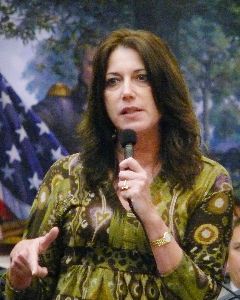 | | REP. ELLYN BOGDANOFF FILES HB 561 |
March 24, 2010 - Three weeks into the 2-month 2010 legislative session, bills impacting associations are dancing through committee minefields en route to a single omnibus association bill. Sharing center stage is House Bill 561 (HB 561) by Statehouse Representatives Ellyn Bogdanoff and Matt Hudson. HB 561 and bicameral counterpart Senate Bill 1196 (SB 1196) by Senator Mike Fasano are the heirs to ill-fated Senate Bill 714, the 2009 association �glitch� vehicle that offered hope in a session marked by subverted foreclosure bills, unrealized insurance fixes and a sprinkler retrofit �compromise� that was perfidiously nuked by the Governor.
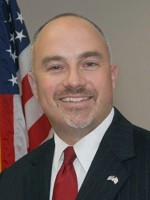 | | REP. MATT HUDSON |
The anger and fear experienced by association boards and managers struggling with survival budgets has spread epidemically throughout common interest communities, directly gripping each unit owner. Being forced to subsidize the same banks that precipitated the recession has served as a wakeup call. The prospective $multi-million assessment for an unnecessary sprinkler retrofit has added fuel to the fire, moving association homeowners to strap up and fight back.
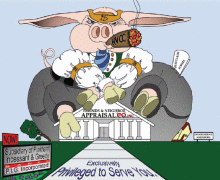 For years, frustrated associations watched helplessly as trade organizations in the banking, insurance and fire service industries repeatedly reversed every legislative attempt to provide unit owners with desperately needed fiscal relief. Disgusted by the legislature�s acquiescence to lobbying interests, associations realized that their survival hinged on adopting a page from their opponents� playbook. Although unable to provide the financial �incentives� offered to key lawmakers by cash-rich trade organizations, they control something equally valuable � votes � by the truckload � enough to cloud the outcome of every major race in Florida. For years, frustrated associations watched helplessly as trade organizations in the banking, insurance and fire service industries repeatedly reversed every legislative attempt to provide unit owners with desperately needed fiscal relief. Disgusted by the legislature�s acquiescence to lobbying interests, associations realized that their survival hinged on adopting a page from their opponents� playbook. Although unable to provide the financial �incentives� offered to key lawmakers by cash-rich trade organizations, they control something equally valuable � votes � by the truckload � enough to cloud the outcome of every major race in Florida.
 The 2010 legislative session precedes an election that will decide the career paths for many of Tallahassee�s �big dogs�. By formulating a unified legislative strategy based on enlightened self-interest, the 2 million Florida association members are leveraging their votes for the legislative relief previously denied them by powerful lobbies. Unit owners in associations across the state are contacting the same lawmakers pressured by lobbyists representing banks, insurance carriers and sprinkler trade organizations and offering them a prosaically uncomplicated arrangement � �my vote for yours�. The 2010 legislative session precedes an election that will decide the career paths for many of Tallahassee�s �big dogs�. By formulating a unified legislative strategy based on enlightened self-interest, the 2 million Florida association members are leveraging their votes for the legislative relief previously denied them by powerful lobbies. Unit owners in associations across the state are contacting the same lawmakers pressured by lobbyists representing banks, insurance carriers and sprinkler trade organizations and offering them a prosaically uncomplicated arrangement � �my vote for yours�.
  While providing the opportunity to opt out of any megabucks sprinkler retrofit assessment, SB 1196 and HB 561 also mollify a wide variety of association obstacles, the removal of which will alleviate the strain on association - and household - budgets. Although these bills currently house most of the legislative improvements sought by associations, vetting committees will subject them to refining amendments and language acquired from prospectively merged legislation will strengthen and enforce statutory foreclosure caps. While the following summary excludes the bills� regulations targeting Homeowners Associations (HOAs) since they are largely irrelevant to Galt Mile members, their broad spectrum of provisions impacting condominiums and cooperatives are outlined as follows: While providing the opportunity to opt out of any megabucks sprinkler retrofit assessment, SB 1196 and HB 561 also mollify a wide variety of association obstacles, the removal of which will alleviate the strain on association - and household - budgets. Although these bills currently house most of the legislative improvements sought by associations, vetting committees will subject them to refining amendments and language acquired from prospectively merged legislation will strengthen and enforce statutory foreclosure caps. While the following summary excludes the bills� regulations targeting Homeowners Associations (HOAs) since they are largely irrelevant to Galt Mile members, their broad spectrum of provisions impacting condominiums and cooperatives are outlined as follows:
Condominium Provisions

Condominium Fire Alarm Systems:
Condominium Fire Sprinklers:
 Amending s. 718.112, F.S., it provides for a retrofit exemption to condominium associations for a fire sprinkler system or any other form of engineered life safety system retrofitting sprinklers in a high rise building. An association can fully opt out of any retrofit requirement and the attendant assessment by an affirmative vote of two thirds of the voting interests. The bill provides that a previous vote to forego retrofitting may only be reconsidered once every three years at a special meeting called by a petition of 10% of the voting interests. Amending s. 718.112, F.S., it provides for a retrofit exemption to condominium associations for a fire sprinkler system or any other form of engineered life safety system retrofitting sprinklers in a high rise building. An association can fully opt out of any retrofit requirement and the attendant assessment by an affirmative vote of two thirds of the voting interests. The bill provides that a previous vote to forego retrofitting may only be reconsidered once every three years at a special meeting called by a petition of 10% of the voting interests.
For associations that don�t opt out, the local authority having jurisdiction may not require completion of retrofitting of common areas with a sprinkler system or any other form of engineered life safety system before the end of 2019.
Condominium Elevators:
Condominium Insurance:
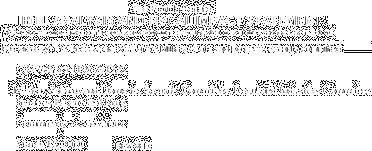 Creates 627.714, F.S., requiring all HO-6 policies issued or renewed after July 1, 2010, to include at least $2,000 in property loss assessment coverage (sets deductible maximum of $250 per property loss; precludes charge for second deductible charge for claims applied to same direct loss). Creates 627.714, F.S., requiring all HO-6 policies issued or renewed after July 1, 2010, to include at least $2,000 in property loss assessment coverage (sets deductible maximum of $250 per property loss; precludes charge for second deductible charge for claims applied to same direct loss).
Provides that all references to �hazard� insurance and �casualty� insurance are changed to �property� insurance.
Clarifies that adequate property insurance shall not be based upon the �full insurable value� of the property, but must be based on the �replacement cost� of the property to be insured, which must be determined at least once every 36 months.
Removes requirement that a notice of board meeting wherein an insurance deductible is set contain the assessment authority relied upon by the board and the estimate of the potential assessment amount against each unit (but still requires 14 days notice).
States that unit owner insurance is only for items listed (i.e., the personal property within the unit or limited common elements, and floor, wall, and ceiling coverings, electrical fixtures, appliances, water heaters, water filters, built-in cabinets and countertops, and window treatments, including curtains, drapes, blinds, hardware, and similar window treatment components, or replacements of any of the foregoing) that are located within the boundaries of the unit and serve only such unit. Such property and any insurance thereupon shall be the responsibility of the unit owner.
States that a condominium unit owner�s policy shall conform to s. 627.714 F.S. (relating to loss assessment coverage)
Removes language regarding insurance of �improvements� that benefit fewer than all the owners
Eliminates the requirement that owners provide proof of hazard and liability insurance to the association not more than once a year. Also eliminates the association�s right to �force place� insurance if the owner fails to provide an evidentiary certificate of insurance within 30 days of being asked.
Eliminates requirement that Association must be an additional named insured and loss payee on all HO-6 casualty insurance policies issued to unit owners in the condominium operated by the association (you pay premium, association gets the benefit check).
Timeshare Condominiums:
Amending s. 718.112(2)(d)1., F.S., it exempts timeshare condominiums from the requirement that the terms of all members of the board expire at the annual meeting unless otherwise permitted by the bylaws.
Condominium Rental Amendments:
 Amending s. 718.110(13), F.S., it provides that any amendment prohibiting unit owners from renting their units or altering the duration of the rental term or the number of times unit owners are entitled to rent their units during a specified period applies only to unit owners who consent to amendment and unit owners who acquire title to their units after effective date of amendment. Amending s. 718.110(13), F.S., it provides that any amendment prohibiting unit owners from renting their units or altering the duration of the rental term or the number of times unit owners are entitled to rent their units during a specified period applies only to unit owners who consent to amendment and unit owners who acquire title to their units after effective date of amendment.
Condominium Official Records:
 Clarifies that director liability for failure to maintain or destruction of official records is limited to cases where there is intent to harm the association or one or more of its members. Clarifies that director liability for failure to maintain or destruction of official records is limited to cases where there is intent to harm the association or one or more of its members.
Provides that association is not liable for unit owner misuse of information obtained from official records.
Provides that personnel records (disciplinary, payroll, health and insurance records) are exempt from unit owner access.
Provides that e-mail addresses, telephone numbers, emergency contact information, and any addresses of a unit owner that are not provided to fulfill the association�s notice requirements are exempt from unit owner access.
Provides that the association�s electronic or computer security data, including passwords, and software and operating systems that allow the manipulation of data are exempt from unit owner access.
The bill permits access to the following personal identifying information: the person�s name, lot or unit designation, mailing address, property address, and other contact information relevant for notice requirements.
Condominium Financial Reporting Requirements (prospective changes to financial reporting requirements):
 Financial report will be due 180 days after end of fiscal year (increased from existing 120 days) unless otherwise provided for in the bylaws. Financial report will be due 180 days after end of fiscal year (increased from existing 120 days) unless otherwise provided for in the bylaws.
Associations that operate fewer than 75 units, regardless of the association�s annual revenues, shall prepare a report of cash receipts and expenditures instead of financial statements (currently applicable to associations of fewer than 50 units).
Amends the provisions dealing with DBPR�s requirement to adopt rules involving financial reporting requirements. The rules shall include, but not be limited to, standards for presenting a summary of association reserves, including, but not limited to, a good faith estimate disclosing the annual amount of reserve funds that would be necessary for the association to fully fund reserves for each reserve item based on a straight-line accounting method. This disclosure is not applicable to reserves funded via the pooling method.
Condominium Common Expenses:
Amending s. 718.115(1)(d)1., F.S., it provides that communication services (as defined in chapter 202), information services, and Internet services obtained pursuant to a bulk contract shall be deemed a common expense.
Condominium Collections and Foreclosures:
The claim of lien may include cost for collection letters or any other collection effort by management companies or licensed managers as to any delinquency in installment of assessment, but may not exceed $75.
 Provides that if a unit is occupied by a tenant and that unit owner is delinquent in the payment of any monetary obligation to the association, the association may demand that the tenant pay to the association the future monetary obligations related to the condominium unit. Requires the association to mail written notice to the unit owner of the association�s demand that the tenant make payments to the association. Provides that if a unit is occupied by a tenant and that unit owner is delinquent in the payment of any monetary obligation to the association, the association may demand that the tenant pay to the association the future monetary obligations related to the condominium unit. Requires the association to mail written notice to the unit owner of the association�s demand that the tenant make payments to the association.
Provides that the liability of the tenant may not exceed the amount due from the tenant to the tenant�s landlord. Provides that the tenant�s landlord shall provide the tenant a credit against rents due to the unit owner in the amount of monies paid to the association. Provides that the association may sue for eviction as if the association were a landlord if the tenant fails to pay a required assessment to the association.
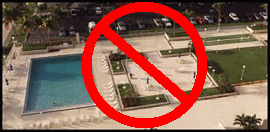 Provides that the association may suspend the use rights for the common elements, common facilities or any other association property if a unit owner is delinquent for more than ninety days in the payment of a monetary obligation due to the association, except that association may not suspend the right to use limited common elements intended to be used only by that unit, common elements that must be used to access the unit, utility services provided to the unit, parking spaces, or elevators. Fines up to $100 may be levied per violation; up to $1000 in the aggregate. Provides that the association may suspend the use rights for the common elements, common facilities or any other association property if a unit owner is delinquent for more than ninety days in the payment of a monetary obligation due to the association, except that association may not suspend the right to use limited common elements intended to be used only by that unit, common elements that must be used to access the unit, utility services provided to the unit, parking spaces, or elevators. Fines up to $100 may be levied per violation; up to $1000 in the aggregate.
 Provides that an association may also suspend the voting rights of a member due to nonpayment of any monetary obligation due to the association which is delinquent in excess of ninety days. The suspension ends upon full payment of all obligations currently due or overdue the association. Provides that an association may also suspend the voting rights of a member due to nonpayment of any monetary obligation due to the association which is delinquent in excess of ninety days. The suspension ends upon full payment of all obligations currently due or overdue the association.
Condominium Termination:
Amends 718.117(2) (a) 1., F.S., dealing with termination because of economic waste or impossibility. Provides that condominium may be terminated because of economic waste when the total estimated cost of construction or repairs necessary to construct the intended improvements or restore the improvements to their former condition or bring them into compliance with applicable laws or regulations exceeds the combined fair market value of the units in the condominium after completion of the construction or repairs.
Amends 718.117(19) to provide that the termination of a condominium does not bar the �filing of a declaration of condominium or an amended and restated declaration of condominium� affecting any portion of the same property (a more specific description of a post termination reformation).
Turnover of Condominiums from Developer:
Amends F.S. 718.301(1) (f) to provide that turnover shall occur when a receiver is appointed by the circuit court and is not discharged within 30 days of appointment, unless the court determines within 30 days after appointment that transfer of control would be detrimental to association or its members.
Condominium Bulk Buyers:
Creates the new �Distressed Condominium Relief Act (also known as bulk-buyer law). It is intended to stimulate the condominium market by encouraging purchasers to buy units in bulk, thereby thinning the currently bloated inventory. In a nutshell, it defines the extent to which successors to the developer, including the construction lender after a foreclosure and other bulk buyers and bulk assignees of condominium units, may be responsible for implied warranties.
Cooperative Provisions

Cooperative Associations - Fire Alarm Systems:
Cooperative Associations - Fire Sprinklers:
It amends s. 719.1055(5), F.S., to provide for a retrofit exemption to cooperative associations for a fire sprinkler system or any other form of engineered life safety system retrofitting sprinklers in a high rise building by the affirmative vote of two thirds of the voting interests. The bill provides that a previous vote to forego retrofitting may only be reconsidered once every three years at a special meeting called by a petition of 10% of the voting interests.
For associations that don�t opt out, the local authority having jurisdiction may not require completion of retrofitting of common areas with a sprinkler system or any other form of engineered life safety system before the end of 2019.
Cooperative Associations - Elevators:
Cooperative Associations - Filling Vacancies on Board:
Provides for filling of vacancies for remainder of the term by the affirmative vote of the majority of the remaining directors, even if they constitute less than a quorum or there is only one remaining director. Unless otherwise provided in Bylaws, a board member appointed or elected to fill a vacancy would serve the unexpired term of the seat being filled. In the alternative, the Board may hold an election to fill the vacancy.
Cooperative Associations - Collections/Foreclosures:
 The claim of lien may include cost for collection letters or any other collection effort by management companies or licensed managers as to any delinquency in installment of assessment, but may not exceed $75. Any payment received by the cooperative association must be applied to the costs for collection services for which the association has contracted before the payment is applied to the delinquent assessment. The claim of lien may include cost for collection letters or any other collection effort by management companies or licensed managers as to any delinquency in installment of assessment, but may not exceed $75. Any payment received by the cooperative association must be applied to the costs for collection services for which the association has contracted before the payment is applied to the delinquent assessment.
Provides that a lien may not be filed by the association until 30 days after a notice of intent to file the lien was sent certified mail, return receipt requested and by first class mail to the last address in the records of the association.
 Provides that if a unit is occupied by a tenant and that unit owner is delinquent in the payment of any monetary obligation to the association, the association may demand that the tenant pay to the association the future monetary obligations related to the condominium unit. Requires the association to mail written notice to the unit owner of the association�s demand that the tenant make payments to the association. Provides that if a unit is occupied by a tenant and that unit owner is delinquent in the payment of any monetary obligation to the association, the association may demand that the tenant pay to the association the future monetary obligations related to the condominium unit. Requires the association to mail written notice to the unit owner of the association�s demand that the tenant make payments to the association.
Provides that the liability of the tenant may not exceed the amount due from the tenant to the tenant�s landlord. Provides that the tenant�s landlord shall provide the tenant a credit against rents due to the unit owner in the amount of monies paid to the association. Provides that the association may sue for eviction as if the association were a landlord if the tenant fails to pay a required assessment to the association.
Corporations Not-for-Profit (Condominiums, Cooperatives, and HOAs):
Amends the corporations not-for-profit statute to provide that certain sections of the statute involving voting by members, removal of directors, and access to records, do not apply to associations regulated by Chapters 718, 719, and 720.
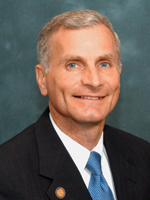 | | SENATOR MIKE FASANO |
Expanded and enhanced by vetting committees, the bills are accruing support from both lawmakers and homeowners. Senate Bill 1222 by Senator Jeremy Ring was merged into Senator Mike Fasano�s Senate Bill 1196 and passed the Senate Regulated Industries Committee by an 8-0 vote on March 3rd. On March 17th, the Military Affairs and Domestic Security Committee approved the bill by a 7-0 vote. By mid-April, it also will have been reviewed by the Senate�s Banking and Insurance Committee, Community Affairs Committee and Judiciary Committee.
 | | SENATOR JEREMY RING |
In the Statehouse, Bogdanoff and Hudson are comparably nursing House Bill 561 through committee reviews. On February 2nd, the House Civil Justice & Courts Policy Committee approved a Committee substitute by an 11-2 vote. On March 3rd, the Insurance, Business & Financial Affairs Policy Committee passed the bill by an 11-1 vote. On March 11th, the bill moved to its last committee stop, the Criminal & Civil Justice Policy Council. On March 15th, Delray Representative Maria Lorts Sachs merged her House Bill 1317, which duplicated many of the provisions found in Bogdanoff�s bill, into HB 561.
 To insure the passage of these bills, engaged homeowners have preceded each committee review with a blizzard of emails, phone calls, letters and faxes to the committee members, detailing the bill�s critical importance and supplicating support for the legislation. Despite unrelenting pressure to sink the bills by the Plumbers and Pipefitters Union and Sprinkler Association lobbyists bedecked in pre-retirement dress blues, lawmakers seem predisposed to mirror last year�s broad approval of the legislation�s objectives. While pleased with the bills� progress, homeowners have few illusions about the obstacles that lie ahead. After all, this isn�t their first time at the dance. To insure the passage of these bills, engaged homeowners have preceded each committee review with a blizzard of emails, phone calls, letters and faxes to the committee members, detailing the bill�s critical importance and supplicating support for the legislation. Despite unrelenting pressure to sink the bills by the Plumbers and Pipefitters Union and Sprinkler Association lobbyists bedecked in pre-retirement dress blues, lawmakers seem predisposed to mirror last year�s broad approval of the legislation�s objectives. While pleased with the bills� progress, homeowners have few illusions about the obstacles that lie ahead. After all, this isn�t their first time at the dance.

The Bottom Line: If YOU ask the Governor to support HB 561, you will avoid the huge sprinkler retrofit assessment and cut insurance costs. If you leave it to others... you won't. Life is rarely so simple. Take sixty seconds and Click Here to help send this pork project to the Tallahassee bone yard. More to come...
Click To Top of Page
George and Charlie on the Galt Mile


Serendipity!
George (Part 1)


 | GMCA PRESIDENT
PIO IERACI |
March 31, 2010 - On Thursday, March 4th, Galt Mile Community Association President Pio Ieraci received a late afternoon telephone call from Washington DC. He was intrigued when the caller identified himself as a staffer for United States Senator George LeMieux. The Senator�s aide told Ieraci that his boss was planning on traveling to Fort Lauderdale early next week, and the trip would afford him an opportunity to discuss healthcare with constituents. Ieraci felt some pressure building in the back of his neck when the staffer asked if he would help set up a Town Hall meeting for Senator LeMieux on Monday, in less than four days.
 If he agreed, Ieraci would have to book the hall and could only give potential attendees 3 days notice (only one business day - Friday). Two issues preoccupied Ieraci. Other than offering local residents a chance to �Meet Your Senator�, how could the neighborhood association agenda benefit from this unusual opportunity? Secondly, Ieraci was hesitant to accept any responsibility for the success of an event announced on Friday for Monday. To make things worse, the staffer asked Ieraci to await LeMieux�s confirmation before finalizing any plans. If he agreed, Ieraci would have to book the hall and could only give potential attendees 3 days notice (only one business day - Friday). Two issues preoccupied Ieraci. Other than offering local residents a chance to �Meet Your Senator�, how could the neighborhood association agenda benefit from this unusual opportunity? Secondly, Ieraci was hesitant to accept any responsibility for the success of an event announced on Friday for Monday. To make things worse, the staffer asked Ieraci to await LeMieux�s confirmation before finalizing any plans.
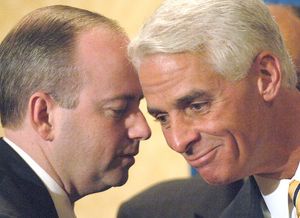 | | LEMIEUX AND CRIST |
The Governor�s former Chief of Staff, LeMieux was appointed by Crist to the Senate seat vacated by Mel Martinez. A close political ally and confidante, LeMieux encouraged Crist to run for the office he temporarily occupies. LeMieux was still in Tallahassee last summer when Senators and Congresspersons solicited constituents for healthcare feedback. Despite having aligned with Tallahassee Republicans in declaring his opposition to President Obama�s initiative to reduce healthcare costs and increase access, Florida lawmakers were expecting LeMieux to somehow return to Florida with $1.2 billion in Federal Medicaid money and plug the State�s budget gap.
 | | GOVERNOR CRIST ANNOUNCES SB 714 VETO |
Ieraci called the Beach Community Center; a forum previously deployed by the neighborhood association for similar events, and checked the auditorium�s availability. When Community Center Manager Susan Riestra said the date was temporarily clear, Ieraci grabbed it. He made some quick calls to GMCA Directors, pondering a response to LeMieux. The discussion centered on Lemieux�s close relationship with Crist.
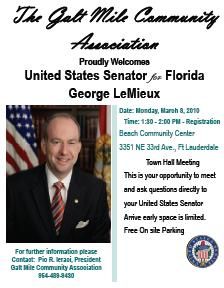 The neighborhood association was deeply involved with a campaign to enlist the Governor�s support for sprinkler retrofit relief. Legislators in Tallahassee had unanimously approved bills in 2006 and 2009 that offered financially besieged homeowners relief from a $multi-billion payout to the fire sprinkler industry as mandated by a highly questionable 2002 statute. Despite its overwhelming support by lawmakers and homeowners, the Governor vetoed Senate Bill 714 after last year�s legislative session. If LeMieux could be prevailed upon to ask that the Governor NOT VETO Ellyn Bogdanoff�s 2010 relief bill (HB 561), Ieraci believed that the significant effort required to actualize the meeting could be justified. When he received the green light from LeMieux later Thursday night, a campaign to notify neighborhood residents was launched. Hundreds of emails were sent to surrounding communities, public officials and member associations. Notices were called to local newspapers and posted on the GMCA web site. Flyers were created, printed and hand delivered to GMCA member associations. The meeting notices were posted as retrofit relief supporters from other parts of Florida cobbled together last minute plans to attend the event. The neighborhood association was deeply involved with a campaign to enlist the Governor�s support for sprinkler retrofit relief. Legislators in Tallahassee had unanimously approved bills in 2006 and 2009 that offered financially besieged homeowners relief from a $multi-billion payout to the fire sprinkler industry as mandated by a highly questionable 2002 statute. Despite its overwhelming support by lawmakers and homeowners, the Governor vetoed Senate Bill 714 after last year�s legislative session. If LeMieux could be prevailed upon to ask that the Governor NOT VETO Ellyn Bogdanoff�s 2010 relief bill (HB 561), Ieraci believed that the significant effort required to actualize the meeting could be justified. When he received the green light from LeMieux later Thursday night, a campaign to notify neighborhood residents was launched. Hundreds of emails were sent to surrounding communities, public officials and member associations. Notices were called to local newspapers and posted on the GMCA web site. Flyers were created, printed and hand delivered to GMCA member associations. The meeting notices were posted as retrofit relief supporters from other parts of Florida cobbled together last minute plans to attend the event.
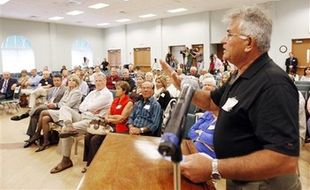 | | LEO HERZCEG COMPLAINS ABOUT INSURANCE COSTS |
By the Monday afternoon start time, roughly 150 attendees arrived at the Community Center from Naples, the Space Coast and Tampa as well as Pompano, Central Beach and the Galt Mile. Questions for the Senator were collected at a registration desk. Without notice, the Senator�s staffers excised scores of questions about the sprinkler retrofit, leaving about a dozen health care inquiries. Angry about the staffers� surreptitious censure, Pio secured permission for one Naples resident to deliver a request to LeMieux.
 | EWING SUTHERLAND ASKS
LEMIEUX'S HELP WITH CRIST |
Retrofit relief proponent Ewing Sutherland, who sits on the Community Advocacy Network (CAN) Advisory Board with Ieraci and led a contingent of Collier County anti-retrofit association members to the meeting, asked LeMieux to deter the Governor from vetoing Bogdanoff�s relief bill. Comprised of 1,800 member communities from across the State, CAN is a pro-association organization that lobbies Tallahassee lawmakers to enact legislation on behalf of common interest communities.
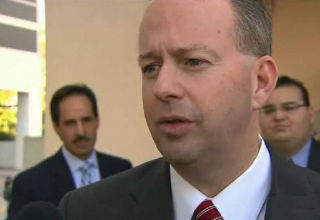 | | LEMIEUX MEETS WITH PIO IERACI AFTER EVENT |
Fort Lauderdale Mayor Jack Seiler stepped up and surprised LeMieux by announcing that the City Commission had passed a resolution supporting the bill and sent it to Governor Crist. He informed the Senator that dozens of other jurisdictions, including Broward County, were preparing similar resolutions for Governor Crist. LeMieux couldn�t help but notice that the resulting ovation outlasted his own. Aware that his staffers� actions may have alienated a community he was hoping to win over, LeMieux met with Ieraci to effect some political fence-mending. The Senator promised to convey concerns about the impending sprinkler retrofit to the Governor. Since most of the anti-retrofit audience was unaware of LeMieux�s post meeting caucus with Ieraci, they were understandably disappointed with the event�s outcome upon departing the Center.
Charlie (Part 2)

 | | MAYOR SEILER AND GOV CRIST AT ST PATRICKS PARADE |
Two days later, Ieraci received a call from the Governor�s office. Governor Crist was in town to fulfill his obligation as Grand Marshal of the March 13th St. Patrick�s Day Parade. Crist invited Ieraci and a small contingent to meet Thursday morning at the Riverside Hotel to discuss their concerns about the sprinkler retrofit dilemma over breakfast.
 | | DONNA BERGER |
The GMCA president contacted Community Advocacy Network Executive Director Donna Berger and GMCA Vice President Eric Berkowitz, two allies whose intimate familiarity with the history and issues surrounding the sprinkler retrofit would prove invaluable for the next morning�s meeting with the Governor. Although unsure about the exact events that precipitated the Governor�s invitation, all the participants adjusted their schedules to accommodate this unique opportunity.
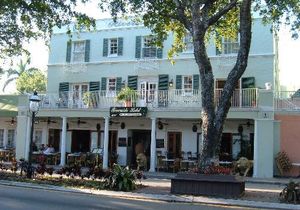 | | INDIGO RESTAURANT AT RIVERSIDE HOTEL |
The next morning, they met Governor Crist in the Hotel�s Indigo Restaurant at 9:30 AM. After exchanging pleasantries and reminiscing about the Galt Mile community�s unbridled exhilaration when the Governor terminated the threatened Calypso Liquefied Natural Gas plant, Ieraci described the financial impact that this inequitable retrofit requirement will have on associations and unit owners struggling to survive. As the discussion progressed, it became clear that the Governor was largely unfamiliar with the disabling consequences threatened by the retrofit. He also seemed surprised when told about some of the conflicted relationships between the Fire Marshals and the Sprinkler Associations. In fact, it appeared as if his knowledge about the mandate and its ramifications was limited to anecdotal spin from the pro-retrofit Fire Sprinkler associations and several retired Fire Marshals they hired as lobbyists along with current employees of the Fire Marshals union they employ in management positions.
 | CHUCK AKERS - EXECUTIVE
DIRECTOR - FFMIA & AFSA
|
Executive Director Chuck Akers of the Florida Fire Marshals and Inspectors Association (FFMIA) is also the Executive Director of the American Fire Sprinkler Association (AFSA), an industry trade organization incorporated to market sprinkler systems. FFMIA lifetime member Buddy Dewar is the Vice President of Regional Operations for the National Fire Sprinkler Association (NFSA) and a lobbyist for the Florida Fire Sprinkler Association. Boding to �amend our campaign donations list,� Dewar lobbied the Governor to veto last year�s retrofit relief while working with Dave Ramba, a lobbyist for $18 billion conglomerate and fire sprinkler manufacturer Tyco Products.
 | FFMIA's & NFSA's
BUDDY DEWAR |
The Governor admitted to sympathizing with the plight of common interest community homeowners, acknowledging the burden placed on unit owners by foot dragging foreclosing banks, newly implemented constrictive lending policies that inhibit recovery and delinquent speculators who force their neighbors to assume their obligations. He said that his office was flooded with thousands of emails and letters attesting to the terrible strain on homeowners and characterizing this additional obligation as unnecessary and unconscionable.
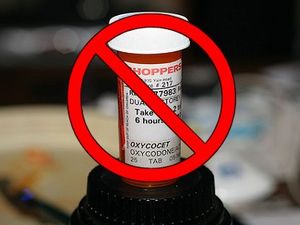 Ieraci, Berkowitz and Berger concentrated on explaining the environment in which unit owners were currently struggling to survive, impressing on the Governor the large percentage of retirees living on fixed incomes that were often paying maintenance charges and property taxes at the expense of medications and/or physical therapy. No longer able to survive on Social Security, pension or 401k plan income, elderly residents are rapidly depleting reverse mortgage accounts to buy food and pay FP&L bills. Berger repeated a query she shared with CAN members a few weeks earlier, asking the Governor �Is it preferable to live in a concrete block building without sprinklers or live under a bridge?� Ieraci, Berkowitz and Berger concentrated on explaining the environment in which unit owners were currently struggling to survive, impressing on the Governor the large percentage of retirees living on fixed incomes that were often paying maintenance charges and property taxes at the expense of medications and/or physical therapy. No longer able to survive on Social Security, pension or 401k plan income, elderly residents are rapidly depleting reverse mortgage accounts to buy food and pay FP&L bills. Berger repeated a query she shared with CAN members a few weeks earlier, asking the Governor �Is it preferable to live in a concrete block building without sprinklers or live under a bridge?�
  Ieraci explained that since associations were keenly aware of the large number of members that were fighting monthly battles to make ends meet, they were postponing all but the most inexpensive assessments, hoping to avoid a disastrous fiscal chain reaction that could easily drop them into bankruptcy. He estimated that �10 to 15% of our unit owners would be forced out by a sprinkler retrofit, and that�s only because Galt Mile associations are in relatively good shape compared to most associations around the state.� Ieraci continued �The remaining owners would then be assessed the resulting shortfall, pushing out another 10%.� Berkowitz described a dilemma that currently confronts every association board �If 30% to 40% of the units become non-contributory, who is supposed to pay these huge assessments? Since banks won�t finance associations plagued by sizable numbers of foreclosures or otherwise non-contributing units, these threatened payouts will force many associations into dissolution.� Ieraci explained that since associations were keenly aware of the large number of members that were fighting monthly battles to make ends meet, they were postponing all but the most inexpensive assessments, hoping to avoid a disastrous fiscal chain reaction that could easily drop them into bankruptcy. He estimated that �10 to 15% of our unit owners would be forced out by a sprinkler retrofit, and that�s only because Galt Mile associations are in relatively good shape compared to most associations around the state.� Ieraci continued �The remaining owners would then be assessed the resulting shortfall, pushing out another 10%.� Berkowitz described a dilemma that currently confronts every association board �If 30% to 40% of the units become non-contributory, who is supposed to pay these huge assessments? Since banks won�t finance associations plagued by sizable numbers of foreclosures or otherwise non-contributing units, these threatened payouts will force many associations into dissolution.�
 Berger raised the �Towering Inferno� scare tactics used by the sprinkler associations to intimidate lawmakers. Ieraci told the Governor, �In 50 years, the Galt Mile has had several fires of note. One was on the roof of a building, another was started by a defective electrical bus and two were caused by lunatics trying to cook illegal drugs. They were all extinguished within minutes.� Berkowitz added �Placing sprinkler heads in unit foyers and common areas of high rise concrete block buildings was never intended for extinguishing fires. It was only perceived to provide a moderately safe egress in buildings with inadequate detection capabilities and insufficient compartmentation characteristics. These conditions don�t exist in the code-compliant concrete block structures facing expensive partial sprinkler retrofits � such as those along the Galt Mile.� Quoting Representative Bogdanoff, Ieraci informed the Governor �In the past 30 years, not one fire-related injury in Florida would have been prevented by compliance with this statute.� Berger raised the �Towering Inferno� scare tactics used by the sprinkler associations to intimidate lawmakers. Ieraci told the Governor, �In 50 years, the Galt Mile has had several fires of note. One was on the roof of a building, another was started by a defective electrical bus and two were caused by lunatics trying to cook illegal drugs. They were all extinguished within minutes.� Berkowitz added �Placing sprinkler heads in unit foyers and common areas of high rise concrete block buildings was never intended for extinguishing fires. It was only perceived to provide a moderately safe egress in buildings with inadequate detection capabilities and insufficient compartmentation characteristics. These conditions don�t exist in the code-compliant concrete block structures facing expensive partial sprinkler retrofits � such as those along the Galt Mile.� Quoting Representative Bogdanoff, Ieraci informed the Governor �In the past 30 years, not one fire-related injury in Florida would have been prevented by compliance with this statute.�
 | FORMER DEPUTY INSURANCE
COMMISSIONER LISA MILLER |
Further addressing the theoretical life safety value of the statutory �Minimum Alternative Life Safety System,� Berkowitz reminded the Governor about the results of the Sprinkler Retrofit Report mandated when he vetoed the retrofit relief in last year�s Senate Bill 714. Governor Crist asked the Department of Business and Professional Regulation (DBPR) to investigate any insurance benefits that would accrue to associations for complying with the sprinkler statute. Sprinkler associations had repeatedly pointed to insurance premium reductions as the only reliable measure of a safety benefit. After assessing the statute�s life safety benefit, the insurance industry (ISO) declared the mandated partial sprinkler retrofit unworthy of any premium reduction � clearly contradicting claims to the contrary repeatedly made by Sprinkler Association spokespersons. �Former Deputy Insurance Commissioner Lisa Miller also confirmed that buildings retrofitted with the statutory �Minimum Alternative Life Safety System� would receive the same rating as buildings without any sprinklers,� said Berkowitz. In addition to the absence of a rated life safety benefit, the threat of false alarms and system malfunctions would increase the association�s vulnerability to significant water damage, driving up insurance costs.
 Finally, the discussion turned to the statute�s legal basis. Every state in the country roots its fire prevention regulations in the National Fire Protection Association�s (NFPA) Life Safety Code. The Florida Fire Prevention Code is also based on this universally respected set of guidelines. Not surprisingly, sprinkler association lobbyists based their marketing campaign for the statute on the fact that 49 other states can�t be wrong. Of course, they are correct. Berger, an activist attorney with impeccable credentials as an expert in association law, asked the Governor if he was aware that when every other state incorporated the life safety code provisions into State law, they exempted existing structures from retrofit compliance. The Governor did a double take and asked �Is that true?� Berger responded �Florida is the only State in the union that didn�t grandfather compliance for existing high rise buildings when the statute was implemented.� She went on to describe how retrofit lobbyists showered lawmakers with documentation exclaiming the importance of following the lead of our sister states, although omitting this minor detail. Why? Evidently, the Florida Fire Sprinkler industry wasn�t satisfied by the prospect of installing thousands of systems in new buildings. They refused to leave $billions in retrofit business on the table. Finally, the discussion turned to the statute�s legal basis. Every state in the country roots its fire prevention regulations in the National Fire Protection Association�s (NFPA) Life Safety Code. The Florida Fire Prevention Code is also based on this universally respected set of guidelines. Not surprisingly, sprinkler association lobbyists based their marketing campaign for the statute on the fact that 49 other states can�t be wrong. Of course, they are correct. Berger, an activist attorney with impeccable credentials as an expert in association law, asked the Governor if he was aware that when every other state incorporated the life safety code provisions into State law, they exempted existing structures from retrofit compliance. The Governor did a double take and asked �Is that true?� Berger responded �Florida is the only State in the union that didn�t grandfather compliance for existing high rise buildings when the statute was implemented.� She went on to describe how retrofit lobbyists showered lawmakers with documentation exclaiming the importance of following the lead of our sister states, although omitting this minor detail. Why? Evidently, the Florida Fire Sprinkler industry wasn�t satisfied by the prospect of installing thousands of systems in new buildings. They refused to leave $billions in retrofit business on the table.
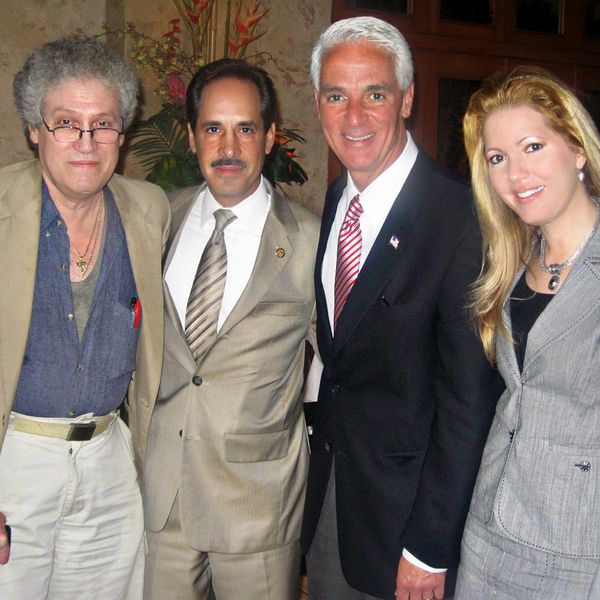 | ERIC BERKOWITZ, PIO IERACI, GOV CRIST & DONNA BERGER
GOVERNOR REFUTES BOGUS 'INTENT TO VETO' REPORT |
Berger then spoke to what she framed as the heart of this issue, self-governance. While lawmakers are responsible for insuring a safe and secure public domain, the constitution and Florida law transfers that responsibility to homeowners within the confines of their homes. Florida law also recognizes home rule for unit owners in common interest communities. Homeowners who will have to live with and pay for these decisions are better equipped to make them than lobbyists looking for a production bonus or poorly informed and often conflicted lawmakers. By confirming that homeowners should be allowed to decide for themselves what measures are necessary to insure safety within their own homes, Berger concluded �the retrofit relief bills will absolve public officials of any consequences that result from those decisions.�
 The Governor exclaimed that he was considering the retrofit relief legislation favorably. He also said that his office would continue to monitor the correspondences of concerned homeowners. As the meeting ended, Donna Berger asked the Governor if he would explain an unusual event that occurred the previous week. It was reported that he had mentioned at a news briefing in Tallahassee that he might veto the legislation again. Curious about his reason for commenting on legislation before it was acted upon by the legislature, Berger asked Crist about the incident. Crist explained that at some point during a general press briefing, he simply stated that lives were more important than money. A reporter took the liberty of interpreting his remark as a threat to veto the bill. He assured us that the report was baseless. The Governor exclaimed that he was considering the retrofit relief legislation favorably. He also said that his office would continue to monitor the correspondences of concerned homeowners. As the meeting ended, Donna Berger asked the Governor if he would explain an unusual event that occurred the previous week. It was reported that he had mentioned at a news briefing in Tallahassee that he might veto the legislation again. Curious about his reason for commenting on legislation before it was acted upon by the legislature, Berger asked Crist about the incident. Crist explained that at some point during a general press briefing, he simply stated that lives were more important than money. A reporter took the liberty of interpreting his remark as a threat to veto the bill. He assured us that the report was baseless.
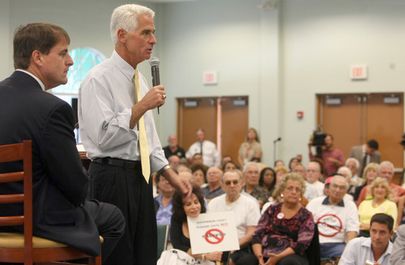 | | WHEN GOV CRIST KILLED CALYPSO |
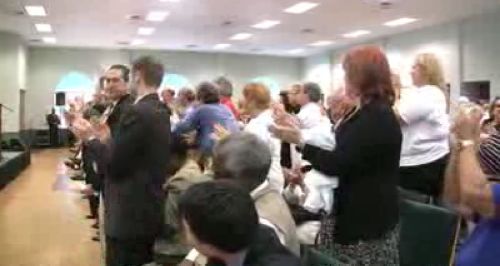 | | GALT MILE APPLAUDS GOVERNOR CRIST |
After thanking the Governor for his time and attention, he returned the compliment and promised to make the right decision. While heading for the exit, Governor Crist asked if we could arrange another town hall style meeting at the Beach Community Center, similar to the one wherein he announced the demise of Calypso. Ieraci told the Governor that we would be delighted to provide an appropriate forum wherein he could �make the right decision.�
YOU! (Part 3)

 While the meeting's results were encouraging, this struggle is by no means over. The Fire Marshals and other lobbyists working for the Sprinkler Associations will subject the Governor to unrelenting pressure for the $multi-billion stimulus package. Since the Governor's political handlers are continuously assessing your support for the retrofit relief in HB 561 and SB 1196, only our emails, letters and phone calls will mollify the efforts of these influence peddlers. The fight is over your money. They stand to take it. You stand to lose it. This is a no-brainer. SEND AN EMAIL - NOW! More to come... While the meeting's results were encouraging, this struggle is by no means over. The Fire Marshals and other lobbyists working for the Sprinkler Associations will subject the Governor to unrelenting pressure for the $multi-billion stimulus package. Since the Governor's political handlers are continuously assessing your support for the retrofit relief in HB 561 and SB 1196, only our emails, letters and phone calls will mollify the efforts of these influence peddlers. The fight is over your money. They stand to take it. You stand to lose it. This is a no-brainer. SEND AN EMAIL - NOW! More to come...

|
| | Governor Charlie Crist |
| |
| The Capitol | Phone: (850) 488-7146 |
| 400 South Monroe Street | Fax: (850) 487-0801 |
| Tallahassee, Florida 32399 | Email: [email protected] |
|
Also, please click the Email addresses of those with whom the Governor will consult:
TO REACH ALL FOUR PUBLIC OFFICIALS WITH A SINGLE EMAIL, Click Here.

Click To Top of Page



 


 | | GOVERNOR SIGNS 2010 BILLS |
June 14, 2010 - When the legislature sends a successful bill to the Governor, he has 15 days to sign, veto or ignore it, in which case, the bill is enacted into law - as if it were signed. After Senate Bill 1196 - the omnibus association bill - was sent to the Governor�s desk on May 17th, supporters spent each of the next 15 days agonizing over whether the bill would survive for another 24 hours. Given the fate of its two prior incarnations, the best they could hope for was that it would remain undisturbed on the Governor�s desk. At the June 1st deadline, he surprised and delighted proponents when he demonstrated active support for the bill�s provisions by signing it instead of enacting it passively. After all, the bill intensified an agenda that had already prompted two gubernatorial vetoes.
 The legislation�s passage has all the trappings of a success story. To survive, the Bill had to circumvent significant obstacles erected by many of the State�s most formidable lobbies. For the first time in over a decade, controversial Association legislation didn�t self-destruct in deference to directives handed down by special interests. The legislation�s passage has all the trappings of a success story. To survive, the Bill had to circumvent significant obstacles erected by many of the State�s most formidable lobbies. For the first time in over a decade, controversial Association legislation didn�t self-destruct in deference to directives handed down by special interests.
 Florida law (Section 718.116(1)(b), F.S.) required foreclosing lenders to pay associations six months of past due assessments or one percent of the original mortgage debt (whichever is less). Refusing to acknowledge any obligation whatsoever, the bank lobby formulated a 3-part strategy to legally avoid compliance with the statute. Although they regularly rolled out legislation designed to reverse or at least obfuscate the existing statutory obligation, their bills consistently failed because lawmakers feared being publically roasted for coddling the industrial progenitor of the State�s current economic plight. Florida law (Section 718.116(1)(b), F.S.) required foreclosing lenders to pay associations six months of past due assessments or one percent of the original mortgage debt (whichever is less). Refusing to acknowledge any obligation whatsoever, the bank lobby formulated a 3-part strategy to legally avoid compliance with the statute. Although they regularly rolled out legislation designed to reverse or at least obfuscate the existing statutory obligation, their bills consistently failed because lawmakers feared being publically roasted for coddling the industrial progenitor of the State�s current economic plight.
 | FLORIDA BANKERS ASSOCIATION
PRESIDENT ALEX SANCHEZ |
The second leg of their assessment-dodging strategy exploits a statutory loophole. By avoiding the final stage in the foreclosure process - assuming title to the property - they could also avoid triggering their statutory obligation. In January, Florida Bankers Association President Alex Sanchez admitted, �These cases are stuck in legal limbo because banks don�t want to push foreclosures. I�ve seen cases where nothing is done. The lenders don�t want these homes back. They know they have to pay assessments once they take them back.�
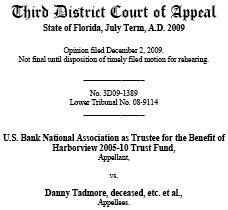 When a 2009 Miami Court decision characterized this subterfuge as unfair and ordered the U.S. Bank National Association to start paying a condo association their $939.56 monthly maintenance fee, the bank waltzed into the Third District Court of Appeal for Miami-Dade where the ruling was reversed. In its opinion, the Appellate Court made the cynical observation that �in its quest to do equity, a court cannot trammel the legal rights of the parties.� This judicially suspect decision served notice on cash-strapped Associations - they would have to face off with the banks� 600 pound lobbying gorilla in Tallahassee. When a 2009 Miami Court decision characterized this subterfuge as unfair and ordered the U.S. Bank National Association to start paying a condo association their $939.56 monthly maintenance fee, the bank waltzed into the Third District Court of Appeal for Miami-Dade where the ruling was reversed. In its opinion, the Appellate Court made the cynical observation that �in its quest to do equity, a court cannot trammel the legal rights of the parties.� This judicially suspect decision served notice on cash-strapped Associations - they would have to face off with the banks� 600 pound lobbying gorilla in Tallahassee.
 | J. THOMAS CARDWELL
FIN. REG. COMMISSIONER |
Segue to part 3 of the Bank Industry strategy. For years, whenever legislation seeking to close the gaping liability loophole or expand the statutory cap accrued momentum, a bank industry spokesperson would quietly whisper to lawmakers, �If it passes, no more condo mortgages,� - and the bill would disappear overnight. In 2009, nine bills were filed that expanded the statutory cap and/or affixed time limits to the assumption of title. When General Counsel J. Thomas Cardwell of the Florida Bankers Association announced �These bills could severely damage the ability to obtain financing on condos, and because of that, would do much more damage to condos and condo associations than they would do good,� the legislative leadership unabashedly announced that any bill increasing lenders� costs wouldn�t survive (Cardwell changed hats a few months later and is currently Commissioner for the Office of Financial Regulation). The banking industry has been buying legislative access for decades. Without breaking a sweat, they�ve managed to curtail any bill perceived as onerous to their member lenders.
 Comparable leverage applied by the insurance and fire safety industries elicited similar results, either on the floor or in the Governor�s office. After Hurricane Andrew, many insurance companies were thoroughly decimated while others faced imminent financial collapse. Exercising a survival instinct, carriers expanded the functionality of their Trade Organization, morphing it from a marketing vehicle into a war council. Highly competitive carriers with obsessively covert corporate policies were suddenly comrades-in-arms. Instead of merely extolling the virtues of insurance to prospective clients, the trade organization became ground zero for a statewide political strategy. Spontaneously reacting to the serial hurricanes of 2004 and 2005, they succeeded in unraveling decades of protective regulations by unifying behind a threat to leave the State. Comparable leverage applied by the insurance and fire safety industries elicited similar results, either on the floor or in the Governor�s office. After Hurricane Andrew, many insurance companies were thoroughly decimated while others faced imminent financial collapse. Exercising a survival instinct, carriers expanded the functionality of their Trade Organization, morphing it from a marketing vehicle into a war council. Highly competitive carriers with obsessively covert corporate policies were suddenly comrades-in-arms. Instead of merely extolling the virtues of insurance to prospective clients, the trade organization became ground zero for a statewide political strategy. Spontaneously reacting to the serial hurricanes of 2004 and 2005, they succeeded in unraveling decades of protective regulations by unifying behind a threat to leave the State.
 | GOVERNOR CRIST AND COMMISSIONER
MCCARTY ANNOUNCE ALLSTATE SUBPOENAS |
After the industry negotiated a huge 2007 rate increase in exchange for tying future rates to costs, Senate Hearings in 2008 uncovered a scam in which Allstate and other major carriers applied for enormous rate hikes based upon fraudulent data that was reverse engineered by affiliated and subsidiary Hurricane Modeling Companies. Although caught red-handed, they refused to release subpoenaed evidentiary documentation, arrogantly thumbing their nose at Jeff Atwater�s Senate Insurance Committee and Insurance Commissioner Kevin McCarty. Since then, the industry has kept the legislature hopping from one foot to the other as lawmakers desperately try to rebuild the Florida market by appeasing carriers with a history of lying to the state and ripping off policyholders.
 While the Fire Safety Industry (Sprinkler Associations) has neither the organizational pedigree nor the political panache to scuttle bills with the arrogance repeatedly demonstrated by their counterparts in the banking and insurance lobbies, they found an effective leverage venue that worked for nearly a decade. After creating high-visibility marketing and lobbying positions for retired Fire Marshals and employees of the Fire Marshals� union, they are sent - fully uniformed - into the Senate and Statehouse, distributing sound bite CDs of mini-Towering Inferno-style clips to passing lawmakers. While it sounds like a strategy more appropriate to running for student council in the eleventh grade, it worked well enough to generate the pork barrel sprinkler package of 2002. When the tactic no longer intimidated legislators who overwhelmingly passed relief bills in 2006 and 2009, the Sprinkler Association lobbyists redirected their pressure to the Governor�s office - eliciting two controversial vetoes. While the Fire Safety Industry (Sprinkler Associations) has neither the organizational pedigree nor the political panache to scuttle bills with the arrogance repeatedly demonstrated by their counterparts in the banking and insurance lobbies, they found an effective leverage venue that worked for nearly a decade. After creating high-visibility marketing and lobbying positions for retired Fire Marshals and employees of the Fire Marshals� union, they are sent - fully uniformed - into the Senate and Statehouse, distributing sound bite CDs of mini-Towering Inferno-style clips to passing lawmakers. While it sounds like a strategy more appropriate to running for student council in the eleventh grade, it worked well enough to generate the pork barrel sprinkler package of 2002. When the tactic no longer intimidated legislators who overwhelmingly passed relief bills in 2006 and 2009, the Sprinkler Association lobbyists redirected their pressure to the Governor�s office - eliciting two controversial vetoes.
 All three of these powerful lobbies were well motivated to align against the Bill. One of the provisions in SB 1196 doubles a foreclosing lender�s �statutory cap� from six months of past due assessments/one percent of original mortgage debt (whichever is less) to twelve months past due assessments/one percent of original mortgage debt (whichever is less). When similar provisions were proposed in six of the eight previous legislative sessions, they were mercilessly stamped out by bank lobbyists. One of the many insurance fixes in SB 1196 reverses a provision that forces every condo owner to purchase HO-6 unit owner insurance for their homes (while naming the Association as an additional insured). The Insurance Industry had an enormous stake in retaining this huge block of customers made captive by statute. Also, after engineering their bogus sprinkler mandate in 2002 and subsequently manipulating two Governors into vetoing unanimously passed and desperately needed relief, Sprinkler Associations were unable to thwart the sprinkler retrofit opt-out provision in SB 1196. Suddenly, the $billions in expected Industry revenues guaranteed by statute will instead remain in the pockets of unit owners - where it belongs. All three of these powerful lobbies were well motivated to align against the Bill. One of the provisions in SB 1196 doubles a foreclosing lender�s �statutory cap� from six months of past due assessments/one percent of original mortgage debt (whichever is less) to twelve months past due assessments/one percent of original mortgage debt (whichever is less). When similar provisions were proposed in six of the eight previous legislative sessions, they were mercilessly stamped out by bank lobbyists. One of the many insurance fixes in SB 1196 reverses a provision that forces every condo owner to purchase HO-6 unit owner insurance for their homes (while naming the Association as an additional insured). The Insurance Industry had an enormous stake in retaining this huge block of customers made captive by statute. Also, after engineering their bogus sprinkler mandate in 2002 and subsequently manipulating two Governors into vetoing unanimously passed and desperately needed relief, Sprinkler Associations were unable to thwart the sprinkler retrofit opt-out provision in SB 1196. Suddenly, the $billions in expected Industry revenues guaranteed by statute will instead remain in the pockets of unit owners - where it belongs.
 Since the legislative dynamic in Tallahassee hasn�t undergone some cathartic sea change and lobbyists still command enormous resources, the question remains - how did legislation with so many powerful enemies survive a process ordinarily controlled by the highest bidder? Since the legislative dynamic in Tallahassee hasn�t undergone some cathartic sea change and lobbyists still command enormous resources, the question remains - how did legislation with so many powerful enemies survive a process ordinarily controlled by the highest bidder?
 | | REP. ELLYN BOGDANOFF FILES HB 561 |
After Governor Crist vetoed the extremely popular 2009 Association Glitch Bill - SB 714 - the ensuing backlash provided many of the key ingredients required for this year�s successful effort. Representative Ellyn Bogdanoff sponsored the House version (HB 419) of last year�s ill-fated Glitch Bill. While she managed its unanimous passage through the Statehouse, the Governor indicated his support for the Bill. Upon learning about the devious tactics applied by the Sprinkler Associations in �flipping� the Governor, she had blood in her eyes. She committed to taking off the gloves and insuring that this year�s version (HB 561) wouldn�t fall prey to the same �obstacles.� Most of the bill�s Condo and Co-op provisions are her doing. While sponsoring 15 other bills and co-sponsoring 19 more, she nursed this one through every hard-fought round.
 | | GOVERNOR CRIST ANNOUNCES SB 714 VETO |
Crist�s frustrating veto had a compelling effect on Associations and unit owners as well. Instead of sending another polite request to their representatives with a legislative wish list, they decided to take a page from their opponent�s playbook. Although unable to provide the unlimited campaign funding and marketing resources generally used as legislative currency, they had something equally valuable - deep reserves of registered voters in key districts throughout the State. The timing was also providential, as most of Tallahassee�s upwardly mobile �Masters-of-the-Universe� are currently embroiled in heated campaigns en route to the next stage in their political ascendency. The math was simple. The 2 million unit owners affected by this legislation were more than enough to critically impact every major race in the State, a fact not lost on the Governor or relevant legislators.
 | ERIC BERKOWITZ, PIO IERACI, GOV CRIST & DONNA BERGER
DISCUSS NEED FOR SPRINKLER RETROFIT RELIEF |
Politically active neighborhood associations; homeowners, condominium and cooperative associations; huge multi-jurisdictional Umbrella Homeowner groups (like the Space Coast Communities Association) and affiliated civic groups coalesced in support of Senate Bill 1196. Common Interest Advocacy organizations such as the Community Advocacy Network (CAN) and the Community Association Leadership Lobby (CALL), offshoots of the powerful Association law firms of Katzman Garfinkel Berger and Becker Poliakoff, provided daily access to session progress and a broad communications platform that enabled Associations from many statewide jurisdictions to develop and stage pro-active strategies. They also provided invaluable lobbying capabilities, reaching into in the Statehouse, the Senate and the Governor�s Office. Some of their key leadership personnel, such as CAN Executive Director Donna Berger, interpreted the legal implications of quickly changing events throughout the session. Grass roots participants, such as the Galt Mile Community Association, would endeavor to keep member associations and their unit owners abreast of and responsive to unfolding events.
 The neighborhood associations also engaged local municipal and county governments to promote their unit owners� legislative interests, resulting in supportive Resolutions from the City of Fort Lauderdale, the City of Naples, the City of Miami Beach, Lauderdale-by-the-Sea, Broward County, Collier County, Miami-Dade County, Miramar and many other local forums across the State. While the unified Association response set the table for this year�s remarkable success, the deciding factor was hundreds of thousands of emails, letters, faxes and phone calls received by lawmakers and the Governor. Make no mistake � you are the reason why this bill was signed into law. The neighborhood associations also engaged local municipal and county governments to promote their unit owners� legislative interests, resulting in supportive Resolutions from the City of Fort Lauderdale, the City of Naples, the City of Miami Beach, Lauderdale-by-the-Sea, Broward County, Collier County, Miami-Dade County, Miramar and many other local forums across the State. While the unified Association response set the table for this year�s remarkable success, the deciding factor was hundreds of thousands of emails, letters, faxes and phone calls received by lawmakers and the Governor. Make no mistake � you are the reason why this bill was signed into law.
 SB 1196 is far from a cure-all for associations. Foreclosing banks should be responsible for every nickel of assessments due on repossessed units. The financial relief provided to associations for sprinkler installations and Phase II Firefighter service for elevators should never have been necessary to begin with. These observations don�t diminish the unique nature of this 2010 legislative landmark. SB 1196 is far from a cure-all for associations. Foreclosing banks should be responsible for every nickel of assessments due on repossessed units. The financial relief provided to associations for sprinkler installations and Phase II Firefighter service for elevators should never have been necessary to begin with. These observations don�t diminish the unique nature of this 2010 legislative landmark.
 | | SENATOR JOE NEGRON |
Thousands of constituents that contacted lawmakers and the Governor didn�t simply supply reasons for supporting the Retrofit Relief bill. When they learned about other bills that would adversely affect their homes, many added these concerns to their correspondences.  The Governor was similarly inundated with objections to Senate Bill 1964, an outrageous attempt to immunize Design Professionals from legal redress. Any disastrous consequence resulting from negligence, incompetence, failure to perform or breach of contract by architects, interior designers, landscape architects, engineers, & surveyors would be legally classified as bad karma and filed under �tough luck�. Sponsored by a Transportation Engineer in the Statehouse (Stephen Precourt) and an amateur architect in the Senate (Joe Negron), while rendering design professionals judgment-proof and treating their work product as an Act of God, the final bills were somehow voted favorably in both houses. While the Governor was understandably uncomfortable with this legislation, the thousands of negative correspondences received by his office facilitated a well-deserved veto. The Governor was similarly inundated with objections to Senate Bill 1964, an outrageous attempt to immunize Design Professionals from legal redress. Any disastrous consequence resulting from negligence, incompetence, failure to perform or breach of contract by architects, interior designers, landscape architects, engineers, & surveyors would be legally classified as bad karma and filed under �tough luck�. Sponsored by a Transportation Engineer in the Statehouse (Stephen Precourt) and an amateur architect in the Senate (Joe Negron), while rendering design professionals judgment-proof and treating their work product as an Act of God, the final bills were somehow voted favorably in both houses. While the Governor was understandably uncomfortable with this legislation, the thousands of negative correspondences received by his office facilitated a well-deserved veto.
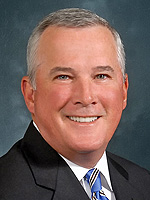 | | SEN. GARRETT RICHTER |
The Governor also scrambled Senate Bill 2044, despite the veiled threats by an army of irate insurance lobbyists. Bills drafted by the Insurance Industry are ordinarily given wide berth when considered. Senate Banking and Insurance Chair Garrett S. Richter�s handiwork was chock full of expensive regulatory goodies characterized by Insurance denizens as critical for the industry�s wellbeing. They included the right to bypass current Office of Insurance Regulation (OIR) petition procedures when raising their rates by more than 10% and the right to alter the terms of a policy upon renewal by burying the words �Notice of Change in Policy Terms� somewhere in the documents. Payment of the renewal premium would constitute acceptance of the new terms. It reduced the deadline for filing a claim for hurricane damages from 5 to 3 years (some Wilma and Katrina claims are still bouncing around the courts).
 | | GOVERNOR CRIST VETOES INSURANCE BILL |
The worst of these inequitable sliders is removal of the existing prompt payment requirements by carriers. Homeowners who purchased �replacement cost� coverage would only receive �actual cash value� for insurance claims until well after the damaged property was replaced or repaired. If Associations and unit owners were unable to otherwise finance the repairs, they would be cheated out of the benefit they paid for in their larger premiums. Although pre-greased by Insurance Public Relations honchos, the Governor euthanized this tricky doggie with a June 1st veto.
It should be interesting to ascertain how much of this year�s focused engagement by Associations and unit owners will carry over to next year's session. With the ice broken, perhaps the cap can be further raised to 2 or 3% or a time limit imposed on foreclosures. Time will tell...

Click To Top of Page
Sprinkler  Confusion Confusion

It�s Time to Act!


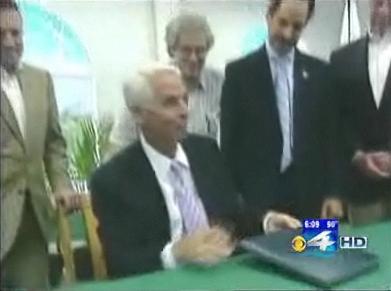 | | GOVERNOR SIGNS OMNIBUS ASSOCIATION BILL |
November 28, 2010 - After eight years of sweating out a dreaded $million plus statutory assessment (2 or 3 times that for larger associations) for retrofitting association hallways and unit foyers with sprinkler heads, the Governor finally signed the recently passed opt-out bill (SB 1196) into law. Although delighted and relieved, since few Galt Mile high rise condo and co-op owners actually read the few paragraphs that house the statute�s flagship sprinkler provision, there is some confusion over how to best use the new law�s tools to protect their rights. If an association doesn�t carefully follow the legislation�s statutory road map, it could inadvertently actualize its unit owners� long-feared assessment for standpipes and sprinkler heads.
The New Law

  The new Sprinkler Retrofit Relief bill did not repeal the existing statute. Unless high-rise association buildings (75 feet or more above grade) provide residents with two egresses to ground level, State law still requires them to be fully retrofitted with sprinklers. The statute previously provided association members with the right to �opt-out� of a full sprinkler retrofit by voting to install an �Engineered Life Safety System� wherein sprinklers are limited to common areas and unit foyers. While less onerous than retrofitting the entire building, this �Engineered Life Safety System� (AKA �Minimum Alternative Life Safety System�) is also a budget buster. This alternative no longer exists. By amending certain provisions in the existing statutes (s. 718.112(2)(l) for condos and s. 719.1055(5) for co-ops, F.S.), the new law simply gives condo and co-op owners the right to vote for opting out of retrofitting sprinklers anywhere on association property, defined as �common elements, association property, or units.� The new Sprinkler Retrofit Relief bill did not repeal the existing statute. Unless high-rise association buildings (75 feet or more above grade) provide residents with two egresses to ground level, State law still requires them to be fully retrofitted with sprinklers. The statute previously provided association members with the right to �opt-out� of a full sprinkler retrofit by voting to install an �Engineered Life Safety System� wherein sprinklers are limited to common areas and unit foyers. While less onerous than retrofitting the entire building, this �Engineered Life Safety System� (AKA �Minimum Alternative Life Safety System�) is also a budget buster. This alternative no longer exists. By amending certain provisions in the existing statutes (s. 718.112(2)(l) for condos and s. 719.1055(5) for co-ops, F.S.), the new law simply gives condo and co-op owners the right to vote for opting out of retrofitting sprinklers anywhere on association property, defined as �common elements, association property, or units.�
 This provides association members with three options. If they do nothing; by 2016 they must apply for a permit to retrofit the entire premises with sprinklers and complete the installation by 2019. Alternatively, they can perform a partial retrofit or none at all. If an association decides to partially retrofit the premises or forgo any retrofit, they must hold a full membership vote to opt-out of the full sprinkler installation. This provides association members with three options. If they do nothing; by 2016 they must apply for a permit to retrofit the entire premises with sprinklers and complete the installation by 2019. Alternatively, they can perform a partial retrofit or none at all. If an association decides to partially retrofit the premises or forgo any retrofit, they must hold a full membership vote to opt-out of the full sprinkler installation.
 The relief legislation has fostered a debate within associations about the timing and methodology for this important vote. The vote can be taken by limited proxy or ballot at a duly called membership meeting or by written consent. Notice of the meeting at which the opt-out vote will be held must be mailed or hand delivered to each owner at least fourteen (14) days before the meeting. To prove that the notice requirement was satisfied, an affidavit must be filed in the association�s official records. The relief legislation has fostered a debate within associations about the timing and methodology for this important vote. The vote can be taken by limited proxy or ballot at a duly called membership meeting or by written consent. Notice of the meeting at which the opt-out vote will be held must be mailed or hand delivered to each owner at least fourteen (14) days before the meeting. To prove that the notice requirement was satisfied, an affidavit must be filed in the association�s official records.
 Once the vote is taken, a certificate attesting to its result must be filed with Broward County, whereupon it becomes effective. Within 30 days of the vote, notice of the outcome must be mailed to all of the owners. Association members who plan to sell or rent their units must provide a copy of the voting results to potential purchasers or tenants. Finally, the association must report the voting results to the Division of Florida Condominiums, Timeshares, and Mobile Homes as part of the annual association information collected by the Division. Once the vote is taken, a certificate attesting to its result must be filed with Broward County, whereupon it becomes effective. Within 30 days of the vote, notice of the outcome must be mailed to all of the owners. Association members who plan to sell or rent their units must provide a copy of the voting results to potential purchasers or tenants. Finally, the association must report the voting results to the Division of Florida Condominiums, Timeshares, and Mobile Homes as part of the annual association information collected by the Division.
Voting Confusion

 To avoid extremely aggravating complications, associations should adequately prepare for this event. To insure that the vote isn�t subject to challenge, the language used on ballots and proxies should be drafted by the association attorney. As a rule, the ballot language must relate to the language used in the statute. Since the statute was drafted in standard �legi-speak�, this has proved to be an unfortunate source of confusion. The statute doesn�t allow the association members to vote for or against a sprinkler retrofit. Instead, it provides that the members vote for or against �opting out� or �forgoing� a sprinkler retrofit. To avoid extremely aggravating complications, associations should adequately prepare for this event. To insure that the vote isn�t subject to challenge, the language used on ballots and proxies should be drafted by the association attorney. As a rule, the ballot language must relate to the language used in the statute. Since the statute was drafted in standard �legi-speak�, this has proved to be an unfortunate source of confusion. The statute doesn�t allow the association members to vote for or against a sprinkler retrofit. Instead, it provides that the members vote for or against �opting out� or �forgoing� a sprinkler retrofit.
  Associations that are unsuccessful in explaining this distinction have encountered some disconcerting dilemmas. When faced by a ballot with the options FOR and AGAINST, association members that oppose the retrofit (and the large assessment) might intuitively check AGAINST. THIS IS A MISTAKE. Since the statute requires that members vote on whether their association should �opt-out� or �forego� the retrofit, by voting AGAINST, the member is actually opposing the opt-out, which could force the association to install the sprinklers. It is critically important to carefully read the ballot language. If you�re not sure, don�t hesitate to contact your association office for clarification. Associations that are unsuccessful in explaining this distinction have encountered some disconcerting dilemmas. When faced by a ballot with the options FOR and AGAINST, association members that oppose the retrofit (and the large assessment) might intuitively check AGAINST. THIS IS A MISTAKE. Since the statute requires that members vote on whether their association should �opt-out� or �forego� the retrofit, by voting AGAINST, the member is actually opposing the opt-out, which could force the association to install the sprinklers. It is critically important to carefully read the ballot language. If you�re not sure, don�t hesitate to contact your association office for clarification.
  Even when associations include voting instructions to help clarify the counter-intuitive nature of this vote, it is sufficiently problematic to include the telephone number of an association member and/or office staffer capable of addressing any member confusion. Since the fiscal health of most associations will be heavily impacted by this vote, these precautions might save the expense and effort of having to reballot members who admit to accidentally voting against their own interests. While there is no limit on the number of opt-out votes that an association may hold, an association that has already opted out may only reverse itself and opt back in (and install the sprinklers) once every three years. The process requires that 10% of the members petition the association for a full membership opt-in vote at a dedicated members meeting. If approved by at least a majority of the members, the opt-in will become effective when filed with the Division. Even when associations include voting instructions to help clarify the counter-intuitive nature of this vote, it is sufficiently problematic to include the telephone number of an association member and/or office staffer capable of addressing any member confusion. Since the fiscal health of most associations will be heavily impacted by this vote, these precautions might save the expense and effort of having to reballot members who admit to accidentally voting against their own interests. While there is no limit on the number of opt-out votes that an association may hold, an association that has already opted out may only reverse itself and opt back in (and install the sprinklers) once every three years. The process requires that 10% of the members petition the association for a full membership opt-in vote at a dedicated members meeting. If approved by at least a majority of the members, the opt-in will become effective when filed with the Division.
Vote Now... OR...

  Before the new law was passed, associations facing the decision between full or partial retrofits deliberately postponed the required vote because voting for either option triggered a deadline to pay a fire safety engineer for drafting a retrofit plan and filing it with the County. Since passage of the new opt-out law, the landscape has changed. Upon learning that their new voting deadline was 2016, many associations placed this issue on the back burner. Several expressed concern about alienating local fire marshals. Over the past eight years, it was uncovered that certain current and former fire marshals have direct financial relationships with sprinkler associations. Some condos and co-ops feared that opting out would elicit retribution from local fire marshals who may have inappropriate ties to these trade organizations and/or their corporate members. While the Fort Lauderdale Fire Marshal�s moral compass appears intact, associations in other jurisdictions have been abused by public servants seemingly more interested in a free trip to Jamaica or a �Holiday� bonus than their constituents� safety or legal rights. Before the new law was passed, associations facing the decision between full or partial retrofits deliberately postponed the required vote because voting for either option triggered a deadline to pay a fire safety engineer for drafting a retrofit plan and filing it with the County. Since passage of the new opt-out law, the landscape has changed. Upon learning that their new voting deadline was 2016, many associations placed this issue on the back burner. Several expressed concern about alienating local fire marshals. Over the past eight years, it was uncovered that certain current and former fire marshals have direct financial relationships with sprinkler associations. Some condos and co-ops feared that opting out would elicit retribution from local fire marshals who may have inappropriate ties to these trade organizations and/or their corporate members. While the Fort Lauderdale Fire Marshal�s moral compass appears intact, associations in other jurisdictions have been abused by public servants seemingly more interested in a free trip to Jamaica or a �Holiday� bonus than their constituents� safety or legal rights.
 | | DONNA BERGER |
 At the November 1st Galt Mile Presidents Council meeting, Executive Director Donna Berger of the Community Advocacy Network (CAN) � a well-known association attorney who was instrumental in passing the relief bill � warned of a far more dangerous potential threat. After years of recommending that associations postpone any action, the new law prompted Berger to reverse herself. Since every association�s voting results are filed with the County and the State, Sprinkler Association lobbyists will have access to this data. If too many condo and co-op associations drag their feet in scheduling this vote, these lobbyists plan to use the tentative response to convince lawmakers at the 2011 legislative session that most condo owners actually want to fund their huge payday. At the November 1st Galt Mile Presidents Council meeting, Executive Director Donna Berger of the Community Advocacy Network (CAN) � a well-known association attorney who was instrumental in passing the relief bill � warned of a far more dangerous potential threat. After years of recommending that associations postpone any action, the new law prompted Berger to reverse herself. Since every association�s voting results are filed with the County and the State, Sprinkler Association lobbyists will have access to this data. If too many condo and co-op associations drag their feet in scheduling this vote, these lobbyists plan to use the tentative response to convince lawmakers at the 2011 legislative session that most condo owners actually want to fund their huge payday.
  Unwilling to leave $billions in projected revenues on the table, the deep-pocketed Sprinkler Associations, whose membership includes corporate juggernauts Tyco and Allied Signal-Honeywell, successfully kept their $multi-billion self-styled stimulus package alive for eight years and convinced two Governors to veto relief bills that were overwhelmingly passed by the legislature. Make no mistake; they know how to play political hardball. Unwilling to leave $billions in projected revenues on the table, the deep-pocketed Sprinkler Associations, whose membership includes corporate juggernauts Tyco and Allied Signal-Honeywell, successfully kept their $multi-billion self-styled stimulus package alive for eight years and convinced two Governors to veto relief bills that were overwhelmingly passed by the legislature. Make no mistake; they know how to play political hardball.
 | | SEN. BOGDANOFF |
 | | CFO ATWATER |
These highly motivated special interests are also keenly aware of significant changes to the Florida Legislature�s political landscape. Former Statehouse legislative gatekeeper (and relief bill sponsor) Ellyn Bogdanoff is now a first-term District 25 Florida Senator and former Senate President (and relief bill supporter) Jeffrey Atwater is now the Florida CFO (Chief Financial Officer) and State Fire Marshal. These two staunch proponents of the relief bill no longer occupy the key legislative leadership positions that helped insure the bill�s success. Additionally, now that every major race has been decided, constituent concerns will temporarily lose some traction in Tallahassee. You do the math.
  It�s time for associations to schedule their opt-out votes. By registering our intentions prior to the legislative session, we can join with thousands of other Florida common interest communities and deter any attempts to revive this expensive burden. When the original sprinkler statute was passed in 2002, condo and co-op associations first learned about it from fire marshals hired by the Sprinkler Associations to �help facilitate� the $million plus sprinkler installations. If we fall asleep at the wheel and hand these high-powered lobbyists the leverage they need on a silver platter, when the 2011 legislative session closes in June, history could repeat itself. Happy Holidays! It�s time for associations to schedule their opt-out votes. By registering our intentions prior to the legislative session, we can join with thousands of other Florida common interest communities and deter any attempts to revive this expensive burden. When the original sprinkler statute was passed in 2002, condo and co-op associations first learned about it from fire marshals hired by the Sprinkler Associations to �help facilitate� the $million plus sprinkler installations. If we fall asleep at the wheel and hand these high-powered lobbyists the leverage they need on a silver platter, when the 2011 legislative session closes in June, history could repeat itself. Happy Holidays!

Click To Top of Page
To GMCA HOME
To ISSUES INDEX
To SHORE PROTECTION PAGE
To EMERGENCY ROOM PAGE
To CITY OF FORT LAUDERDALE PAGE
To FORT LAUDERDALE BUDGET CRISIS PAGE
To BROWARD COUNTY PAGE
To BROWARD COUNTY PROPERTY APPRAISER PAGE
To TALLAHASSEE POLITICS PAGE
To AUTOMATED EXTERNAL DEFIBRILLATOR PAGE
To CALYPSO GASWORKS PAGE
To 32nd STREET ALLEY PAGE
To FLPD CRIME STATISTICS
To MAIN PAGE
To GOVERNANCE
To REPORT CARD
To LAWS & STATUTES
To GOVERNMENT LINKS
Click To Top of Page
|
|